#i would rather dive into the characters' thoughts and feelings and analyze their actions and reactions to the other characters near them
Note
I usually don’t share my specific thoughts about bnha but I need to get this thought out there so sorry if this is weird but….
Personally I think the thing most people forget about Shigaraki is that before anything, before afo before killing people Shigaraki was “taught” (abused into thinking) that every time he did something his father viewed as ‘heroic’ he was/would be punished for it cause it would be hurting the ones around him (it would affect his family). Of course this is the worst thing to be taught when you are 5 years old .
But this continued until his family was dead and then he met afo. Afo basically convinced this 5 year old child who was not in a position to tell him (afo) he was wrong and still had the idea of good thing = bad things going to happen, that heroism is bad and that as long as you are mad at the person you’re killing it’s fine (obviously not true but when you are 5 I don’t really think you would actually understand that it was wrong)
And then this way of thinking continued basically for like 15 years..
In simpler terms, afo seemed to convince him that, good thing/good deed = bad things going to happen/ no real benefit and, bad thing/bad deed = bad thing going to happen however you got treated badly therefore it’s ok if you do bad things too
the thing everyone’s needs to understand in my opinion is that people who talk about why villains think this/ that or people who just like the villains of the show, are not justifying that fact that they killed people but merely just explaining their thoughts/opinion of the matter and trying to get you to understand that when you are abused or/and manipulated it changes the way you think (not everyone can dramatically change their life the second they are not next to their abuser anymore)
((And in the end this show is. not. real! The villains did not kill a bunch of real innocent people, some people don’t seem to get that anymore and act as if that’s what happens…))
Sorry if there’s any mistakes in this, I kinda have trouble putting my thoughts into words that others understand heh. . . .
In response to this...
I mean, yes, I agree with everything here.
The reason I didn't dive into all of this is because, and I mean this in....some type of way...actually idk. There's no nice way to say this really.
Anybody who is just stuck on "They did bad things, they're evil because of this and they should die" is not worth arguing/debating/discussing things with for me personally.
I'm serious--I do not have the patience to explain the obvious to people who just don't care about these aspects of the villains. It's too tiring, and ultimately pointless because--they don't care.
If the conclusion someone has come to is "They killed people and they're bad and a sad backstory isn't an excuse and that's that", then I mean, I have nothing to say to counter.
Imo, everything you pointed out is very obvious, so anybody ignoring its importance is doing it intentionally and probably has no intention of changing their minds.
People write essays on tumblr about redeeming characters who do horrible things, why it's done in fiction, how it's done, how to tell when a character is set up for a redemption arc early on, but it doesn't matter. If someone doesn't want to accept a redemption arc in a character, there is nothing to be done.
I really do not mean to sound pretentious or anything....but honestly I don't have the energy or patience to explain old arguments that have been beaten into the ground and things that are just painfully obvious and shouldn't even have to be said (namely that none of these people are real and nobody has killed anybody--like I'm not gonna write an argumentative meta on that).
So yes I agree with everything you've said here, but I tend to intentionally leave these points out because if someone is still held up on the points you've made, I really don't have the patience to discuss with them.
#iiii am really sorry i hope this isn't rude#i'm serious though like#i would rather dive into the characters' thoughts and feelings and analyze their actions and reactions to the other characters near them#not try to convince people why these fictional people should be saved/redeemed#especially when their main argument is 'villain bad'#i just can't#bnha asks#shigaraki tomura#shimura tenko#but good points made in the ask itself#yes
18 notes
·
View notes
Note
can u also give us fic recs? i wanna read your fic but it's long hdhwhsjs
wanna be in the right mindset
so do u have any?
Here are some fics that I really liked because I thought they were interesting. I loved the way the characters are written, most of them are Kai centered, angst (check the tags for any triggers) and short. Also these are some we used as reference for the characterization of the ninja in Eclipse.
(idk how many recs you wanted so I put a lot)
They turn the light on and it's burning up the sky by Sugarglider_s : very short and poetic Kai analisis angst fic. Absolutely love the way it's written and the interpretation of Kai's character.
Hello my old heart by Bemmiecake : this is a long unfinished fic centered around Kai in the timeskip between seasons 3 and 4. I had to add it because it is definitely one of my favourites, this fic has made me emotional multiple times. It's heartbreaking how Kai has to go through his awful coping mechanisms as the Red Shogun and how he ends up finding a sliver of hope in the process. It also features a well built oc!
What gets out comes around by fruitcasket : this one is Cole centric but explores some contradictions of his character mostly with his relationship with Kai, how despite being a kind soul he acts as a bully towards him quite often.
Too familiar by Maplebreeze : Oneshot about Kai realizing him and Lloyd had similar experiences. Basically RG brothers fluff with some hurt.
Alike, alone by fruitcasket : Morro possesses Kai fic but it’s focused on Kai and Morro’s interactions and similarities rather than actions. It does some character analisis and dives into their mentality.
All of the work, none of the money by ADHDplusCartonnmakesCHAOS : Fic about the ninja learning about Kai and Nya’s childhood. There are many fics exploring this theme but this one is my favourite so far, talking about the subtler things like how costly pads are when you're already short on money to eat.
Fight by Maplebreeze : It describes perfectly how Kai would lose himself to violence (as one of his awful coping mechanisms) again and again and again, to distract his heart from all of those close to him he couldn't save (up until Possessed)
Guilt by Cherry_dynamite : On this fic we finally get closure with Lloyd addressing the fact that he did not see Kai's survival guilt back in the slither pit.
Boiling Point by Salty_Pickle_Bones : It is about Kai and the team being wrecked by Nya's death. It shows just how lost Kai has become, how he's going down the alcoholic rabbit hole again.
Off the deep end by Kiss_The_Cook : Set in the first season when Lloyd is a kid living with the ninja. Kai refuses to get close to Lloyd, despite Lloyd admiring him, because he knows he and Lloyd will get attached to each other and Kai thinks it would be very bad for the kid to do so. Brothers fluff (and some angst), I love how Kai’s mentality is portrayed and of course little Lloyd.
Aftermath by Sugarglider_s : Fluff opposite oneshot. Not really related to the rest but I love it and made a comic about it -> link here.
Feel free to recommend any other fic you like. We are especially interested in those that analyze the characterization of the ninja in depth, more specifically any other character besides Kai (pls let us know, especially ones about Jay, we’re struggling with writing him).
Side note: I know there aren’t many Kai and Nya fics so recommend ones focused on them too pls.
130 notes
·
View notes
Text
Pomefiore Endnote - Perfectionism, Apathy and the True Tragedy of Book 5
Warning: Long post and pic heavy.
So…this is something of a continuation of my last twst reaction post, where I analyzed the Absolutely Beautiful dance video. I ended the post by saying that the true tragedy was not that NRC Tribe lost but that Vil could be convinced he was an inferior performer compared to Neige. Now I’m going to expand on that…in excruciating detail. XD
In all seriousness, though, I'm not really sure if I'd call this an analysis in the traditional sense. Maybe more like a long-winded rant based on canon observations. But all the same, I’ve been grappling with this for the last year and a half since when Book 6 first dropped in EN. I’ve wanted to share my thoughts for a long time but decided against it because I acknowledge how contentious this topic is in the fandom and I prefer to keep my online space as drama-free as possible. I also didn’t want anyone to get the idea I’m attacking others when at most, I’m just being critical.
But with the new story update imminent and it looking like it will be Pomefiore-centric, I’ve come to the realization that if I don’t share this soon, I never will. My timing is admittedly ass but I think it would be worse if I share this AFTER the update and you’re about to understand why.
So before we dive in, disclaimer. This is going to cover the end of Book 5 and the first few chapters of Book 6 and my in-depth opinions on both. There will be mentions of trauma/mental illness and some very blunt (but honest) Rook criticism. But please keep in mind, that while I have my own interpretation of the twst characters and their respective arcs, I am not Yana and ultimately, my opinions are just that. Opinions. Everything I say is subjective at best but a lot of what’s coming up is based on a blend of canon observations as well as my own specific, personal experiences as someone with very similar life experiences as Vil and has been dancing for most of her life.
Still, these are just opinions and I have no intention to offend anyone. But if you don’t like reading negative things about Rook or take issue with this general way of thinking, I HIGHLY advise you to ignore this and respectfully (or quietly) agree that we disagree.
When I wrote the greater bulk of this, it was around when Book 6 dropped in EN. A year has passed since then and I’ve had time to think more about my opinions here and, to a greater extent, how I feel about Book 5. This may sound strange but I feel that Book 5 is both the best and worst part of twst’s main story to date. I really like how it touched upon something that isn’t really isn’t talked about much; how we as a society both admire beauty but also vilify it. Vil’s primary dilemma is how he is wrongfully villainized for his beauty, wealth, and harsh personality, despite subverting expectations of cruelty at every turn. Ironically, when the fandom mischaracterizes him as vain, cruel, classist, racist and the like, they are falling into that same literary trap. Proving the point of his arc.
And as much as I hated the ending from an emotional point of view, I actually love it as well, ironically for reasons that might not have been intentional. What I hated, mostly, was the fandom’s response. There was a great opportunity here for some deep discussion regarding society’s views on beauty, how constant trauma causes us to internalize false perceptions of ourselves, and the rather fascinating/dangerous dynamic Vil has with his vice dorm leader. Instead, any interesting discourse has been lost in all the misinterpretations of Vil. To the point I wonder if we all actually read the same story. I’m disappointed in the fandom, but somehow not surprised either.
But regardless, Rook’s actions were extremely disquieting but not for the reasons you might think. There was nothing wrong with his decision but the way he went about it and how he (and Vil) tried to justify it really left such a nasty taste in my mouth and I gotta talk about it to get it out.
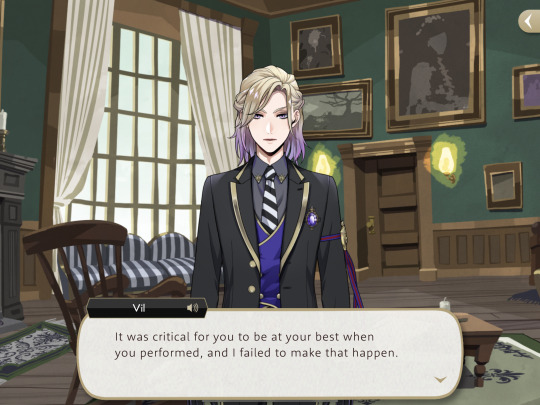
First I just want to commend Vil for his level of maturity and rationality regarding his overblot. Even when it was happening, not once has he tried to justify his actions and in fact it was his own guilt at his potential wrongdoing that ultimately caused it. His fear that in a brief, desperate attempt to be seen as not a monster, he became exactly that. Throughout Book 5, it is implied that Vil already sees himself as a villainous person and internalizes that image of himself almost with pride. But despite this false perception, his actions have always proven the opposite and it’s clear that Vil has always valued being altruistic, determined and just. And his guilt when he failed to meet his own standards was beyond compare.
I feel that this guilt sets Vil apart from the other overblots thus far. Most importantly, he apologized of his own volition and wasn’t forced to. That alone makes him stand out among the overblot characters and, to my mind, makes him the most compelling of them all. If I’m being completely honest, out of all those who have overblotted thus far, Vil has been the LEAST problematic even before his overblot. And the one instance where Vil displayed any “cruelty” beforehand is EXTREMELY subjective. (his treatment of Epel) But the fact that Vil has been the least problematic overblot student so far also makes him the most tragic. And makes what’s about to happen next all the more disturbing.
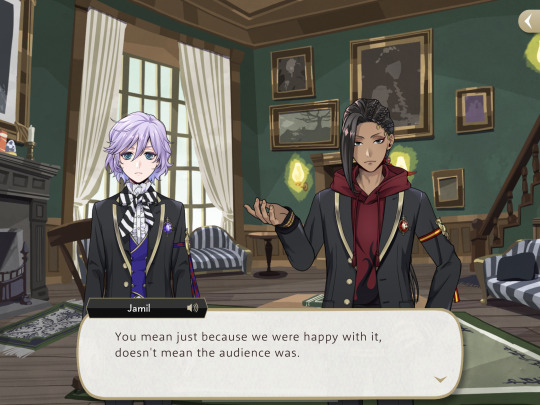
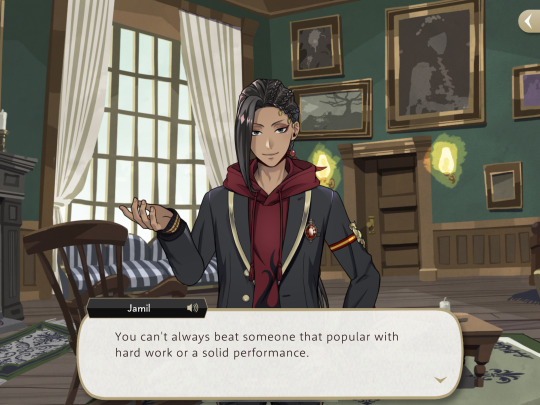
Interestingly enough, Jamil is correct about this but for the wrong reason and here comes the first point. There was no indication that the audience was anything but enthralled with NRC Tribe. And if Vil or any of the others made significant mistakes, because of Vil’s fame, I’m certain they would have been pointed out by magicam netizens. With the recent release of the Absolutely Beautiful mv over on twst jp, we now also have a visual to go off from.
I talk about this more in a previous post but basically, yes, NRC Tribe’s performance wasn’t perfect, but based on what I saw, I would have expected A LOT worse considering the circumstances. The fact is all evidence points to the NRC boys giving a wonderful performance made all the more remarkable by the fact they were still able to perform after dealing with Vil’s OB not too long before. And the audience clearly thought so too if they were only one vote away from victory.
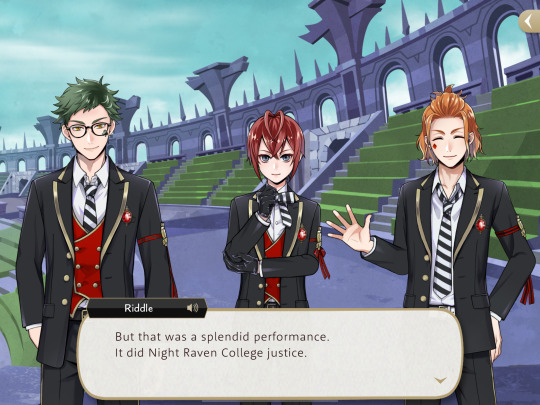
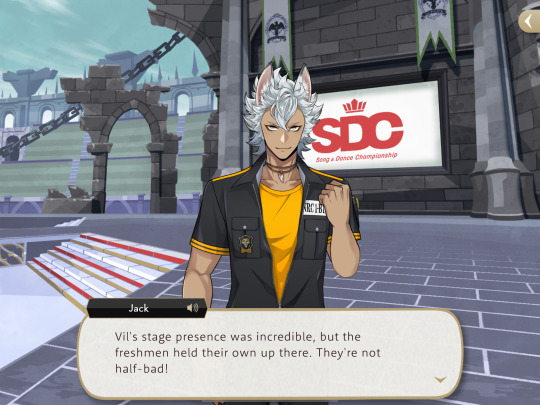
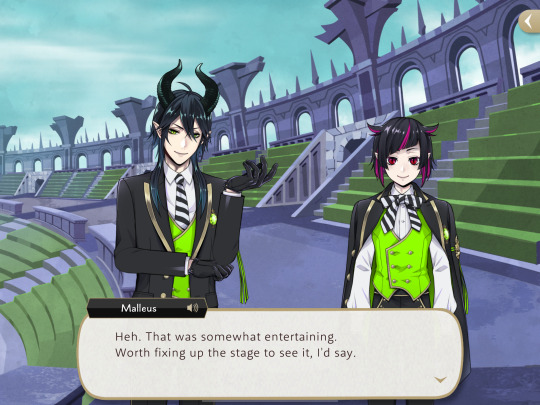
To add to this point, when the other characters comment on the NRC Tribe’s performance, they make no mention of any noticeable errors. And when Crowley laments their defeat later, again, there’s no mention of any errors. Considering that Ambrose was pretty pretentious about RSA winning, I'm sure he’d mention that, too.
Even further, one thing you learn from being on stage is that your audience rarely notices mistakes unless they are extremely obvious. You, as the performer, might notice, but you quickly learn not to draw attention to your errors and keep it moving. Now of course, the NRC characters could be biased because they want to defeat RSA. But considering the nature of a lot of them, I doubt they would lie so flagrantly. Especially Jack who is pretty no-nonsense even with the people he likes. And Malleus who seems pretty difficult to impress. So if their commentaries are to be believed, this shows that any errors made by the NRC Tribe were not noticeable.
That Vil would think otherwise speaks to something far deeper and far more insidious. Stick a pin in that; we’ll come back to it soon enough.
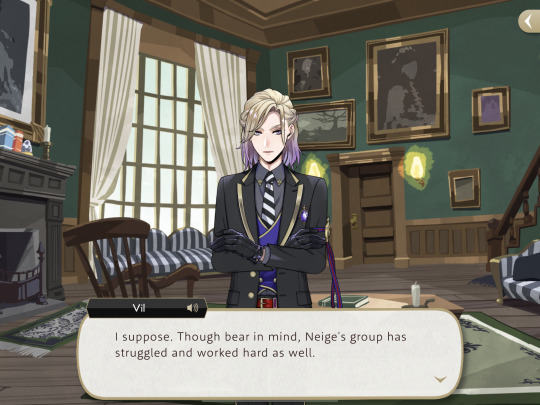
Vil then goes on to explain to the boys that Neige and his friends worked just as hard and had their own struggles. That Neige grew up in an improvised environment and had to juggle acting obligations with household chores and helping out the dwarves. Again, it is extremely commendable that Vil is able to acknowledge this about this rival. It shows that his contempt for Neige was never as simple as “boo hoo people think he’s more beautiful than me” and he at least respects Neige’s efforts even if this explanation once again falls flat.
Firstly, narratively speaking it doesn’t make sense that Vil is just finding out about Neige’s backstory now (likely from Rook) because I feel like he should already be aware. In fact, all through Book 5, I thought that he did know but didn’t care. Honestly, Neige’s backstory shouldn’t matter to Vil anyway and surprisingly, it’s Ace of all people who explains why.
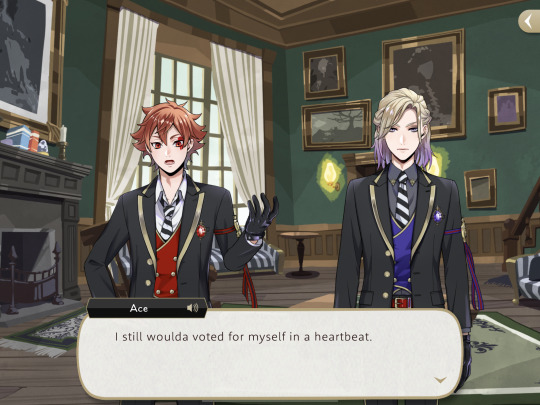
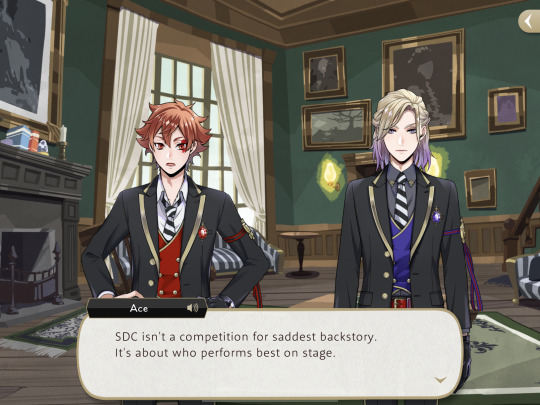
Neige’s struggles might matter to his fans but at the end of the day if Neige cannot perform better than Vil, then that’s his own fault. There are many artists out there who have to deal with similar struggles but come out as phenomenal performers and yet Neige’s “best” basically consists of the twst equivalent of this meme. Precious, but cannot compare to all the sweat and tears Vil and his team were put through.
There’s actually an interesting analysis floating around this hellsite about how Neige’s childish performance was actually an incredibly manipulative tactic and could have been intentional if he were a different character. I’m not gonna link it cause I don’t want to bring any heat to the op. But I will say that while I don’t think Neige intended to manipulate the audience with his cuteness, in the end, it did indeed work in his favor. And the fact that Vil thought to train Epel to weaponize his cuteness to defeat Neige indicates that he’s already no stranger to seeing such underhanded tactics in the industry he works in. In his beansday vignette, Vil mentions an actor he initially admired destroying one of his stage outfits. If Neige weren’t presented as so naive and twisted from a traditionally “good” character, his choice regarding his performance could be regarded as deliberate. Which is why Vil lamented that he and his team had been “outplayed”.
Back on topic, what I took away from this was that, once again, Vil’s hard work and determination count for nothing because of things he cannot control. Because he was born to wealth, because he didn’t have the same hardships, he doesn’t deserve the same consideration or sympathy as Neige. And his wealth and beauty once again put him in the position of villain to Neige’s hero. It’s a textbook case very common in media, like Sharpay opposing Gabriella in High School Musical. But what’s worse is that from all that we’ve seen of Vil, he could coast on his wealth, beauty and father's fame if he wanted to.
Instead, he chooses to work hard and have his accomplishments come from his own merit. When anyone else in his situation could easily choose the opposite. And just from a personal standpoint, if I practiced day and night for a dance competition and ended up losing to someone under my level simply because they were cute and disenfranchised, I would feel extremely insulted. At the end of the day, Ace is correct and whatever struggles Neige and his team had, they were still inferior performers.
And to add to this point, I believe that at some point Vil KNEW this even AFTER his OB. Despite his earlier anguish at never being able to perform innocent cuteness like his rival, once his mind was clearer, he was able to see that NRC Tribe’s performance was still technically better. He was able to see how the audience responded to Neige and still believed in himself as a better performer. I say this based on another scene earlier in book 5.
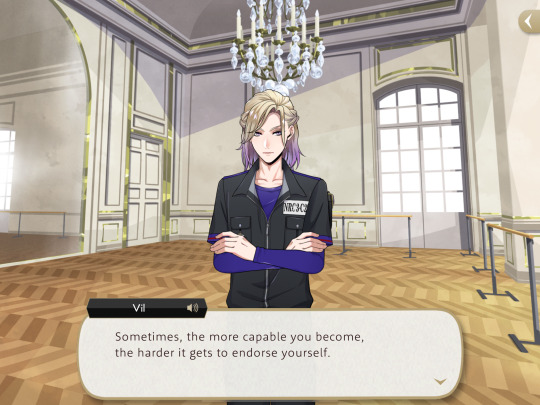
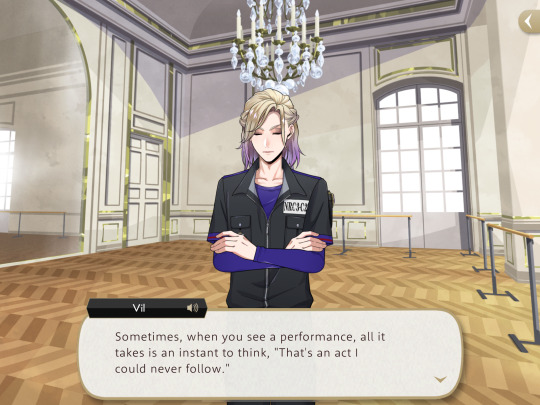
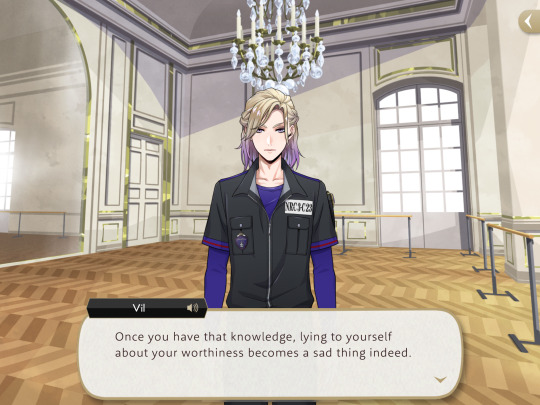
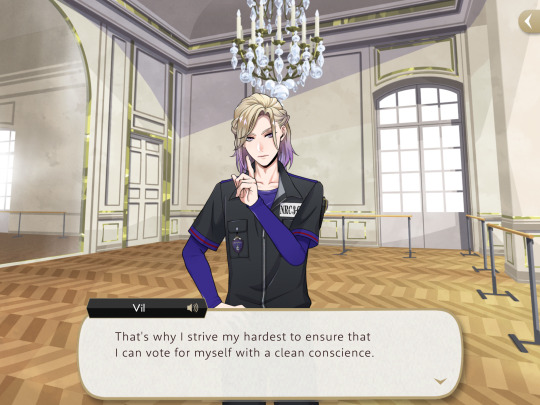
Vil was undoubtedly in a very emotionally vulnerable place right after his overblot. He went to great lengths to conceal the aftereffects before going on stage to the point he collapsed as soon as he was alone. After going so long trying to hide them, his darkest, ugliest emotions were laid bare to his teammates and to himself. Manifesting in the worst way possible. And as a professional performer, if any errors were made, he would have been painfully aware of them.
And yet, despite having just dealt with the darkest moment of his life, Vil was still able to stand upon the stage until the very end and give the best performance he could. Against all odds, before a world that has wrongfully perceived him as evil and hideous for most of his life.
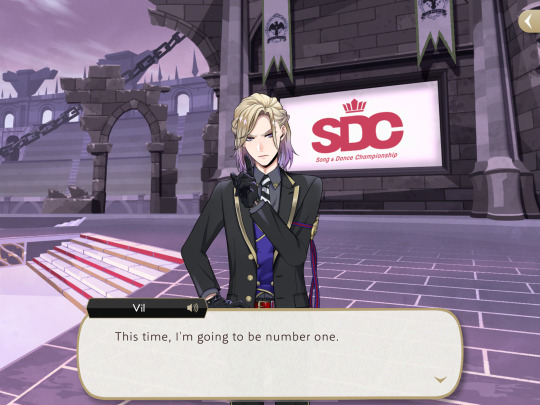
And despite knowing that Neige possesses all that he never can, it is strongly implied that Vil still chooses to vote for his own team. Meaning he saw the appeal in Neige’s performance and STILL knew that he did better. And I’d like to believe that even if Vil was aware of Neige’s backstory, he would have still made the same decision. It’s easy to be beautiful when everything is right and perfect in your world. But being able to smile even when you’re struggling and your heart is breaking is even more beautiful still.
Sadly, Vil isn’t likely to realize this anytime soon and will continue to see his own mental struggles as not as valid or “ugly.” Now back to that original pin of thought, Vil will likely continue to believe that he didn’t deserve to win the VDC despite all evidence to the contrary. He’s likely to continue internalizing the false villainous image of himself as well. And for that we now must get to the crux of this matter.
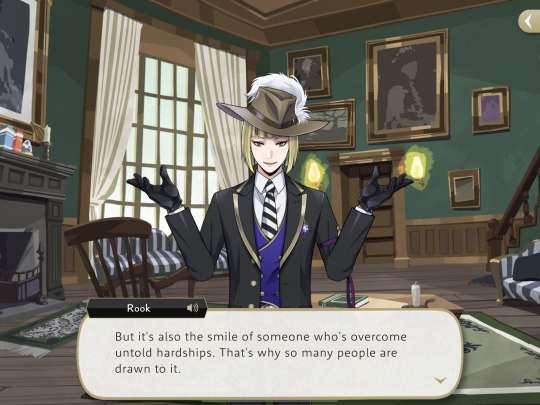
At first glance, this statement doesn’t seem like much but when you look deeper, and look back at some of Rook’s own actions, this comes off as incredibly hypocritical and cruel. As we have seen from Vil’s backstory, he has dealt with untold hardships as well. But Vil’s anguish is more internalized than Neige’s and it’s very unlikely that he has ever really been open about how dehumanizing and hurtful his treatment has been.
And from an outsider’s perspective, his problems aren’t as dire anyway. It’s just like Vil said, his life has been quite different from Neige’s. But mental trauma doesn’t know demographics and can affect anyone. The fact is what Vil has gone through is extremely traumatizing and comes from nothing beyond people wrongfully vilifying him for his beauty. Projecting their insecurities onto him from a very young age. It’s clear that what Vil has dealt with has fundamentally altered how he sees himself.
But at the same time, what do you think would happen if Vil WAS more open about his frustrations? The dehumanizing effect and the bullying? The typecasting and prejudice thrown his way? And the feeling that nothing he does will ever be enough to break free from his villainous mold? What would happen if Vil were to be open about ANY of that? He would be mocked and shamed and perceived as shallow, petty and crying about nothing. Lowkey how many in the fandom already see Vil anyway. We as a society sadly don’t take mental illness as seriously as we should but when celebrities deal with it? It quickly becomes meme fodder and nowhere is this more obvious than on stan twitter. We are all guilty of feeding into it, whether we’re honest about it or not.
Ironically, Vil’s mental struggles is one of the things that would make him more “relatable.” But the truth is that people would never accept that because society has a long history of trivializing the mental issues of celebrities because they seem so far removed from normal people. And then being surprised pikachu faced when they do something drastic to themselves. So Vil internalizes all of it because he knows he can’t be open about it.
A person like him simply can’t be open about his hardships but HERE is the kicker: neither can Neige. He also has an image of perfection to uphold so it is likely he is also internalizing mental struggles of his own. Living and caring for seven others can’t be easy in addition to trying to grow his career. And if his deeper origins are anything like his Disney counterpart, how he came to live with the dwarves must have been traumatic as well.
But here’s the difference: from Rook’s perspective, he is “better” at internalizing those ugly emotions than Vil is. After all, Neige is able to overcome all his struggles and still smile and not give hints to them, but when Vil finally buckled under all of his own trauma, we see what happened.
There’s also the fact that since Rook and Neige attend different schools, Rook doesn’t have as close a seat to any of Neige’s more personal troubles. So it’s likely easier for Rook to project his own ideas of beauty onto Neige because from his perspective, he is perfect. He is beautiful. He is pure. Like the legendary singing princess Rook so reveres. He isn’t plagued with any of the ugly emotions that caused Vil to overblot. And if Neige DOES have ugly feelings or ugly trauma responses, Rook isn’t privy to them, so they clearly must not exist.
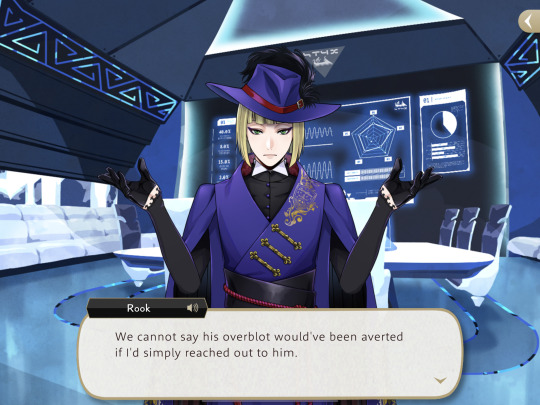
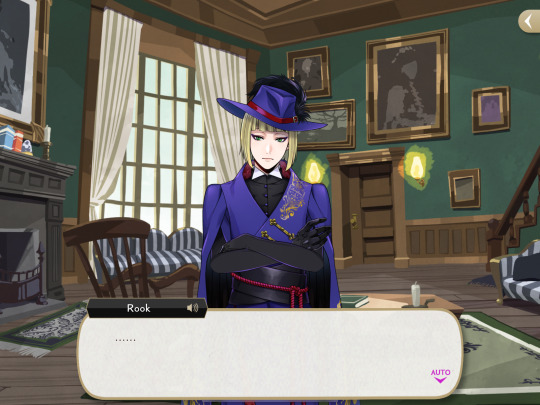
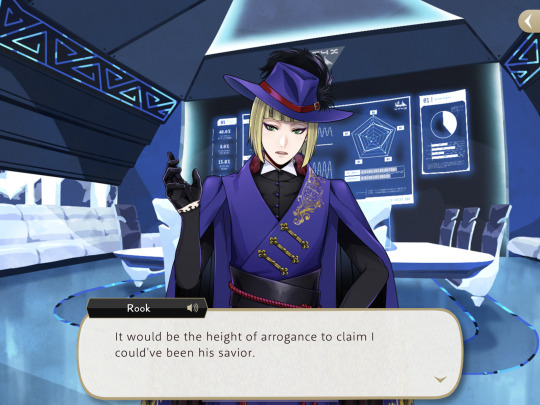
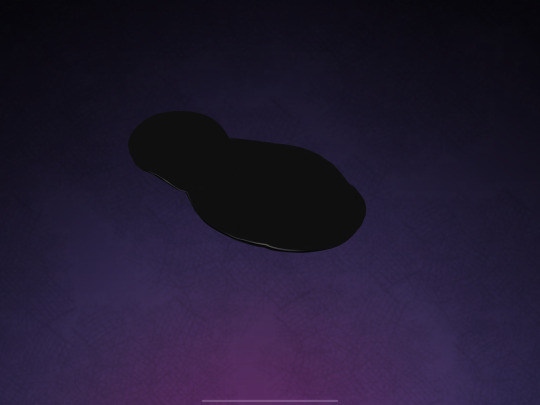
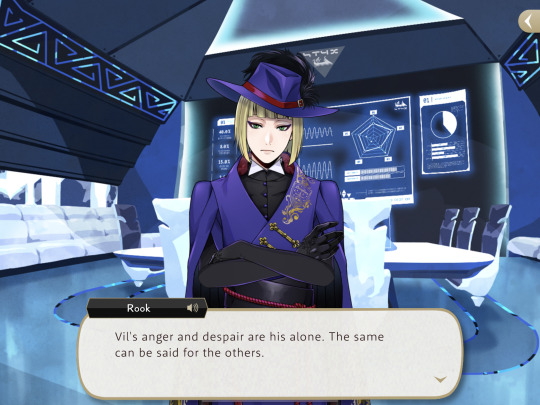
I genuinely believe that THIS is what Rook meant when he stated Vil’s performance wasn’t as beautiful as Neige’s. I know he mentions another reason at the end of book 5 but in my mind, they are both one and the same. Whatever technical difficulties NRC Tribe had, they were still polished enough to garner enough votes that it was only Rook’s flawed ideology that sealed their fate. And throughout book 5, Rook is hinted at being aware of Vil’s internal struggles and yet still chose to stay silent. He frequently saw that Vil was struggling but tried to justify his silence by saying it wasn’t his place to interfere.
But that is also untrue because we’ve seen time and again Rook is more than willing to stick his nose in Vil’s businesses. His labwear vignette is the most obvious example but there are plenty of others. In Book 6 Rook admits that his decision to go to the Isle of Woe was fully a selfish one. Leaving Pomefiore without leadership and potentially falling into chaos (the only dorm to have no clear leadership at all during the crisis) simply because he wanted to give Vil skin products that he really didn’t need. A few days without them wouldn’t do that much harm and Rook essentially placed Epel, Yuu and himself in great danger for a reason far more shallow than anything Vil has done in the name of beauty.
He also admits that he would have been willing to drink the poisoned juice Vil gave to Neige for again, a pretty shallow (and extremely twisted) reason. If he’s willing to do that, he is more than capable of intervening in other matters on Vil’s behalf. And later in book 6, it’s revealed that Rook was originally a Savannaclaw student but made the very unprecedented decision to transfer to Pomefiore in part due to his fascination with Vil and desire to further study beauty under him. So Rook had EVERY opportunity to step in regarding his overblot. Even if Rook couldn’t be his “savior”, the fact that Vil would see that he at least had support could have gone a long way.
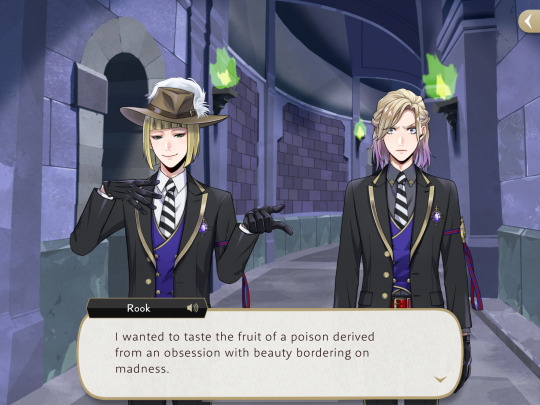
But Rook’s silence is rather in keeping with his character and his own ideas about beauty. I find this quote very ironic based on how he and Vil are frequently misconstrued. The Pomefiore dorm leaders' views on beauty appear to be the opposite of each other.
Vil can be extremely strict, harsh and can come off as critical at times, but he is never harder on someone than he is himself. He has shown time and again that he sees beautiful potential in anyone. And Vil is more than willing to share the spotlight with his NRC Tribe; build them up from scratch and give each of them the chance to show off their potential. Likely because he knows all too well what it means to be in the shadow of someone else.
Even further, when we look at the dichotomy of a villain versus a hero, the main difference is how they respond to their personal pain. A villain takes their pain and says “the world hurt me so I’m gonna hurt the world”. While a hero says “the world hurt me and I’m not going to let it hurt others”. Up until his overblot, Vil has been the latter of these examples. He wants the best for those around them and while his methods might be difficult to understand, they always bear results. Vil can honestly see beauty in anything, even if he has to coax it out in his own way.
Rook’s views on beauty however, all seem to be based upon the superficial and the evidence can be found in his Halloween vignette. There, he explains further how he grew to adore Neige and based on what he said, it sounded more like obsession than actual reverence. There’s also hints to this in his most recent birthday vignette as well. His ideas seem to be very fantastical, far removed from reality and so obsessive to the point that it actually affects his ability to be a good person. Such an obsession can sometimes make people oblivious to the world and in Rook’s case, often cause him to act out in ways that border on problematic.
In his fixation, he stalks Leona and Jade, says some weirdly otherist shit to Malleus, harasses and assaults Ruggie, and places ridiculously high standards on both Vil AND Neige that rob them of their humanity. Rook saw firsthand how deeply Vil’s insecurities ran. He heard Vil cry and scream out how ugly he felt. He saw Vil’s anguish and despair firsthand and seeing all that, still chose to punish him because Vil’s lack of confidence made him unable to respond to his trauma in a beautiful way. Or at least in a way he could deem as beautiful based on his vapid description of the word.
Rook will likely never be privy to any ugliness Neige has displayed so for him, the fantasy remains intact. And in chasing that fantasy, he betrays not just Vil, but his other teammates as well. Then has the audacity to try to justify it with bullshit ideology and sadly, because of Vil’s low opinion of himself, Rook succeeds. Vil holds Rook’s opinion so highly that he is able to take advantage of that and compel him (and the others) to see his point of view. And believe it or not, in chasing that fantasy, the NRC Tribe members were not the only ones Rook hurt.
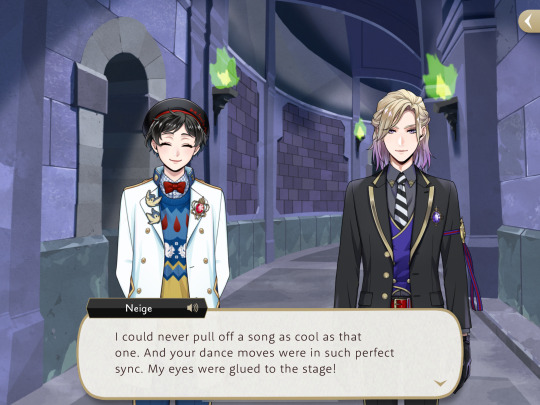
Neige might have been happy to have won but he was essentially rewarded for an inferior performance and robbed of an important lesson. One far more valuable than any “lesson” Vil had to learn. As mentioned before, even with all of his hardships, if what we saw in book 5 was the best Neige could do, that still means he is not as good a performer as Vil. If cuteness, nostalgia and warm fuzzy feels are the only thing Neige can offer, he could easily find himself struggling to remain in the entertainment industry as he ages. Not unlike many other former child stars in real life.
Losing the VDC could have been a major wake-up call to Neige that if he wants to continue acting, he has to do better. People might not take him seriously when he’s still doing the cutesy bullshit ten years from now. But because he won, this will likely never cross his mind. Neige will learn nothing.
Now before anyone begins writing up their comments about how Vil verbally stated that Rook was right, I’d like to bring up one final point: Vil agreeing with Rook was another trauma response. Internalizing Rook’s response because it is so in keeping with all he has been made to believe about himself, about Neige, and how it has all now been “confirmed” by his overblot. From his point of view, Rook has no reason to lie to him.
But just because Vil states that Rook was correct, does not mean that it’s true. Despite being one of the more positive characters in the game and being twisted from a “good” character, Rook is just as morally grey as everyone else in the twst cast and just as capable of dubiousness. And this would not be the first time something like this has occurred between Vil and Rook. Once again, I bring up Vil’s labwear vignette. Particularly this exchange here:
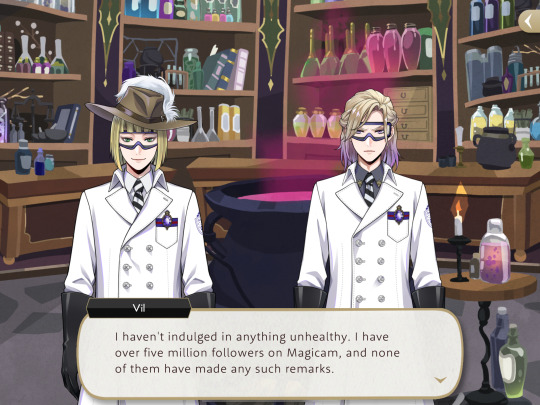
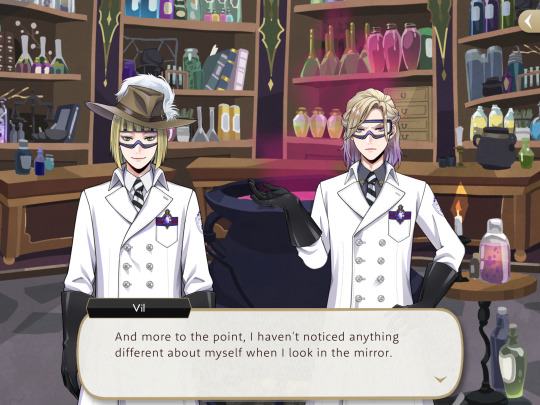
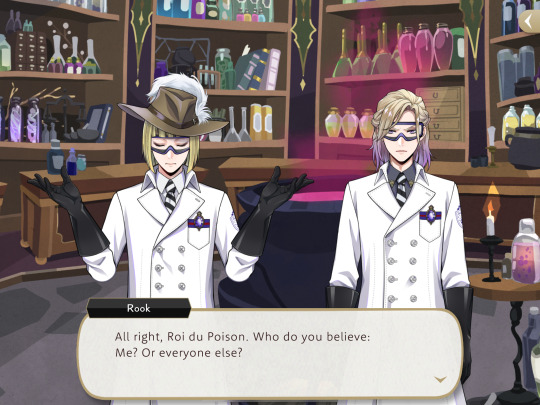
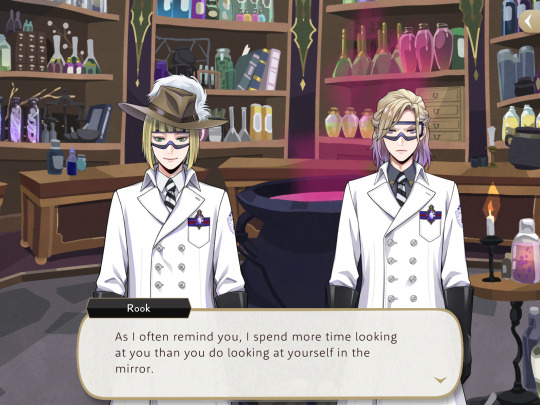
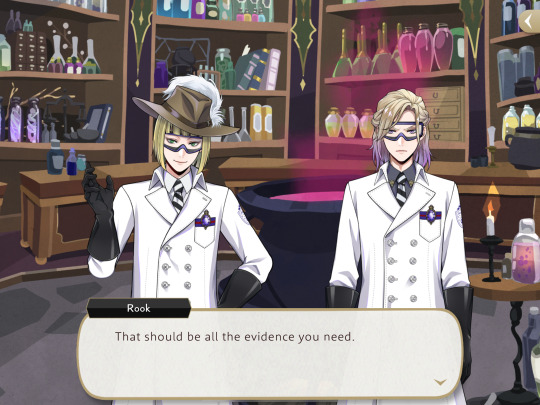
Okay, so beyond the general tactlessness of telling Vil he’s gaining weight in spite of knowing how such a statement would affect him, what Rook is basically suggesting to him is that he cannot trust anyone but him. Not even his own senses. That for all of his perceptiveness, Vil is incapable of seeing himself accurately. Though he initially does not believe it, Vil eventually does accept Rook’s statement despite knowing it was bullshit twenty seconds before.
Later on, Vil mentions to Trey that Rook’s only crime is being too blunt and perceptive. It’s true that having another point of view is important at times, but the level of trust Vil has in Rook’s opinion can also be dangerous if he can convince Vil to doubt himself so easily. Theirs is an interesting dynamic but it also has potential to be extremely toxic and detrimental to Vil. At best, Rook gives him useful insight and pushes him to be the best he can be. But at worst, Rook contributes to Vil’s insecurities, enables his more toxic tendencies and his fawning of Neige feeds into his obsession to be the fairest one of all in the worst way possible. Rook can’t be completely oblivious to this. It would be such an easy thing for him to take advantage of Vil’s doubt in himself and value/dependency on his opinion.
Which is exactly what Rook does. As much flack Vil gets in this fandom for being critical and harsh to others, he never criticizes someone harder than he will criticize himself. This is a person who has grown up in the spotlight and has had to maintain an image of perfection for most of his life. A person who gave up one of his favorite condiments because of the damage it caused to his skin. A person who has so deeply internalized the villainous image people have projected on him that he wears it almost as a badge of honor. And because he holds himself to such a high standard and already internalizes a lot of toxic beliefs about himself, it makes perfect sense that Vil would agree with Rook. In his current way of thinking, Vil has no reason to disagree with Rook because from his point of view, Rook has always been honest to him and his overblot already proved he was unworthy of victory anyway.
Of course Vil must be gaining weight. How could he possibly be objective regarding himself? How vain he must be. And how could Vil possibly be objective regarding his VDC performance and still vote for himself after such an ugly trauma response? He can’t trust his judgment, he can’t even trust his own senses. How arrogant and pathetic Vil must be if he can still vote for himself in good conscience after witnessing the pure wholesomeness of Neige Leblanche. Someone who would never overblot. Thankfully, he has Rook to humble that arrogance and tell him what he needs to know. Even if he’s tactless about it.
I mean, Vil literally ran looking for a scale immediately after Rook’s comments on his weight. He probably added an extra hour to his daily workout routine the morning after eating the cake Trey gave him. I don’t believe that Rook is completely oblivious of Vil’s darker feelings, just as Vil has stated, he keeps too close an eye on him not to be oblivious. And he was astute enough to keep his infatuation with Neige a secret from Vil for nearly two years. This had to have been intentional. It honestly makes me wonder what Rook thinks of Vil on a more personal level.
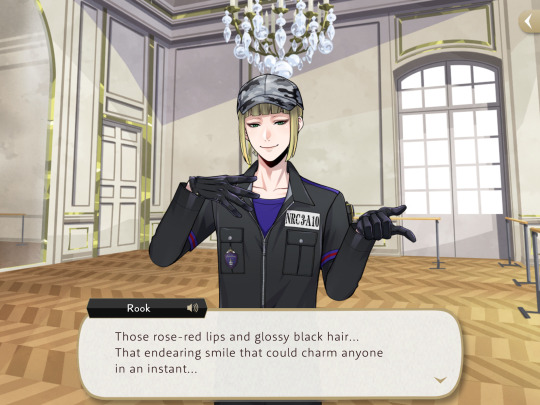
But regardless, the fact is, Rook was always going to vote for Neige and his explanation at the end of Book 5 was always going to be his reasoning. Vil’s overblot just gave him a more “legitimate” reason to do so. For whatever reverence he holds for Vil, it was never going to trump his reverence for Neige. The fact he brought all of his Neige photos with him to the training camp further implies that he was never going to be objective in this situation. And seeing Vil almost poison Neige probably further convinced him that Vil was undeserving of victory.
That may make Rook seem duplicitous considering how positive and sincere he seems to be, but he’s still human. And truthfully, him voting for his bias is not an inherently bad thing. What makes him inconsiderate in this situation is openly telling Vil he prefers the catalyst for all his insecurities and overblot, while Vil was still grieving and in a very vulnerable place. Then justifying his decision as the correct one based on his own personal preferences, weaponizing that vulnerability to avoid being called out. Knowing that Vil wasn’t likely going to object.
Even if NRC Tribe did win, it’s very likely Rook would have still brought up his vote to Vil and still convinced him it was undeserved. I would even go so far as to argue that Rook’s remarks about Neige early on in book 5 as well as Vil’s labwear vignette foreshadow the ending of book 5/start of book 6 far more than the fact that the huntsman betrayed the evil queen in the original Snow White.
That coupled with a perfectionist like Vil looking back at their less-than-perfect performance is what compelled him to agree with Rook. If we take into account the idea that Vil still chose to vote for his own team afterwards, Rook’s actions and words probably further pushed him into believing in the idea of his inherent villainy and inferiority to Neige. After all, surely Neige Leblanche would never be reduced to such a hideous state. His heart is too pure, the fairest one of all and as different from Vil as night and day.
If left to his own devices without Rook to influence him, Vil might not be so hard on himself in this case and would resent his defeat more. As he has every right to. But instead, Vil agreed with what was easiest and what made most sense based on everything that has happened in his life and all that he has been made to believe about himself. Why should he continue protesting when no one else will?
Nevermind all the evidence we’ve seen of Vil’s tenacity, excellence and kindness. Why should he believe that he is the most beautiful one of all when Mira frequently tells him the opposite? Why should he believe in his own noble spirit when people openly say it’s not enough and that he’s not relatable enough to be a hero? Why shouldn’t he believe he is hideous when the entire world says it’s so? When even a large majority of this very fucking fandom mischaracterize him as such and agree with Rook anyway?
Why should Vil question any of this?
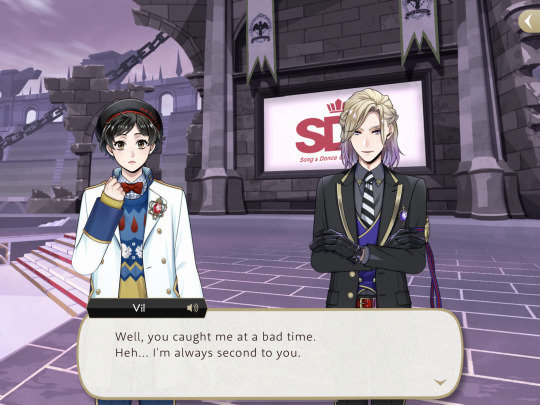
And Vil will sadly continue to be second to Neige and will likely never question it. He will continue to internalize the toxic dichotomy between him and Neige and again, why shouldn’t he? After all, Vil is the evil queen to Neige’s Snow White, the Sharpay to his Gabriella, the Odile to his Odette. And Neige is the Madonna to Vil’s whore. Vil is not supposed to be the hero in this story and not even his trusted vice dorm leader has faith in him.
In discourse regarding the end of book 5, I’ve often heard it said that this was a “lesson” Vil had to learn in order to become a better person. I believe there was indeed a lesson to be learned from this, but not the one that many think. Since Vil knew from the beginning that trying to poison Neige was wrong, he didn’t need to learn how to play fair like Leona.
Despite being a harsh leader, Vil was generally always fair with his teammates and again, as a former dancer, the way Vil instructed the NRC Tribe members seemed tame compared to some of the dance teachers I’ve had in the past. So learning to be less tyrannical wasn’t the lesson to learn either, like with Riddle. And part of what led to his overblot was realizing that NRC Tribe had been “outplayed” by Neige’s cuteness. But he still had enough faith in his ability to vote for his own team, so learning not to be manipulative wasn’t really needed either, like with Azul.
No, the lesson for Vil here is that hard work is rarely ever rewarded fairly. And that his trauma is not valid because he was blessed in a way that Neige was not. He must always take second place to him because of his blessings while simultaneously ALWAYS being perfect. And because of his blessings, he can never express ugly emotions, he can never express anguish, and he must always, ALWAYS, take his mistreatment in stride. And God forbid if Vil DOES respond to his trauma in an ugly manner, he WILL be punished for it. He will ALWAYS be punished for it and by those closest to him no less.
If Vil doesn’t like how they’ve treated him in his darkest hour, tough titties. It’s all his fault for not hiding his trauma to begin with. And he doesn’t even have the right to a moment to himself to cry.
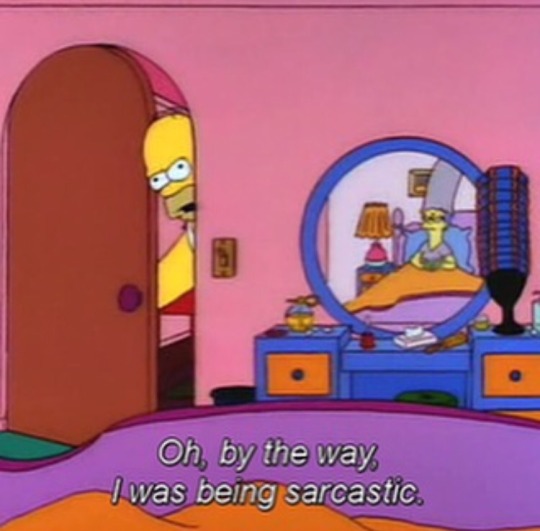
But that is where my analysis ends. Honestly this was kind of painful to write because it has made me fully realize just how much I’ve grown to disdain Rook after adoring him for so long. You all have no idea how hard I was hoping he would have some scrap of redemption in book 6. It’s really upsetting that so many people in this fandom look down on Vil or mischaracterize him but somehow don’t notice the glaring red flags in his dynamic with his vice dorm leader.
Honestly, when I think about it, the ending of Book 5 is actually kind of brilliant, even if it’s also emotionally sadistic and lacking in other aspects. I'm not sure if that was Yana’s intention, but the fact that so many in the fandom tend to see Rook as the kinder one compared to Vil is very telling.
Now I’m not saying that Vil is absolutely without flaws, Heaven knows he has many. As does every person in the twst cast. Vil is impulsive, domineering, harsh, difficult to please, overwhelming at times and extremely complex. But he is also helpful, perceptive, intelligent, genuinely kind and wants the best for those around him. Not for his own glory but for their own happiness and well-being. He is also clearly a deeply misunderstood and insecure young man, so I guess because of Vil’s faults, it’s “easier” to mischaracterize him.
As for me, I find Vil’s character all the more compelling in spite of his harshness because I can see in him a true understanding of beauty that is both profound and attainable by anyone. If we are brave enough to behold it.
#twisted wonderland#jas reads twst#long post#twst book 5#twst book 6#twst vil#vil schoenheit#pomefiore#shut up jas
38 notes
·
View notes
Text
ok i've decided that i do want to compare and contrast mindhunter and criminal minds and, more specfically, delve into why one show only got two seasons (fuck you netflix) while the other got a whopping fifteen + a spinoff/reboot.
so for those who don't know, mindhunter and criminal minds have very similar premises:
mindhunter is based off the true story of how the behavioral science unit (BSU) of the FBI was founded in the late 1970s. the plot follows the cast in their personal and professional lives as they develop the process of criminal profiling to catch criminals and prevent future crimes. because it's based off of a true story, all of the criminals that are featured in the show are actor portrayals of real people (edmund kemper, dennis rader, charles manson, etc.).
criminal minds follows the behavioral analysis unit (the BSU was renamed in 1985) in the early 2000s and on as they use the already established process of criminal profiling to track down serial killers. this show is a fictional portrayal of the real unit so, although they occasionally reference real criminals, all the criminals they chase are fictional.
for the purposes of keeping my thoughts at least somewhat succinct, i'm going to keep my comparisons broad and not go into a crazy amount of detail about specific episodes because this would turn into a full-length dissertation.
like i said in the beginning of the post, i want to talk about why one show got cancelled over the other and what i think it boils down to (other than money obviously) is the current obsession with "instant gratification" in media. to elaborate- i feel like a lot of consumers are not willing to wait for an emotional payoff in whatever tv show/movie/book they're engaging with; they want all the facts laid out directly in front of them and they want a clear resolution. now keep in mind this is just my personal opinion based on what i've seen in different online spaces, but let me dive into each show more to explain why it seems to fit.
mindhunter is a very slow-paced/slow burn show. it focuses a lot more on dialogue and character development than on action (chases, shootouts, standoffs, etc.). most of the plotlines span multiple episodes at least, some of them remained unfinished even at the end of season two. it's a crime show, but in a very atypical way; the focus seems to be centered more on each character's personality as well as their interpersonal relationships rather than on the usual "find the criminal, arrest the criminal" archetype. because of this, i can see why the show could potentially not bring a massive audience. people looking for a crime show that is going to draw them in with a bang are not going to be interested in mindhunter. it's the kind of show where the payoff doesn't come unless you hold out and keep watching.
moving onto criminal minds, it's kind of a polar opposite to mindhunter in terms of its execution. it draws you in immediately with action and then starts to focus more on the characters. the unit usually has one unsub or team of unsubs brought to their attention in the beginning of an episode and they are caught by the end of it, save for multi-part episodes. the first episode literally starts off with a woman being kidnapped and ends with a dramatic standoff and her being rescued. actually, i lied, it ends with a flashback of gideon being held at gunpoint by the footpath killer, but my point still stands. it has all the typical selling points of a crime show and it's incredibly easy to be drawn into.
to be clear, i am a fan of both of these shows (although i don't think the original run of criminal minds should have had 15 seasons, i think the quality went downhill as the show went on but that's a separate discussion). the point of this post was not necessarily to analyze which show is better, but more to analyze why two shows that are so similar at the core could have two strikingly different outcomes and be recieved so differently. i really do think that it speaks to what the current culture around media is and the specific (and somewhat narrow) expectations that people have of the shows/movies that they watch.
#thanks for coming to my ted talk#mindhunter#criminal minds#i don't know why i said i would keep my thoughts succinct this is a long ass post 😭#why did i put so much thought into this i am not well.
3 notes
·
View notes
Text
what is utahime’s role in the future? — a prediction (manga spoilers)
part 2 (unedited)
part 1 is here!
let’s continue answering the question: is utahime weak?

chapter 135
what preparations is utahime making? like i’ve mentioned before, i theorize that she needs to charge up in order to use her technique. since momo and the other kyoto students are fighting on the front line to buy time for utahime, i believe that they trust that their teacher’s ability can help turn the situation around.
what do the students think of her? do they think she’s weak?
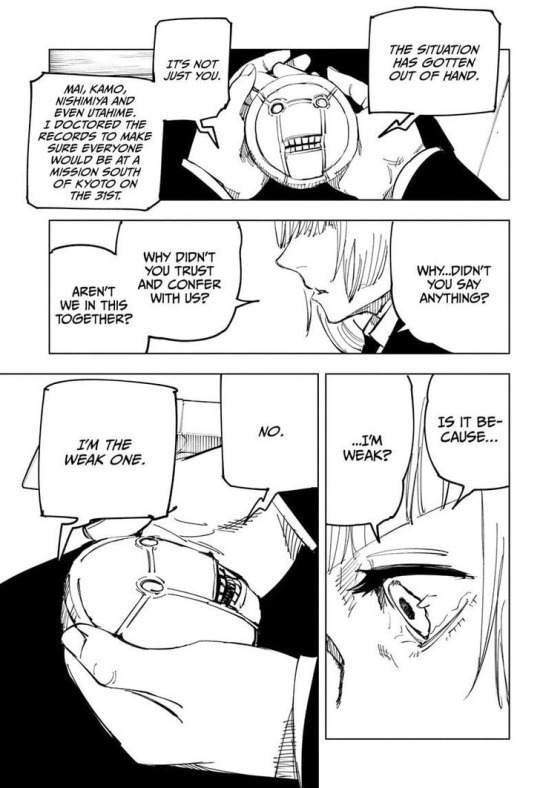
chapter 128
mechamaru manipulates the circumstances in a way that allow him to keep the kyoto people away from danger. this has more to do with how much he cares about his classmates and his teacher rather than seeing them as incompetent sorcerers who can’t hold their own. notice how he says “EVEN utahime”.
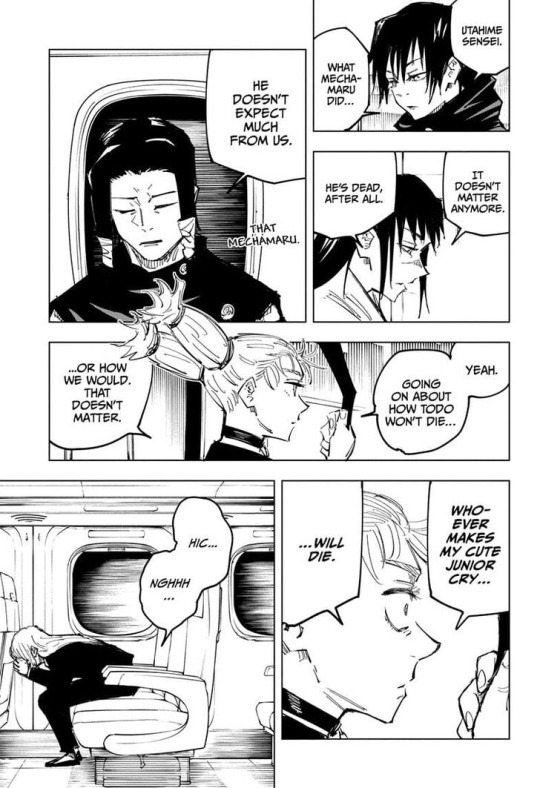
chapter 128
kamo thinks mechamaru doesn’t have that much faith in the Kyoto students—but this isn’t true at all! he knows who the enemy is and has a grasp of how dangerous they are. he just wants to keep his friends safe. besides, kamo is a semi-grade 1 sorcerer which means he’s more than capable of defending himself against curses. but since he’s being kept safe too, it suggests that this is not a matter of keeping weak people away from fighting :)
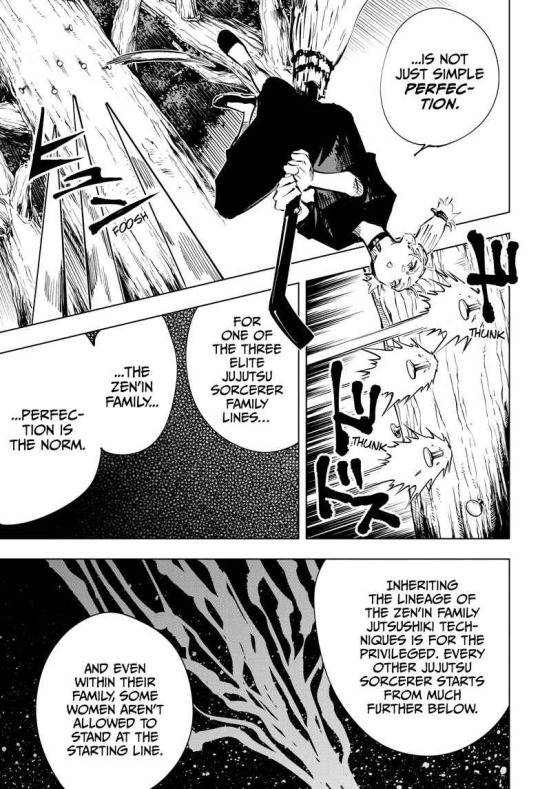
chapter 41
this seems a bit off topic but let’s talk about the misogyny in jujutsu society. momo points out to nobara that the women from the zenin clan are expected to be perfect. the misogyny runs so deep to the point where some women aren’t allowed to even fight. you may think that this is just about the zenin clan but it’s about society as a whole. that’s why nobara responds to momo in a more personal sense. she doesn’t care about the boys versus girls issue because she embraces all aspects of herself. she loves herself when she’s strong, and she loves herself when she’s dressed up and beautiful. if it only applied to the zenin family then nobara wouldn’t have responded the way she did.
in the chapter before, nishimiya explains, “even if a girl has skills, if she’s not cute, she’s looked down upon. of course, if she’s only cute with no skill, it’s the same. women sorcerers aren’t expected to be skilled, they’re expected to be perfect.”
some of the female characters in jujutsu kaisen apply to this. for example, maki and mai. they’re looked down upon because one can’t use a cursed technique or see curses, while the other’s cursed technique is weak. in chapter 148(?) naoya says the only thing maki had going for her was her face, but it’s ruined now so she’s nothing. the zenin twins fall under the “cute but not skilled” category in jujutsu society. before we can put utahime into a category, let’s examine mei.
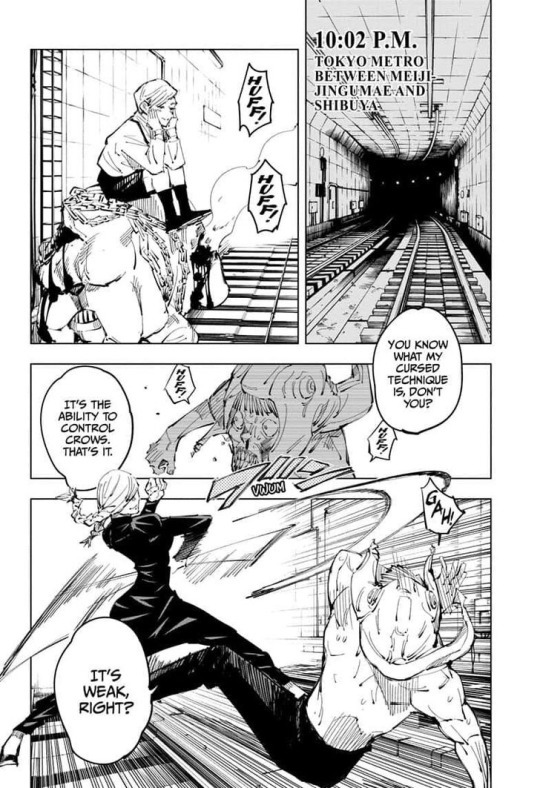
i promise this will all connect so please bear with me LOLLL let’s move on to mei. we find out that mei has the ability to control crows. she deems this ability as weak because it’s simple and doesn’t have much attack or defense power.
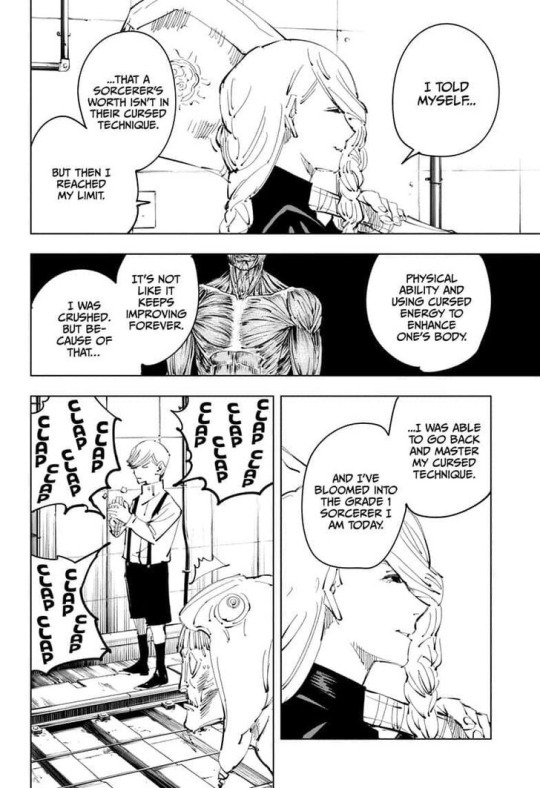
she convinces herself that a sorcerer’s worth doesn’t revolve around their CT. by following this ideal, she soon found herself at her limit because you can only hone your physical abilities to an extent. she said she was crushed because she thought that her weak CT would forever stunt her ability to grow as a sorcerer. but because of all the training she did in order to not rely on her CT, she was able to combine her physical prowess with her technique to make what’s best of her ability to control crows.
mei is an example of a perfect woman based on the standards the jujutsu world has established for women. although she has a weak technique, she makes up for it with adept use of weapons and physical prowess. she found a way to incorporate this “weak” ability to make it something strong. she’s beautiful and powerful so therefore, she was promoted to be a grade 1 sorcerer. she is what a woman is expected to be in order to be acknowledged by others.
what about utahime? why couldn’t she follow the same footsteps as mei?
i can’t answer that because we don’t really know much about utahime so far. i can only speculate why. being a grade 2 sorcerer at 20 is not bad at all. but why is she stuck as a semi-grade 1 sorcerer at 31? that surely proves she’s just weak, right?
semi-grade 1 sorcerers are sorcerers who have performed well on missions with a person accompanying them. i feel like when utahime was on a mission to exorcise a grade 1 curse on her own (the final step of the grade 1 promotion process), something happened that gave her her scar and made her unable to fulfill the mission. it’s either that or she did complete the mission but her appearance is too unsatisfactory. can you recall what nishimiya said? if you’re cute and not skilled, you’re not good enough. if you’re not cute and skilled, you’re still not good enough.
in men, scars are a symbol of honor and strength. on the other hand, scars on a woman’s face are seen as an imperfection. as a result, those who are scarred are deemed imperfect and unsuitable for marriage.
gojo hates the way things are run because the higher ups are so close-minded. they make decisions on a whim and have no compassion for sorcerers who are breaking their backs on their orders. he wants to change jujutsu society for the better by raising the next generation of sorcerers to be as strong as him. the old-fashioned and narrow-minded attitude of the higher ups leads me to believe that utahime is stuck as a semi-grade 1 sorcerer because she is viewed as imperfect. utahime’s scar is most likely the reason contributing to her being held back. who would want to promote a woman who isn’t beautiful enough to be a grade 1 sorcerer?
she obviously has a lot to offer because she’s a teacher at Kyoto. todo, a grade 1 sorcerer, has never shown any sign of disrespect towards utahime despite the fact that he surpassed her in rankings. he trusts in her and believes she has some things she can teach him.
can we additionally address the fact that gojo respects mei? he refers to her as mei-san and says that there’s no way she’d cry because she’s strong. mei has a weak technique though? 🤔🤔🤔 controlling crows?!?!?! nah im jk, mei is strong with and without her technique, of course. since gojo respects someone like mei, a person who doesn’t have an out-of-this-world technique, i believe his view of someone strong isn’t solely based on their technique. when he calls utahime weak, he may not be insulting her CT. it’s just all jokes because in chapter 65, geto and mei join in on the fun too and pick on her. mr. hot shot knows that utahime is a valuable asset to his plans so he entrusts her with the task of unearthing the traitor(s). if she was so incapable of such a thing, why did he pay mei to do the same job? 🤔
*a lot of people think mei was actually paid by gojo to promote his students but that’s incorrect. it goes against everything gojo advocates for. he wants his kids to enjoy their youth because his was taken away. being a sorcerer is not a smooth job and no matter how many years you’re in the profession, it never gets easier. he doesn’t wish for his students to be thrust in a world full of hardship and loss, which is why he was so against yuuji and yuta’s execution. he works hard to preserve the innocence of his students. he doesn’t want yuji’s heart to break, not even once. why would he pay mei to promote his students to grade 1? that would automatically strip them of their innocence and youth and push them into a world full of burden and pain.
PHEW that was long. how does this all tie back to utahime’s future role in the story?
her CT will probably come in clutch in an important battle
she might be the one to help get gojo out the box (A REACH i know)
she will help gojo with his plan to overthrow and change jujutsu society as a whole
i don’t really have to dive into the first bullet point. as for the second one, look at what i found!
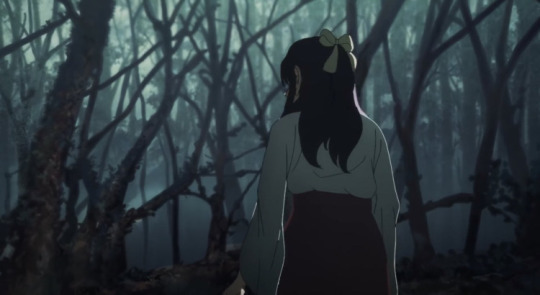
in the second opening, utahime is seen searching for something in a dim forest.
*i read an analysis about opening 2 and apparently this just symbolizes her looking for the traitors. that makes sense too.
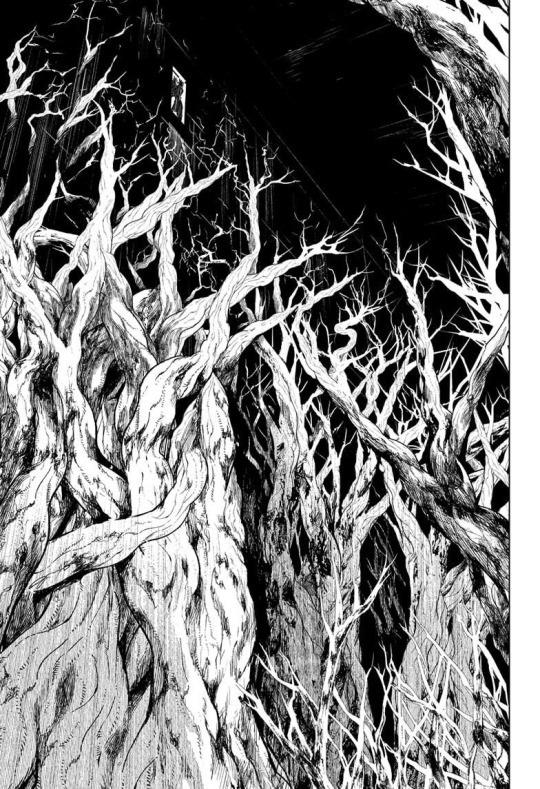
in chapter 144, this scenery pops up right before they enter master tengen’s base(?) the branches are thicker than in the opening but it gives the same vibes to me. i think utahime will be the one to break gojo out.
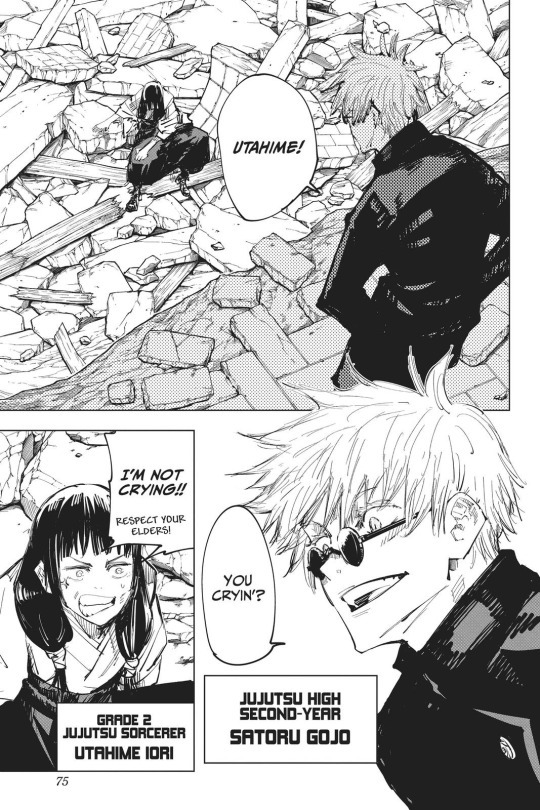
why utahime? well, gojo is their best shot at stabilizing whatever the fuck is going on right now. she knows it’s a crime to unseal him, but she wants her students to be safe so she’ll probably risk it. plus, gojo’s flashback starts with him breaking utahime and mei out of a building with a barrier. i think utahime breaking gojo out of the prison realm will make a perfect parallel :3
that theory is a massive ass pull I KNOW. it’s just fun to think about. it’s likely that kurusu hana will be the one helping yuuji and megumi out with that.
if utahime isn’t the one freeing gojo, she will definitely come face to face with the other traitors.
ive read numerous Reddit threads and tons of users think she’ll play a small role in the story—nothing too significant. i’m perfectly content with that as well. i never expected her to be gojo level or anything like that LMAOO. as long as we get to see her technique in action, i will be satisfied 😮💨
——
i feel like there may be a few things i missed but i tried to include everything i could think of. the organization of this post is quite off but im too lazy to rearrange it in a way that makes it more coherent LOL. thank you so much for reading. ill probably analyze gojo and utahime’s interactions in the manga and anime next :-)
140 notes
·
View notes
Text
RWBY Recaps: Volume 8 “Ultimatum”
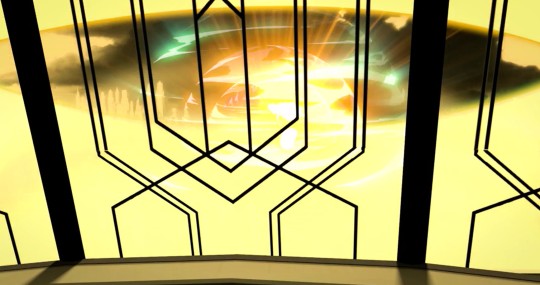
Welcome back, everyone! We had an unexpected break last week due to the horror going on in Texas. I'm glad we did. Not because of any salty "RWBY is bad right now yay free Saturday" feelings, but because keeping to a schedule for a fictional webseries should never take precedence over peoples' safety. I can't believe I need to type that sentence out, but it's true! Over the last seven days I've seen fans who are not merely disappointed by the mini hiatus (understandable) but outright hostile towards the crew because they... were ensuring everyone survived during an unprecedented emergency? Yeah. Given the highly critical nature of these recaps — including today's! — I want to be clear that my thoughts towards Rooster Teeth's creative choices are distinct from any thoughts about the crew itself, including the most basic forms of compassion like, “I sure hope everyone is okay over there.” In an age where it has become horrifically common to harass creators and even send them death threats over stories, it has likewise become necessary to remind people: Don't do that shit. Never do that shit. If I can teach anyone anything at all, let it be that!
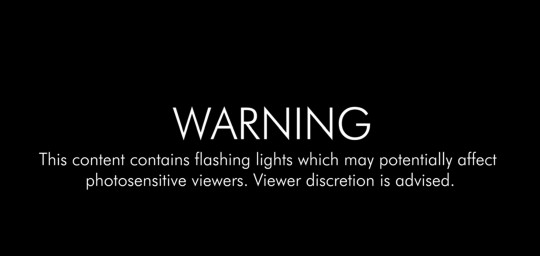
Anyway, dark fandom reminders out of the way, let's dive straight into our delayed episode. It was certainly a doozy. Titled "Ultimatum," we open on a trigger warning for flashing lights. Good on Rooster Teeth for including that, though I do wonder if creators shouldn't be including time stamps as well? Or perhaps a note that you can find those time stamps in the credits, avoiding any (minor) spoilers for everyone else? I'm not photosensitive myself, so I certainly don't mean to speak for that group, but my first thought was, "So how would I watch this episode if I was? Hand on the pause button, hoping I stop fast enough as soon as the lights start?" Hard to do given the surprise nature of the scene. Really, my answer would be, "Wait for the fandom to post warnings of their own, likely including where it happens so I know when to skip" which is perhaps an indication that this information that should be included from the get-go.
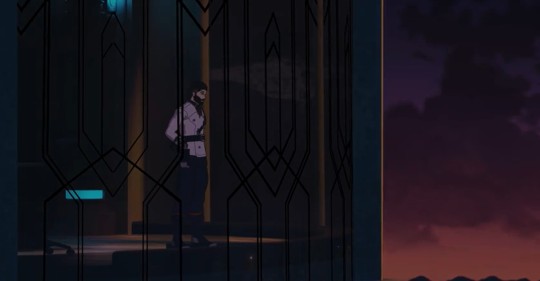
But I am glad the warning exists, regardless. The episode itself begins with a shot of Ironwood looking down at the kingdom. He's used his windows as a vantage point since Volume 7, so that's nothing new, but something about this particular shot reminded me of Ozpin, looking down from his tower. I'm sure the response from many would be simply, "Ah yes, the two power hungry dictators watching over their victims," but I think there's a much more nuanced reading here about leaders being expected to fix the literally unfixable and what that responsibility does to an individual. Of course, it's a nuance that is absolutely obliterated by the episode’s end, but the implication existed for a hot second!
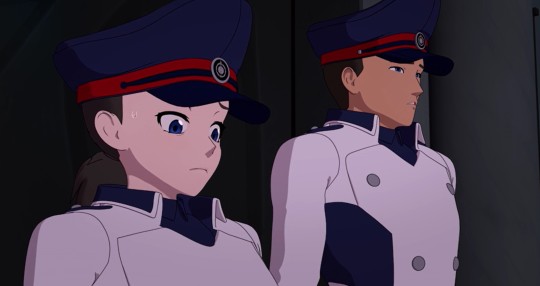
Two other soldiers are in the room with Ironwood, reporting that Cinder has helped Watts escape. They try to soften this with news that they still have Jacques in custody, but receive only a, "I don't give a damn about Jacques Schnee." Which, fair. He's pretty useless at this point. It's when Ironwood learns that both Qrow and Robin escaped too that he really gets mad, something his subordinates have been expecting given their scared expressions.
Now, I'm treading lightly here because I realize how this is going to sound given the end of our episode, but I still want to note that outside of that ending... this is a weird take? Just hear me out. Since Volume 7 the show has worked very hard to make Ironwood seem scary and unstable — bad setup for what we end with today — but the problem is that none of it works in context and it certainly doesn't work when compared to other characters' actions. They are literally in the midst of an unwinnable battle and thousands of his people are dying. If the audience wants a human being — who also just lost a limb and was betrayed by half his allies — o remain perfectly poised and polite during that, sorry, but that's not how human beings work. But even beyond this, what’s the message here? Ironwood raises his voice, so does Yang. Ironwood hits his desk, Qrow hits a child. If we're going to examine how Ironwood handles his stress and anger, he often handles it better than many of our heroes. Namely, by continually taking that anger out on inanimate objects. I kept waiting for him to attack his subordinates or attack Winter this episode, especially given where we end up, but it never came. Ironwood always has enough control to break the desk or punch the wall, not the person in front of him. Which, of course, would not be a good thing in the real world. I want to be clear given these sensitive subjects that if someone is breaking things in your presence that's a major problem to address. But this isn't the real world. This is a fantasy world in the middle of a war, populated by other characters who express their anger by punching people, slamming them into walls, or screaming at them until they run away. The story wants us to fear Ironwood long before he makes his objectively horrific choices and it tries to achieve that by showing us characters who are clearly terrified in his presence, by giving us a string of broken objects in his wake. But those details don't land well when we compare them to other instances of stress. In the same volume I have watched Ironwood take a deep breath to calm himself down when things have gone horribly wrong. I've also watched Weiss start a conversation by threatening her defenseless brother. So again, what’s the message here? It can’t be that acting violently towards someone = villainous behavior because, as established since Volume 6, that’s common for the heroes. Why are these subordinates terrified about Ironwood slamming his fist on a table, but Whitley has no problem hugging the woman who threatened him? Obviously there is a HUGE difference between our main group and Ironwood when it comes to other actions (cough-bomb threats-cough), but these day-to-day moments don't match up. The show wants to use violence as a way for us to easily identify the Bad Guy while ignoring all the times when our heroes do the same thing.
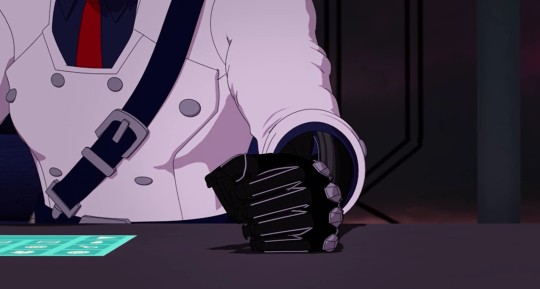
All of which isn't meant to be a defense of Ironwood. As we'll see in a bit, there is no defense for what he's done. Rather, it's a way of acknowledging just how badly he's been written. Why does a man who consistently reins in his anger and takes it out on objects suddenly shoot a councilman for literally no reason? Why does a man defined by wanting to save as many people as he can suddenly threaten to bomb his city? Ironwood's characterization is all over the place, in the sense that they keep writing him as the morally gray, sometimes harsh, but ultimately compassionate man he started out as... up until they need a villain. Salem isn't here yet, so Ironwood can shoot Oscar. Salem isn't attacking yet, so Ironwood can shoot the councilman. Salem is currently reforming, so Ironwood can threaten YJR and Mantle. He's the B-plot villain whenever Salem is out of commission, which is a problem for both their characterizations. This filler doesn't make sense for Ironwood and it severely undermines the threat of Salem. You finally introduce the Magical Big Bad and our heroes are facing more of a threat from a guy with a broken army and three loyal allies left? Hmmm.
The tl;dr is that Ironwood's arc is a disaster and, frankly, it's gotten old reading simplified takes of, "It's just a realistic look at what white U.S. men will do in power sweetie :) " RWBY does not have the context capable of conveying that sort of critical take because our world is not besieged by literal monsters and an immortal witch, to say nothing of how real life good guys do not get deus ex machina canes that fix the problem instantaneously. Ironwood is not an example of anti-U.S. imperialism, he's an example of writers who don't know how to write.
Anyway, I'm getting severely off topic. Obviously Ironwood is a major part of this episode, but the problems demonstrated here are two years in the making. This is the culmination of things I've been discussing for months across hundreds of posts... so I should probably stop trying to summarize it all in a few paragraphs lol. Perhaps when RWBY is over — or Ironwood has died — I'll do a single meta on his character, try to pull everything into one, unified argument.
For now though, we have an episode to analyze.
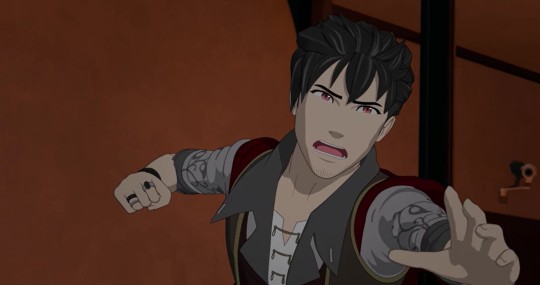
While Ironwood is receiving this news we get flashbacks to Qrow and Robyn. Qrow attacks a soldier in his bird form, which is hilarious. Someone GIF that please. It does raise some interesting questions about this magic though: does Qrow retain his aura and strength in this form (something I thought given his choice to transform during the explosion), or was that soldier just so shocked at being attacked by a crow that he went down easy? We'll never know, because that would require establishing concrete rules for this world. The point is Qrow is going feral in his freedom, throwing punches left and right — did he kill that guard? — while Robyn watches it all from under a rock. They're apparently still somewhere in the facility since all the exits are guarded, but that's not the good thing Ironwood seems to think it is. After all, Qrow is out to murder him. He wants to be there.
We all see where this is going, right? The show is going to ignore Qrow's crazy belief that Ironwood got Clover killed in favor of a "Qrow saved Mantle by murdering Ironwood"/“Qrow got revenge for Mantle by murdering Ironwood” ending. Who cares why Qrow wanted to kill him in the first place now that Ironwood has his finger on the trigger? If RWBY is good at anything, it's writing moments that encourage you to ignore everything that came before it. We'll be seeing more of that in just a bit.
"Damn it!" Ironwood yells, because the show is leaning into its cursing. He orders that the subordinates not return until "you have Qrow Branwen in custody." Here we have another great example of the show conflating what the audience knows with what other characters know. See, we know Qrow has a vendetta against Ironwood. We know their relationship is the important one to the story and that Robyn is incidental. Ironwood doesn't know that. There's no reason for him, as a character, to specify that they only bring Qrow back, but it makes sense for the audience who has the whole, thematic picture. Our understanding of the situation is influencing Ironwood's dialogue, which is... not great.
This entire scene we've had creepy music to hammer home just how evil Ironwood is. Except, as said, he takes a breath to calm down and the music fades. Instead of flying into a rage, hurting someone, or doing anything the music suggests he might, Ironwood calmly calls in for an update — which is when the explosion hits.
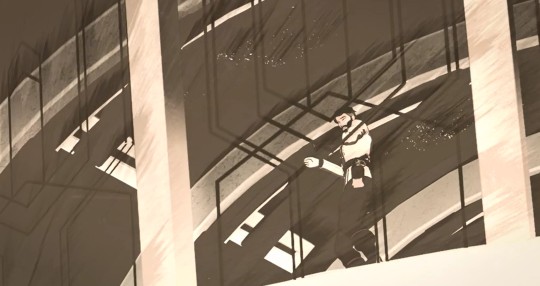
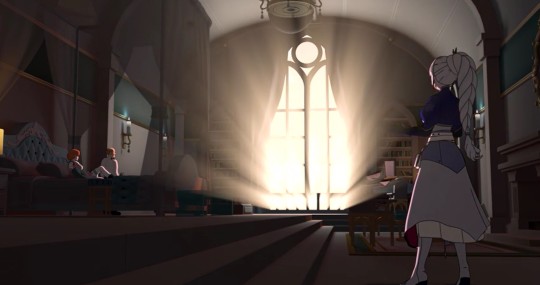
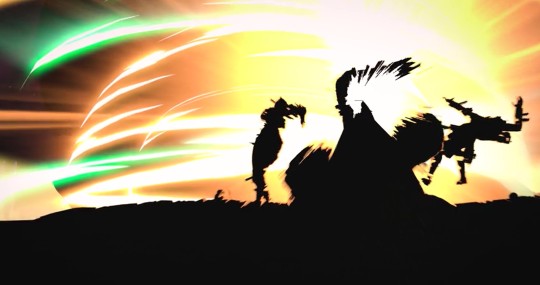
It's MASSIVE, seeming to originate from a lightning strike, which is weird, since it's coming from inside the whale, but whatever. The animation is very dramatic and pretty, as we've come to expect of RWBY, but the actual plot is lackluster at best. It's funny though because I thought for a hot second, when Winter and the Ace Ops were caught in the blast, that RWBY had actually done something exciting. I mean, holy shit! There are the deaths we expect from a battle like this. My god, what is everyone going to do when they realize that Oscar's needless attack took out five characters, including Weiss' sister —
No wait, never mind. They're fine.
Let's talk about that "needless" descriptor for a moment though. Do you all remember, two weeks ago, when I went, "Hey, why isn't anyone telling Oscar that that Ace Ops are approaching with a bomb? They're on a time limit! If someone would just mention that Very Important Information then Oscar wouldn't keep standing around to fight Salem." See, at the time I was frustrated because of how the plot was needlessly allowing Oscar to put himself in danger (especially when the whole point of this mission was to rescue him). Now, I'm frustrated because that same plot needlessly wasted the most powerful weapon the group had. There was no reason for Oscar to use literal lifetimes worth of stored energy when the heroes already had a bomb to do the same job! What was the point of that? I guess he took out the other grimm too, but without the whale that still would have been a challenge with a finite end, one Ironwood's army and the remaining huntsmen should have been able to handle. It doesn't feel justified to have Oscar use a weapon kept on the bench for lifetimes when there was another option literally minutes away.
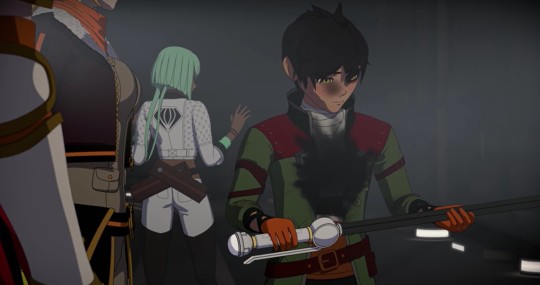
There's so much wrong with this I need another list. So:
Ozpin's cane supposedly stores kinetic energy, which may contradict what we've seen from it before. Regardless, we’ve never heard about this. The all powerful weapon comes out of nowhere
It also begs the question of why Ozpin wouldn't use that power at Beacon and why he wouldn't insist that they try to get their cane back while captured. You had an out this whole time! But we’re going to ignore that because Oscar is a little hesitant?
Which makes YJR's presence even more useless than it originally was, which was already pretty useless. Oscar essentially rescued himself
This kinetic energy miraculously doesn't hurt any people or buildings, just grimm
So what is the point of Silver Eyes? That's been their MO since they were first introduced. Sure, Silver Eyes can be used far more often than Ozpin's cane, but it still feels like a let down to learn that the Big Secret behind this weapon is... the exact same thing Ruby has been doing for years
Like Ruby, Oscar likewise didn't need any practice or training. He just set off this massive attack perfectly and without issue
We have now eliminated the biggest threat to the cast instantaneously — the whale and the other grimm — with no effort from the rest of the heroes. Like the Hound, the stakes are obliterated with no satisfying work on the part of our protagonists
Instead, as said, the actual plan already in place never happened. The bomb just... goes back. Kind of like how Cinder attacked and then just went back to Salem. Penny woke up and then just got knocked out again. We continue to go in circles
This is because no one took two seconds to tell Oscar, "There's a bomb on the way"
Because this threat is gone the show needs a new one, hence Ironwood randomly threatening Mantle with said bomb
The one way we might have justified Oscar blowing up the whale instead of Winter is if he did it to save Hazel, but Hazel is implied to be dead
Maybe he's alive, but if he's not that happened off screen and we're not sure how. It couldn't have been because of the blast itself — everyone else is fine — so what, Salem somehow killed him before she was blasted to bits? While he was holding her?
And there's no body?
Salem was torn apart multiple times during that fight and reformed instantaneously, yet now, conveniently, she's taking her time
None of the characters mention the issues above. None of them admit that there was no reason for Oscar to waste LIFETIMES worth of power when they already had a solution in the works. Fantastic
I need to take a moment to acknowledge that so far this recap feels... bad. Disjointed. Bit all over the place. Which makes a certain amount of sense because that's where my thoughts are at. There's so much going on in this episode — so much wrong with it — that I don't know how to boil it all down into a few, neat claims. This episode is a mess! We're barely a few minutes in and the combined issues of Ironwood's characterization and Oscar's choice have left me reeling. So if you're still reading this, bless your patience, I think we'll both need it for the rest of this journey.
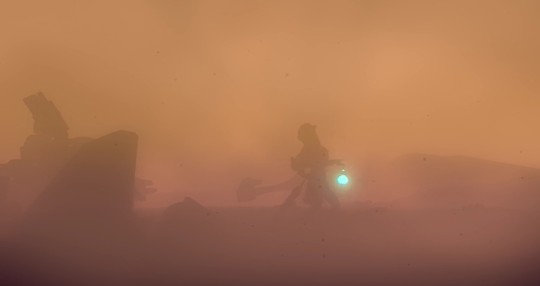
Let's snag a neater plot-point to discuss. Amidst all the chaos Neo literally skips away with the Lamp, clearly thrilled at how her own life is going. Later in the episode she'll text Cinder with the obvious: Salem is going to be pretty pissed when she realizes this is gone. “If you want her name you know what you owe me."
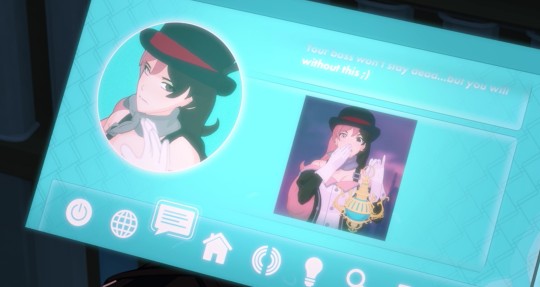
So wait... what is Neo leveraging here? Is she agreeing to give the Lamp back so Cinder doesn't get in trouble with Salem? Give Salem the password she's been looking for? Or give Cinder the password to use the Lamp for herself? What would Cinder even want the Lamp for when she's after the Maiden powers? I'm confused about what Cinder is being blackmailed with. Regardless, she needs the lamp for something and presumably what she "owes" Neo is Ruby. We get a cut to her just to hammer that home.
(Side note: both pictures of Neo are hilarious.)
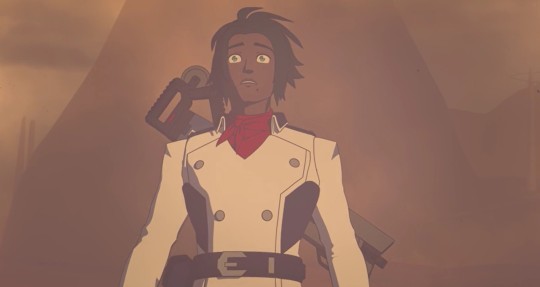
Before that though, back at the whale, everyone is taking stock of the situation when Marrow cries, "Hey, they were still in there!" I feel like this is another scene meant to make him look like the one good guy in the group — he cares about YJOR while the others can’t be bothered — but as always, that reading doesn't fit well with the situation as a whole. The others have barely had time to realize they're alive. I don't think it's a moral failing that they didn't instinctually worry about four betrayers, one of whom attacked them, while they're still checking that they have all their limbs intact. Besides, why does Marrow assume they're dead? The Ace Ops were caught in the blast as well, yet miraculously came out unharmed. They clearly didn't set their own bomb off, so it's logical to assume that YJOR did something themselves. It feels weird to have a "Marrow mourns them and Winter is the only other character who cares" moment when everyone is recovering from bomb shock and no one even knows if the others are dead. But, of course, the show is out to portray only two of these characters as good people, so ignore the logic and run with the emotion of the scene.
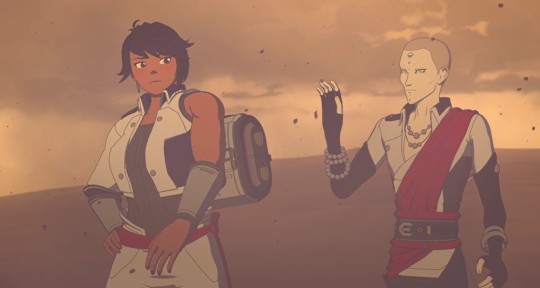
All of which is bolstered by Elm pulling away when Vine puts a hand on her shoulder. Why is she acting cold towards him now? Because they're not friends, remember?
While we get more ridiculous relationship dynamics, Ironwood calls in and congratulates them on the bomb working, but tells them to get back because they have another problem in the works. That would be Qrow and Robyn. Winter decides to tell him about the bomb in person.

We cut to Watts and Cinder watching the remnants of the blast from a rooftop. Cinder has tried calling, but no one answered. Unsurprising, given that Salem doesn't have any other allies left. Cinder says that the plan hasn't changed, she's still going to take the Winter Maiden's power for herself, and Watts can help her by bringing Penny here. He explains that he doesn't have full control over her. Rather, he implemented a virus that is setting her on a single path: open the vault, then self-destruct. Cinder, as one might expect, is furious.
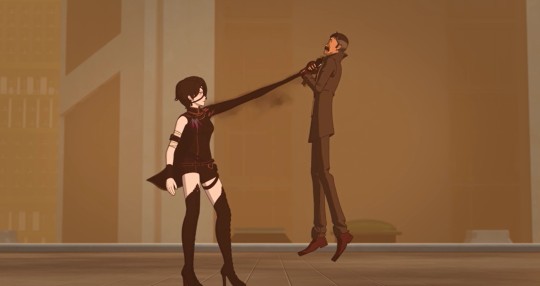
She snags Watts by her grimm arm and threatens to toss him over the side of the building. Thus begins the best part of the episode, hands down. Despite the danger he's in, Watts throws common sense out the window in favor of dragging Cinder in the most satisfying manner possible.
“You think you’re entitled to everything just because you suffered, but suffering isn’t enough. You can’t just be strong, you have to be smart. You can’t just be deserving, you have to be worthy! But all you have ever been is a bloody migraine!”
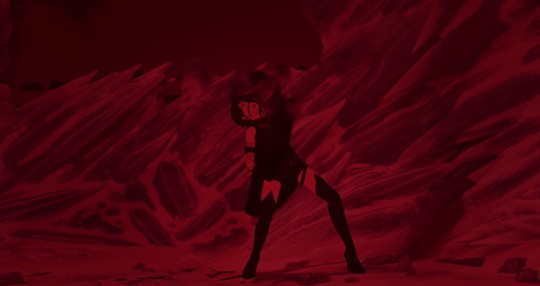
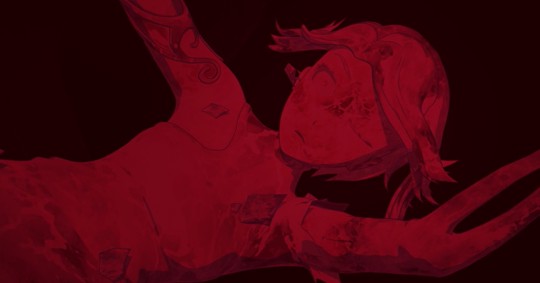
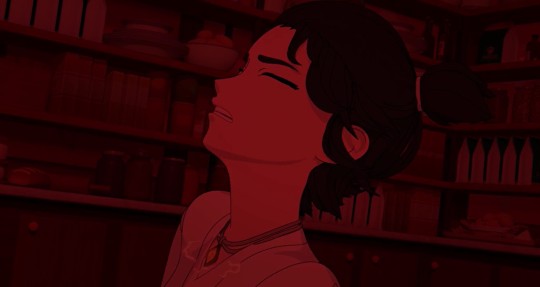
It's true! You know what else is true? This speech could apply to our heroes as well. Accusations of entitlement and reminders to be smart as opposed to just strong hit hard, considering those are the same flaws our protagonists are struggling with. The difference is that Cinder, miraculously, listens, pulling Watts back to safety and going to cry by herself. That moment is simultaneously more growth than Ruby has gotten and more sympathy than Ironwood has gotten. The woman who murdered Pyrrha is treated more kindly by the narrative than one of our initial heroes and our very first villain has taken more time to reconsider her choices than our title character. You know a show is falling apart when excellent choices are applied to the worst possible character.
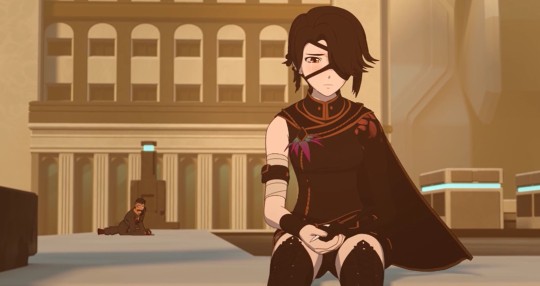
So Cinder is crying while Watts looks guilty and we cut back to YJOR's group post-blast. Yang is finally able to answer a call from Blake who is obviously overjoyed to see her. Weiss gives them directions to the mansion and they ask what in the world they'll do with Emerald, currently on her knees, mourning Hazel.
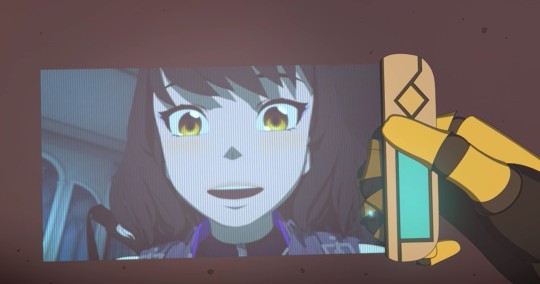
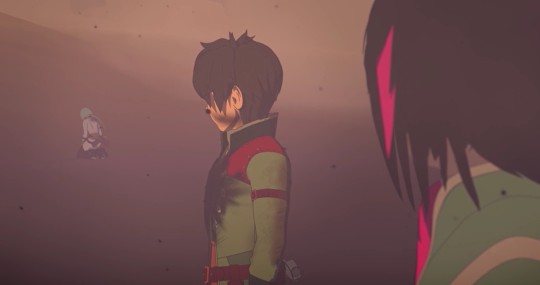
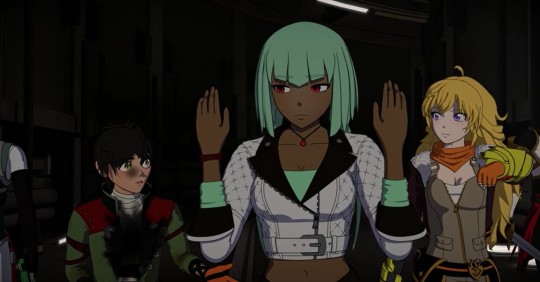
Thus begins the third most frustrating part of this episode. See, on the way back the group continues the conversation about what to do with Emerald, with Yang and Jaune distrusting her vs. Ren and Oscar encouraging cooperation. I can't believe I'm saying this after's Ren's speech and Oscar's entire existence... but I'm team Jaune and Yang here. Look, what Oscar and Ren say — the literal words coming out of their mouth — is nonsense. Ren goes, “We can’t let all of our actions stem from fear," as if Yang and Jaune are being ridiculous for mistrusting Emerald, one of the established villains, after years worth of harm from her. It’s weird that Yang points to her arm as something Emerald is responsible for, rather than being framed or the deaths at Beacon, but the general sentiment of, “She’s done horrible things!” is true. Ren’s perspective is the same simplification that was applied to Ironwood last volume, wherein everyone acted as if he was crazy for fearing an attack on his kingdom... post an attack on another kingdom and pre an attack on his kingdom. Putting generic lines in Ren's mouth about not being afraid makes him sound willfully ignorant, as if choosing to believe that someone is good will magically make them so, to say nothing of thinking it will erase all the harm they've already done.
Oscar at least acknowledges the difficulty here, but then follows this up with, “You don’t have to forgive her… just give her a second chance."

Oscar, honey, that amounts to the same thing in this situation. Allowing Emerald a second chance means working with her, which means trust, which means emotionally reaching a point where these characters can put aside the harm she's done them in an effort to give her that chance in the first place. This actually ties into a post I saw last night, one I've come across before, that claims redemption arcs don't require any suffering on the part of the person who has done wrong. I agree in theory, that prolonged suffering doesn't help anyone, but the problem is that people tend to conflate suffering with consequences and someone who has done this level of harm should face consequences for their actions. The problem with redemption arcs is not that the bad people suffer too much — emotionally and physically beating on them as a form of revenge — but that the people they've harmed are put into situations like this one. If Yang and Jaune let Emerald go like she suggests, they are agreeing that she doesn't have to face any consequences for the damage she's done (which, keep in mind, involves multiple deaths, not including all the lost lives here in Atlas). If they agree to give her a second chance, they are forced to jump straight to some level of forgiveness. We might claim they don't have to forgive Emerald to work with her, but from a practical perspective how are they meant to function, especially during a warzone? Anything she provides them with — information, watching their back in a fight, undertaking missions, etc. — requires trusting her enough to allow those things to happen: working with that info, letting her protect them, allowing her that responsibility. It's all about trust, trust she has yet to earn. In order for a redemption arc to be successful, the power has to be in the hands of the victims. They need to be able to see some justice for what was done to them, be offered some proof that the person in question has truly changed, and have the ability to walk away if they decide no, I don't forgive you, glad to hear you've improved, but please stay out of my life. Jaune and Yang have none of that. There are currently no systems in place for Emerald to face consequences for her choices, she has offered them no proof of her remorse or true motivations, and the other half of the group is pressuring them to give her that second chance without closure or reassurance. None of that makes for a good redemption arc and reducing that to, "So you want to see poor Emerald suffer, huh?" ignores the suffering she has already caused. The group are her victims and they are under no obligation to give her a second chance, particularly under these circumstances, which makes the story's choice to have Ren and Oscar act like Yang and Jaune are being stubborn or inconsiderate a problem. The conversation boils down to, "Give the woman you know to be a liar, manipulator, murder accomplice, and servant of our enemy a second chance based entirely on unfounded faith. If you don't you're letting yourself be ruled by fear."
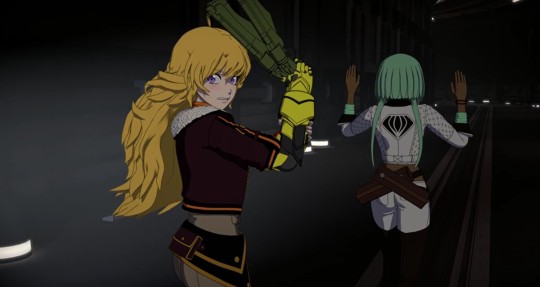
RWBY's touchy-feely themes really don't sit well within its realistic, morally gray premise. We cannot continually have these characters go through hell one moment and then have others accuse them of being paranoid the next. The fact that all of this is wrapped up in the group trusting Robyn, Emerald, and Hazel over their established allies remains beyond frustrating.
Because yeah, you know how Oscar finishes his speech? “I’ve already gotten a lot of help today from someone I don’t exactly trust right now." Meaning Ozpin.
The story is trying to compare Emerald and Hazel to Ozpin.
"Oh hey, I kept a secret from you after lifetimes of watching that secret lead to betrayal and death. I keep apologizing for my mistakes while ignoring that I had no reason to trust a bunch of kids with such world-shattering information and also that you tore it from me in the most traumatic way possible."
"Oh hey, I willingly joined our world's version of the devil and helped her destroy your school, leading to numerous deaths including your friend and headmaster. It was his death that put Oscar in this position in the first place! I then continued to attack your group, leading to another near death of a friend, and a kidnapping, and the destruction of Amity, until I became scared enough to make a run for it."
Which one of these characters is granted an instant second chance? You'll never guess who!
And I do think the word "instant" is important here because just like Jaune and Yang have the right to have distance and justice from Emerald, they had that right with Ozpin too. The difference is they got it. They had the power in the situation, as evidenced by their use of the Lamp and physically attacking him. Ozpin heard what they needed from him — leave us alone — and did that without complaint. They were given months to come to terms with the secrets he kept. They were offered apologies and acts of service to demonstrate intent: saving them in the airship and continually saving Oscar. I don't believe Ozpin ever needed a redemption arc, but even if we think he did, he had it. After three volumes of material Oscar's perspective is still "I don't exactly trust [him] right now" but Hazel and Emerald have earned at least the same amount of trust in a matter of hours? They're really having my boy look at the guy who has tried desperately to do right by him despite unimaginable circumstances, and the guy who tortured him to get information for Salem, and went, "That first guy. He's the one we need to watch out for."
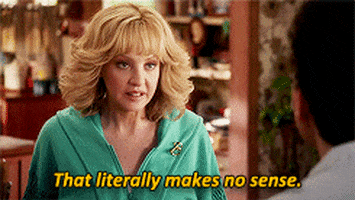
To make things even worse, Oscar tells the others that Ozpin took on all the torture so he wouldn't have to. So he did that and they still don't trust him? If you had told me back in Volume 6 that two years later the group would still be hostile towards Ozpin, while simultaneously urging one another to trust Emerald, I would have said you were lying. RWBY has its problems, but it's not that bad. Yet here we are. I suppose the one silver lining here is that Ren smiles when he realizes Ozpin is back? So at least one of them isn't prepared to draw their weapon at the mere mention of his name.
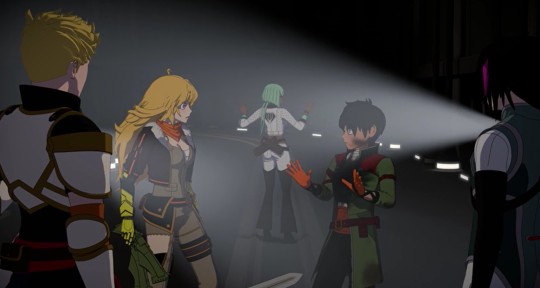
Both these moments raise more questions though. How in the world did Ozpin take on that torture when we clearly saw Oscar getting pummeled for a good portion of the kidnapping? Is that a weird merge thing the story hasn't bothered to explain? I wouldn't be surprised, considering Oscar said last episode he didn't want to use magic because it hastened the merge, he uses the biggest explosion of magic we've ever seen, and nothing has changed. Ozpin is still in the back of his head, thanking him for the tinniest shreds of decency they get. Ren, meanwhile, seems to be back to mindreading. How in the world does he know that Ozpin is back? I assume it has something to do with his semblance, but we don't know what. They could have shown us Oscar from Ren's perspective, perhaps with two distinct emotions swilling around to imply that he sees two different people now, not a useless shot of Emerald with purple flower petals, whatever purple means.
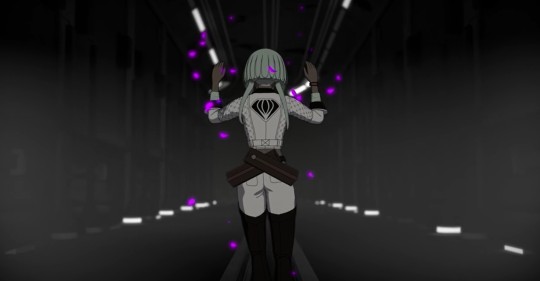
Oh, but no, we shouldn't have gotten either of these scenes. Remember that Ren's aura broke a very, very short time ago? Is it back already? Can he use this part of his semblance without it? Considering it was near impossible to see Ironwood's aura breaking in the Watts fight and we were then mistakenly told he used his semblance in the office, I'm going to go with, "The writers forgot."
Oscar explains that the cane had "lifetime after lifetime" of power in it and though there's still some left, "we have to be careful with how we use the rest." He says that Ozpin trusted his judgement and of course he did! Ozpin also didn’t know that there was a bomb on the way. Yet funnily enough, no one else mentions that, whoops, your choice made in ignorance was a waste and that's due entirely to us prioritizing hugs over basic mission information.
Also, all these explanations take place in front of Emerald. Half the group doesn't trust her, but they'll freely discuss their powers and limitations here. Remember how the group once wanted to talk about magical relics in front of the old lady they'd just met? Yeah, they've learned nothing.
Combine all this insanity with the fact that Ozpin's magic saved the day before Ironwood's bomb could do the same... while Ruby sat in a mansion drinking tea. Who's our hero again?

So things are a hot mess, to put it lightly. Their conversation finally ends when they hear voices and round the corner to find all the Atlas citizens huddled in the subway. For once the show actually writes them in a sympathetic manner, emphasizing how terrified and helpless they are. This image doesn't lead the group to any revelations though, certainly not anything that would tie back to Ren's earlier speech in the snow. No, once again the justified criticisms here are ignored as we hear that “However this fight ends, we could really use someone like you, [Emerald.]” That's it then. Discussion over. We knew as soon as it started that blindly trusting her was being presented as the "right" thing to do and now here we are, deciding that conclusively, despite Jaune and Yang's complaints. By the time the group reaches the mansion, Oscar is defending Emerald from Ruby. We're supposed to just accept that she's a part of the group now, only minimal pushback allowed.
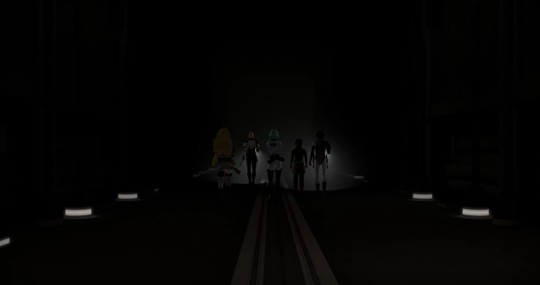
Before that though we return to Ironwood getting news that their bomb never went off. He briefly wonders who else could have done that, but puts the currently unanswerable question aside for what he does know. They still have the bomb and it could be "useful." See, this moment — like shooting Oscar and the councilman — is when Ironwood just randomly goes off the deep end. One minute he's talking about what they've lost and cradling his new arm,
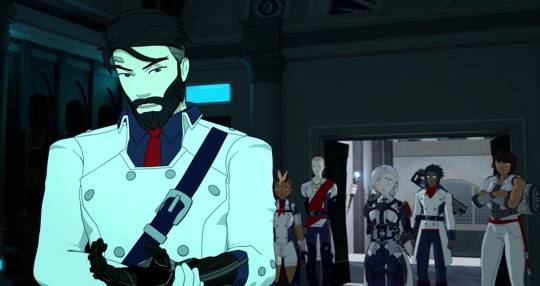
the next he's saying that he should have tortured Qrow to get Penny to obey him! Which doesn't even make sense since I'm pretty sure Penny hasn't ever spoken to Qrow. She wouldn't want anyone to suffer, true, but it's not like Ironwood had a close friend like Ruby to use as leverage. Qrow is just Some Guy to her. Regardless, he thinks Yang, Jaune, and Ren are decent replacements, despite Penny also having no relationships with them. This is what happens when your characters only start breaking up their teams eight years into the story, the response to Ironwood wanting to torture Ren to hurt Penny is, “Does Penny know Ren exists?” But, you know, torture is torture, right? Maybe. Probably not. I mean, if they're going to turn Ironwood into a cartoon villain, they could at least keep him smart.
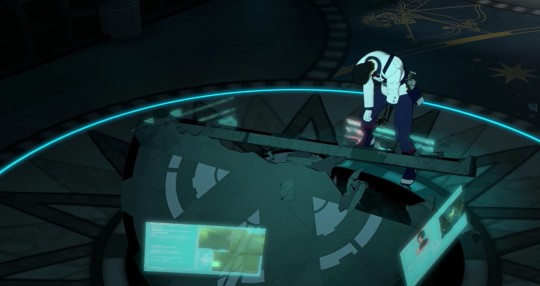
Because all of this is just the height of stupidity. Ironwood wants to torture people Penny barely knows to make her listen (so just grab some civilians? It would do the same job...). Ironwood wants to shoot down empty ships, even though no one, including us, knows where in the world those ships would have gone. Ironwood wants to destroy an entire city to try and save another city. He wants to use a bomb meant for a comparatively small whale and acts like that alone will take out the majority of a kingdom. None of it makes sense! And I know the easy comeback for that is, "Well yeah, Ironwood is crazy and evil" but he's not. I mean he is. Threatening torture and bombings is obviously evil, but he's never been insane, or stupid. As said before, his arc (or lack thereof) is an absolute disaster. The fandom assumes so many things about Ironwood given the opportunity — the whale is a suicide mission. He expects the Ace Ops to die on his order — and the writing hints at so many things that never happen — he's going to hurt his subordinates, attack Winter for disobeying him — and every time what we actually get is a far more compassionate, level-headed character... until he randomly does a 180 and goes, "Let's murder a whole city now!" I never wanted Ironwood to be the bad guy, but they could have at least given me a persuasive decent into this level of horror.
So... yeah. Ironwood has got to die by the end of the volume, yeah? Between Ruby warning the whole world about him and him going into full villain mode, there's no coming back from this.
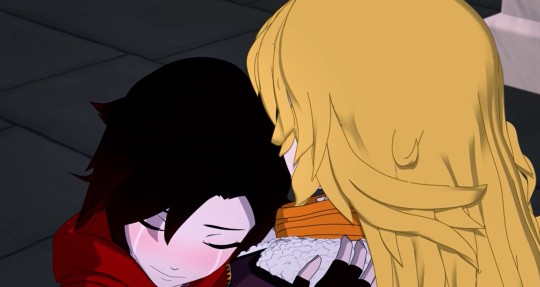
Neo sends her text to Cinder and the group makes it back to the mansion. Remember Yang's criticisms of Ruby's leadership? The ones she conveniently forgot about when Ren started to agree with her? Yeah, those are entirely gone as the sisters hug it out and, presumably, forgive one another for... daring to admit that things are bad? Look, I'm not going to deny that Ironwood's scene with Winter was creepy as fuck,
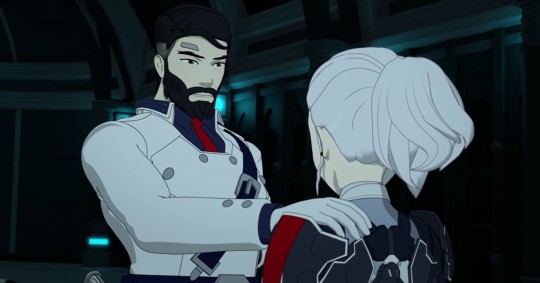
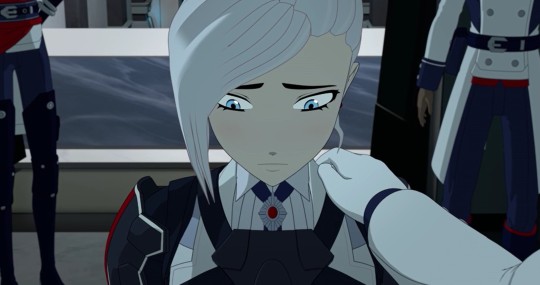
but I'm not of the opinion that the heroes are any better when it comes to the theme of obedience. They've attacked one another, screamed at one another, and any dissent from Ruby's leadership results in the questioner being left behind in the snow. We'll accept you again when you fall back in line. I used to adore the relationships in this show, but watching them now is just discomforting. The show might be 100% more obvious with Ironwood, using creepy music, a smile, and that hand on Winter's shoulder, but the concept of, "Sorry I dared to question you before! We won't ever do it again :)" isn't healthy either. The fact that the show keeps erasing theses problems with hugs — Weiss hugs Whitley now, Yang hugs Ruby, someone will probably hug Emerald soon — doesn't make the circumstances any less uncomfortable.
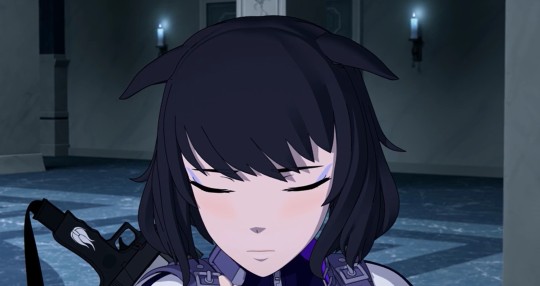
None of this even gets into the Blake and Yang hug. First of all, why is Blake acting like they had a fight and Yang might not want to see her? She's hiding inside rather than rushing to greet them, ears down in a devastated expression until Yang touches her. Combine this with Yang's "Do you think she's mad at me?" and it feels like the writers cut a fight in the final script and then didn't bother to remove the fallout from that. Seriously, where did any of this come from? You can't just have characters act like they've been fighting when they haven’t.
Also, can't forget this.
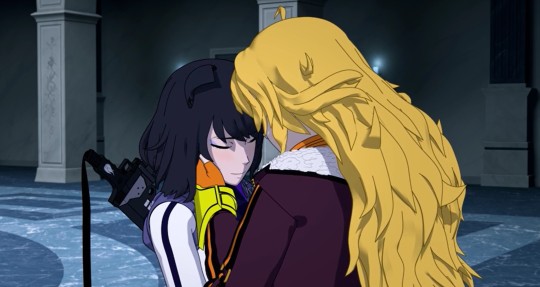
At this point there's nothing more I can say in regards to RWBY's almost-queer baiting. Is touching foreheads more intimate than the hugs Yang gave the others? Absolutely. Is that an appropriate stand-in for overt representation? Absolutely not. This would have been a perfect time for them to kiss. Take out Blake's nonsensical fear and replace it with them both reuniting after their first separation since Volume 5, working under the knowledge that either one could have been killed, finally admitting their feelings. Hell, they don't actually have to kiss. Not all girlfriends are interested in kissing! But they could use the terminology that makes things unequivocally canon. Another forehead touch when we got that in Volume 6? It's not enough, especially not when our straight couples have all been allowed their rep.
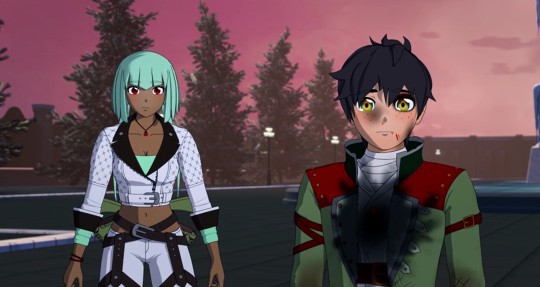
Ren at least wants to know where Nora is. He's presumably told what happened off screen as Oscar tells Ruby that Emerald is their friend now.
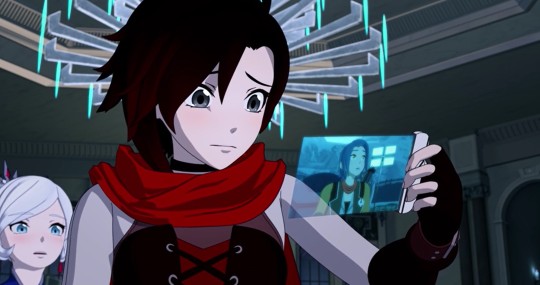
Then an emergency call from May interrupts the reunion and the group learns that Ironwood is bombing the Schnee ships. “Those ships… they were going to save people” Weiss whispers. How? Tell me how they were going to save anyone. Where were you going to take these people where they would be safer than where they are now? RWBY continually asserts things without explaining them, meaning there is precisely zero emotional weight here. Again, Ironwood is far past the point of defense, but I'd be a whole lot more critical of this particular action if I had a better sense of why it's bad. He appears to be endangering the people given May's shout to run — falling debris? — but the further implication is that Ironwood has doomed the people of Mantle by denying them these ships. It's that part that makes no sense based on what we've been told.
Which finally comes to the ultimatum of our episode title: Penny opens the vault, or Ironwood bombs Mantle. Great! So glad this plan is wicked smart and works well for his characterization. It's definitely not a nonsensical, unfounded, overblown change that feels like it belongs in a child's cartoon, complete with dramatic spotlight. Nope. Excellent writing choices all around.
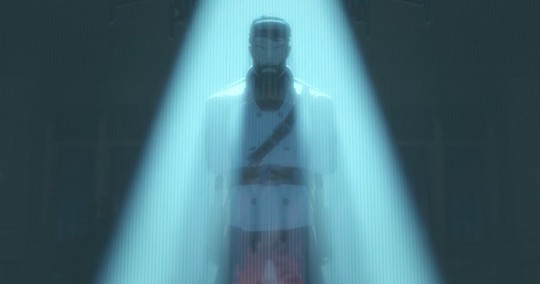
Our final line of the episode is, “I hope you live up to the title I gave you," referring to Penny's job as the Protector of Mantle, and you know what? That line could have been very cool if it was delivered by an Ironwood with a persuasive fall and a halfway decent plan in place. I love that we've twisted the concept of a protector and turned the title into a horrifying, rather than honorable responsibility... I just hate everything surrounding those details.
So, usual RWBY fare.
(At least we get to see that Nora is awake!)
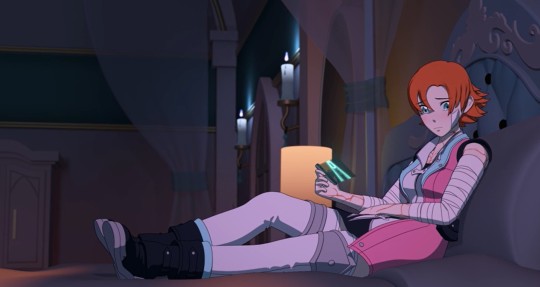
Will things get better over the next four episodes? I doubt it. We're still expecting the rest of the Ace Ops + Winter to ditch Ironwood, someone getting the vault open, the fall of Atlas, now the potential destruction of Mantle, and none of that includes Salem who should reform at any moment. Frankly, I'm not looking forward to any of it. The final leg of a season should make its audience excited to see how everything turns out, not dreading it. I've heard from multiple people that this is the volume that finally got them to drop the show and honestly? I'm not surprised.
As a final (happier?) note: we've finally got a bingo! I completely forgot our board last time, which was a terrible oversight, but we can update it now.
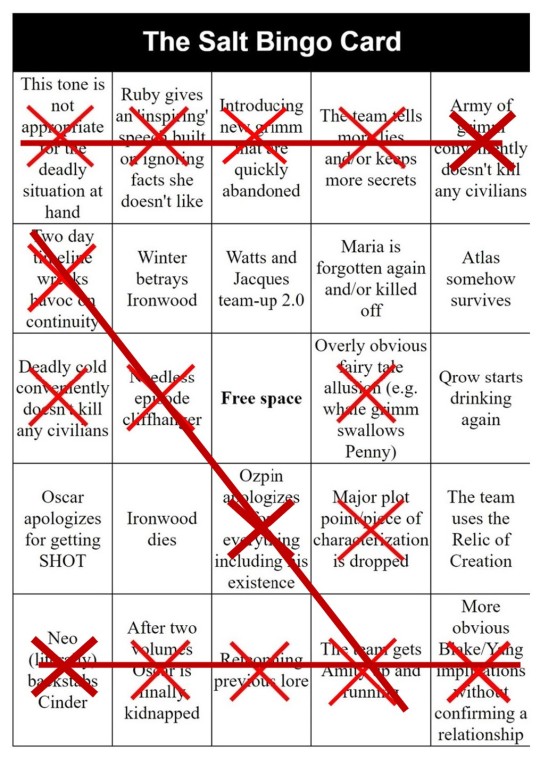
Our army of grimm can't kill anyone now that it got KOed by Oscar (that is the third one hit defeat of a major enemy we've seen this volume. Yes, I'm including the Hound considering it was obviously on its last legs after Ruby's eyes.)
I'm likewise including "Ozpin apologizes for everything including his existence" because he's done nothing but apologize since he came back. The emotion is there even if the literal words are not. Oscar reminded everyone of how untrustworthy he is, but kept the group from jumping them again. And Ozpin thanked him for it.
Neo didn't literally backstab Cinder (shame), but the Relic still counts.
So a triple bingo! Is that how bingo works? Idk, I've never played. I feel like I should have thought up some sort of humorous prize, but sadly I've got nothing. If you think of anything, let me know lol
That’s all then, folks. Until next week! 💜
103 notes
·
View notes
Text
11x02: Acheron, Part 2 - Analysis
Okay, let’s talk 11x02. And 11x01. Because it’s a two-part episode, it’s important to consider them together. I have a LOT to say about what’s going on in these two episodes, so I’ll have plenty to post all week. Let’s dive in!
***As always, spoilers abound below for TWD 11x02. Don’t read until you’ve watched! You’ve been warned!***
Maggie
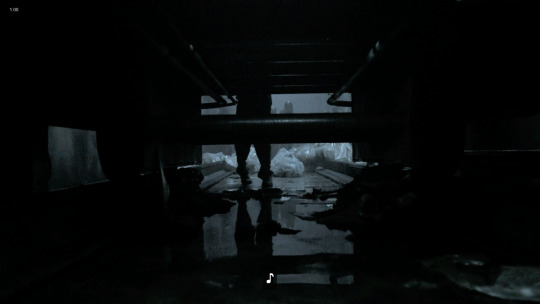
The first thing we see is a point of view from under the train car. The instant I saw that, I knew how things would go. I never thought Maggie would die (if nothing else, there are scenes with her in the trailer we haven’t seen yet) but I was curious as to how she would survive. When I saw this POV, I knew she’d end up crawling under the train. Just as Glenn crawled under the dumpster. Massive parallels to Glenn. Which by extension, massive parallels to Beth. Major resurrection theme.

It's also important that when she reappears, she comes from underneath the car. Obviously, that’s logical given that she crawled underneath the car, but they make a point of asking if the pounding is coming from the roof. Gabriel says no and then they open the bottom hatch for her. Her coming up from the ground like that is a visual representation of a resurrection.
So we see Gabriel, Negan and the others enter the train car. The spatial details here are important, and I had to watch the episode twice to get them all straight. It’s a little confusing the first time. So, the group jumps down into the train car through a hatch in the roof because they couldn’t get the door open in the last episode. The thing is, if you watch closely, you come to realize they’re not in the train car on the end. They must have walked along the roof for two or three cars before finding a hatch that let them in.

So, when Gauge shows up, he comes behind them, and that confused me because I was thinking they came from that direction. And they did, but they entered through the roof, not the door. Anyway, they can’t get the door open. So honestly, even if they’d tried harder, I’m not sure they could have saved him.
This scene accomplished a lot of things, character-wise, that we need to touch on. It’s important to note that Gauge’s death happened due to his own choices. Does that mean he “deserved” to die or that they shouldn’t have tried to save him if they could have? Of course not. No on both counts. But that doesn’t change the fact that his choices sealed his fate.
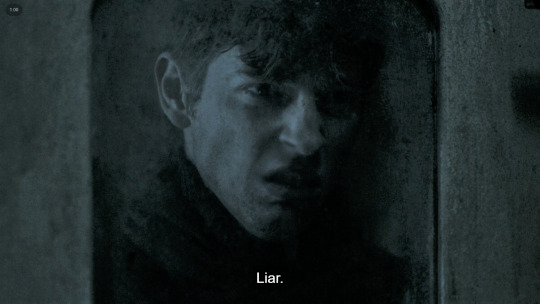
It's especially interesting that he called Maggie a Liar. Not only is that a throwback to the Governor, but it’s a particular type of mentality they’re showing here. Even the fact that he didn’t shut the door behind him is really interesting. My first thought was to be annoyed with him. Why WOULDN’T you shut the door. You live in this world. You know better. But it’s all ego. He can’t imagine something bad will happen. He just assumes if it does, someone will save him.
But the most telling thing was how angry he got before saying Liar. It just shows very much how he approaches life. When he messes up, he doesn’t feel bad, and accept that it was his fault, and try to learn from it. No, instead he gets pissed and blames everyone but himself and his own actions.
If this had been Daryl or Gabriel or Alden or any of our other heroes, they would have recognized that opening the door would have gotten their friends and family killed and would have sacrificed themselves. Especially if they realized they’d screwed up. But Gauge became angry and defiant, even killing himself.
Anyway, I’m rambling. This really has nothing to do with Beth or TD other than perhaps being a future template for something. But I thought it was a really fascinating character sketch.
The thing is, this isn’t really a matter of Gauge being wrong and everyone else being right.
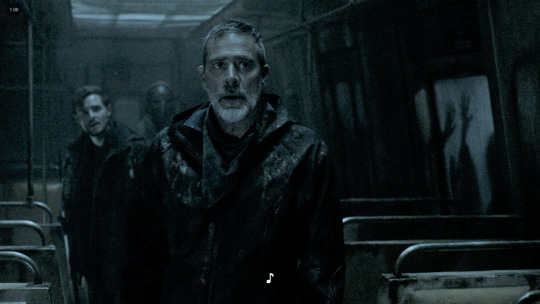
Maggie is…not doing so well either. As I told my fellow theorists, Paola Lazaro said in TTD last week that Maggie was kind of off the rails. I think she said that a little prematurely, because we really didn’t understand Maggie’s state of mind just by watching 10x17 and 11x01.
It's not until she tells that messed up story about the house she found and the people in it that we understand that her state of mind really isn’t at its healthiest. Even saying she wanted to kill Negan before is…understandable given their past. But it makes more sense now why Negan is so nervous. He’s sensing her state of mind that her moral conscience isn’t as strong as it once was, so of course he’s fearful for his life.
I don’t know where they’re going with this Maggie story line, but I have a feeling this attitude of hers will cause conflict down the road. Several of my fellow theorists believe it will cause a rift between her and Daryl. And we can see that somewhat through Alden. At first, he was very much defending Maggie, especially against Negan. He has a lot of loyalty to her. But he didn’t like her abandoning Gauge, and you can see his loyalties starting to waver.
At the very least, what she said about not feeling anything about it is the opposite of what Beth always stood for. Daryl was trying hard not to feel things during Still, in the wake of the prison going down. She made him feel things because that’s the only way a person is truly living, rather than just surviving. Now Maggie is in that state of mind.
And I’m gonna argue that makes it a prime time for Beth to return to help her. But of course I’m completely objective over here. ;D
Maggie’s Story:
Maggie’s story was definitely dark and horrible, but interesting to analyze. I’m assuming there was cannibalism going on there. That’s why the missing limbs. The men in the house were eating the female prisoners. No only a callback to Terminus, but remember that Bob’s leg was taken for food, so I’m sure that’s what we’re supposed to infer here.
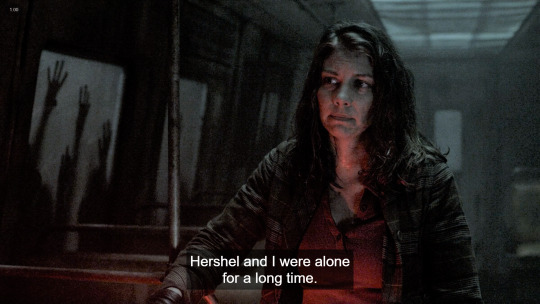
She talked about no eyes, no tongue, no limbs, vocal cords ripped out. So definitely the see no evil, speak no evil themes. With the limbs, it’s also a matter of not being able to escape or save themselves.
In terms of the plot, I do have one question about this that I think may be significant. Maggie first talks about three deformed people (she says, “I wouldn’t call them men”) coming toward her. She kills them, and only after that hears the noise from the attic.
My question is, why were they deformed? If they’re “men,” then they must be at least Maggie’s age, if not older, which means they’ve been around since before the apocalypse began. Even eating human flesh doesn’t cause one to become deformed, so why the deformities? I have no idea, but I wondered if there is a radiation theme going on here. Something they’re hinting at, but not saying. Just thought that was intriguing.
After that, things go sideways and everyone almost dies until Daryl arrives to save the day. So, let’s skip to his story.
Daryl:
We first see him bust through a wall with Dog. So, dog took off in the last episode, but the first time we see Daryl, he’s already found Dog again. At least, the first time. This is where he sees the murals on the wall, the walker with the handcuff and the suitcase of money, etc. I already talked about most of that in great detail HERE, so I won’t rehash it, though it’s very important.

One thing I will say about the mural is that thematically, it’s a match to Still. So, in the golf club, we had lots of rich people who clearly hid there when the world first went bad. And I don’t remember this particularly, but several of my fellow theorists have told me they remember the TTD after Still and that the writers talked about how the golf club was a statement about the class system. You have these very rich people, but their wealth couldn’t save them. Death, walkers, the apocalypse…none of these things discriminate based on wealth or position.
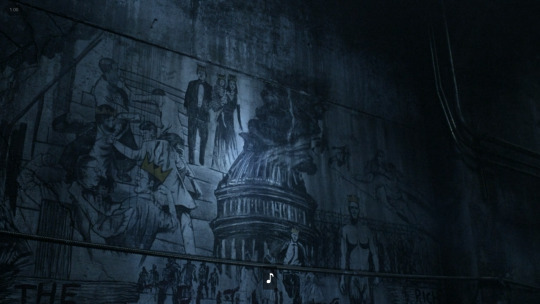
On the wall, we see people with crowns standing at the top, but below, they are homeless, and one of them is being attacked and torn apart. Meanwhile, Daryl sees a line of text that says, “it comes for us all,” probably meaning death.
Well, guess what? Angela Kang, in talking about the murals, said that this, too, was a statement about the class system. So thematically, this is meant to be a parallel to Still.
It’s just interesting to contemplate because if you think about it, most of our heros—Rick, Daryl, the Greene family, etc—weren’t at all wealthy. Rick was humble and well-grounded. Hershel worked hard his whole life and never had any glory or fanfare. And then there’s Daryl, who was “nothing. No one.” They all survived.
So of course it’s a socioeconomic statement, but it’s also one about mindset. It takes not only grit to survive this world, but a certain amount of humility. Ego always gets you killed eventually, as it did with Gauge.
I’ll also mention that I thought the guy with the crown who was being torn apart was being set upon by walkers, but AK says they’re specifically not walkers. They’re people.
So, it’s not a coincidence that we see this juxtaposed with the Gauge situation. His ego gets him killed and we literally see him being torn apart because of it.
Moving on.
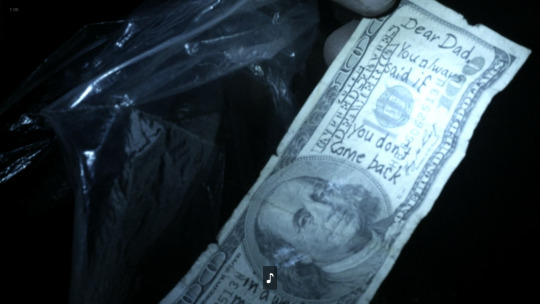
Daryl finds a bag with a $100 bill with a letter written on it. This is a massive TD clue from start to finish. 100 is an important number. The hundred dollar bill features Benjamin Franklin on the front and Independence Hall on the back. Look either of those up and you’ll find lots of fun parallels we could point to. I won’t go into all that today except to say it’s definitely part of the Revolution theme.
This is what’s written on the bill Daryl finds:
“Dear Dad, you always said if you don’t come back in a week to move on. Mom didn’t listen and went looking. It’s been three weeks, so we’re going next. I’ll watch Jesse and turn on the radio every day at 10. See you both soon. Love Tom and Jesse.”
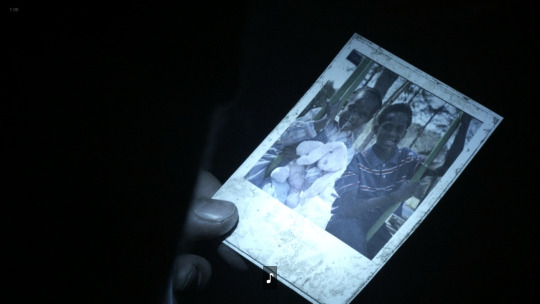
He also finds a picture of two kids. So, the “three weeks” jumps out because of Rick’s line in 5x10, “it’s been three weeks since Atlanta.” It’s also about missing family members, going searching for them, etc. Possibly important that the mom is also missing. I can’t help but think of the song from Still. “Our mother has been absent, every since we founded Rome…”
There is a 10 in there, which is an important number. The turning the radio on every day is both the radio/airwaves theme (also a line from the song) but a callback to Rick and Morgan and their walkie talkies. So, really interesting symbols here.
The two kids immediately reminded me of Noah’s twin brothers. I don’t think these two are supposed to be twins. I’m assuming the brother is older. But still obviously siblings. And it hearkens back to the last episode Beth was technically in. Which also had a lot of the CRM/Revolution theme in it. (X, X).
AK says this family probably didn’t make it, so I’m not expecting these kids to show up in the narrative. But it’s also important to note that the little girl is carrying the toy rabbit Maggie found earlier. So the rabbit also ties into all this symbolism. (P.S. I didn’t get to my rabbit post last week. I planned on it, but time got away from me. I should get it posted later this week.)
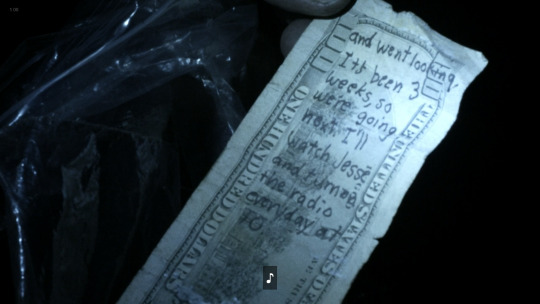
So, this is massive in terms of TD symbolism. I’ll talk about it fits into the bigger narrative in a minute.
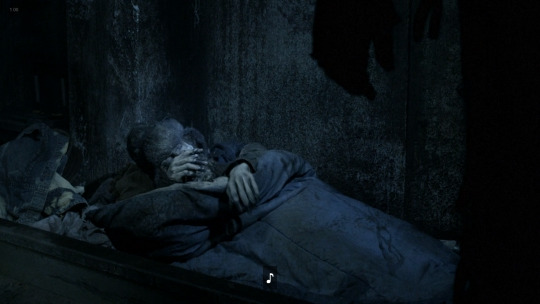
Then Daryl kills the sleeping bag walker. I wasn’t sure the significance of this at first, but I think it ties to the tents and sleeping bags we saw in Atlanta in 5x06, Consumed. Daryl and Carol passed them while looking for Beth. So, this just shows us that this is tied to her storyline and Daryl searching for her.
You could also argue that the walker was “hidden” at first, and it’s significant that Dog found it/realized it was there before Daryl did.

The other thing is that as he’s looking at the sleeping bag walker, there’s a random shoe on the ground next to it. Missing Shoe/Foot theory, which is also indicative of Beth.
They hear another roaring sound and Dog takes off, running into the dark tunnel.
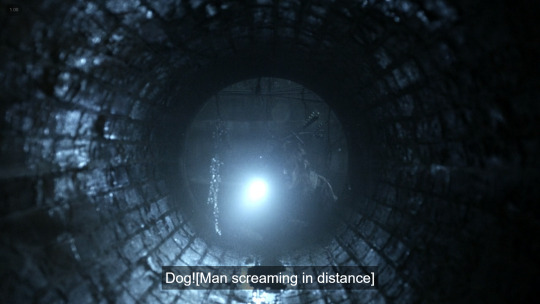
Here’s the thing. I think most people will assume the roar he heard was just more air being forced through the tunnels by the storm, as Alden explained it in ep 1. But I always watch with the subtitles on and I noticed at this part, the subtitles said, “Man Roaring.” So they actually did hear someone screaming. And that’s probably why Dog ran toward it.
After watching it again, I realized it’s probably supposed to be Roy. He’s the white-haired guy, played by C. Thomas Howell, who Daryl finds wounded after he emerges from the Tunnel. I think whatever happened to him when he went topside but then got attacked by walkers is what Dog heard and went running toward.
Maybe not terribly significant in the plot, but it’s important symbolically. Because once again we have something Daryl hears from a distance but doesn’t see. Dog (a proxy for Beth) runs toward it, and Daryl follows. When he does, he find someone who had previously separated from the group. They’re hurt, but alive. See the parallels?
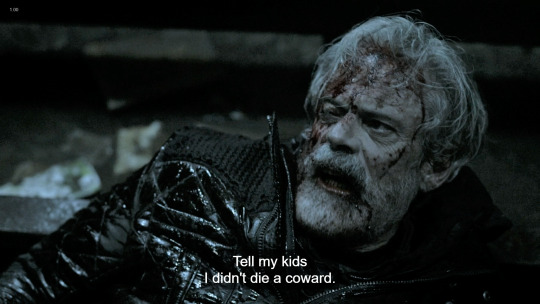
I will say the Roy situation confuses me just a little. He’s clearly hurt, and when Daryl tries to bandage him, he refuses, saying, “just tell my kids I didn’t die a coward.” But then later he’s with the group, all bandaged up, and seems to be okay. (He dies when they reach the Reapers by taking an arrow to the head, so he still dies overall.) But it’s just weird that it seemed he would die, then seemed he was fine again.
It may well be something that foreshadows a future situation, and that’s why it’s not making tons of sense right now. Only time will tell.
Anyway, I kind of glossed over Daryl crawling through the dark tunnel. I don’t have much else to say about it except that it’s a SUPER potent symbol for Beth’s arc and very important that he emerges on the other side and finds this person. Annnd then goes to save TF. (Dark Tunnel Symbolism).
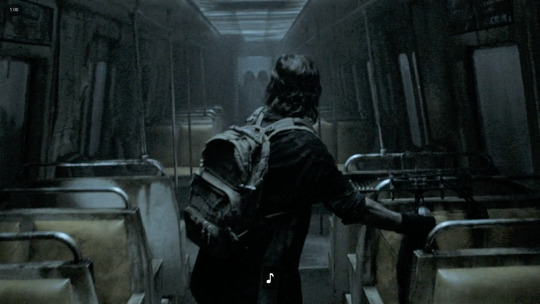
So, he hears the gunshots and finds the train they’re on. He comes up behind the walkers attacking them from the front, kills them, moves the bench blocking the door, and lets everyone through. Then he uses a grenade to blow up all the walkers. (Ew.)
After that they all get out of the tunnels and go topside. The next scene is also super important. We see the stars above. That’s partly to show that the storm has passed now, but also constellations = Sirius.
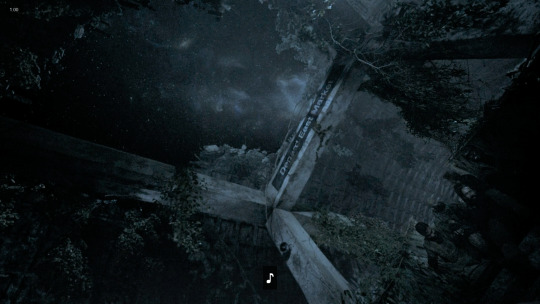
Maggie asks what he has and he tells her about it. There is one weird moment in this scene. When she tells them about the supply depot she wants to stop at, she says Georgie (from S8) set it up for emergencies, for people on the outside to use. When it says this, the camera focuses on Daryl for a LONG moment, and he looks almost sad. I’m not sure what they’re trying to tell us there.

Anyway, they all head out. Unfortunately, when they reach the right neighborhood, the Reapers are there to meet/kill them. And Roy is the first to go.
So, a couple of things here. I’ll probably do a details post because I’m leaving out MOST of the background details throughout the episode, and there are a lot of them. Lots of details to be gleaned in this scene.
But the second time I watched it, I was struck by the people hanging upside down. Obviously a grim sight, but it occurred to me that these people hanging this way look a LOT like the deer diagrams from Scars. Let me show you some pictures:

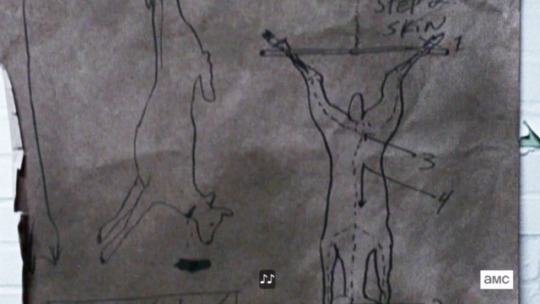
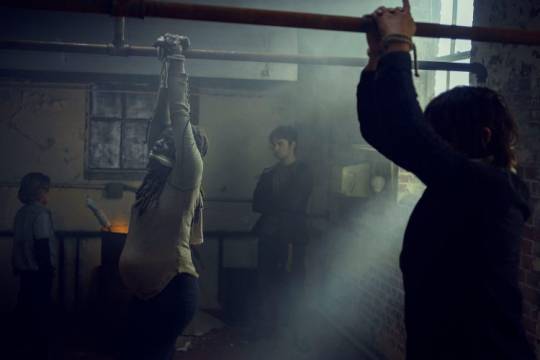
Top pick is 11x02. Middle and bottom one are from Scars.
See what I mean? So, chances are something about Scars foreshadowed the Reapers, which is interesting. They clearly see human beings in a certain way (as animals to be strung up and…perhaps eaten?) And that makes me think that what Maggie found in that house may tie into the Reapers as well. Just kind of interesting foreshadows of coming plots.
Eugene:
Let’s talk Eugene and then I’ll shut up for today. Eugene’s stuff was very intriguing. First thing you need to know. And understand, I didn’t know this. @wdway pointed it out. Some months ago, the actress cast as “Stephanie” was announced. This is her:
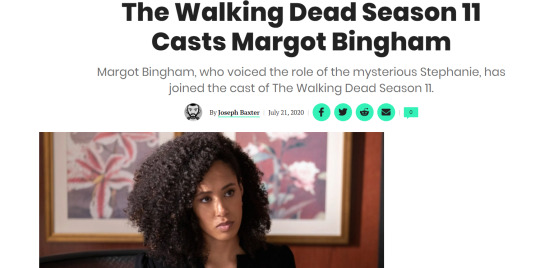
And that’s clearly not the woman who steps into the train car at the end. Which means this isn’t really Stephanie. She’s a decoy. In fact, the actress from this episode is billed on IMDb as “woman 2,” not as “Stephanie.”

Knowing that, if you go back and re-watch the parts with Eugene’s group, they mean something very different.
On the surface, it seems that Zeke, Yumiko and Princess are taken away in a sinister fashion. Then Eugene melts down and tells his story. (Note: while he focuses on his feelings for Stephanie and I think most of that is true, he still says he lied both to her and to his friends about being from a large settlement. So, he’s still keeping large chunks of the truth from them.)
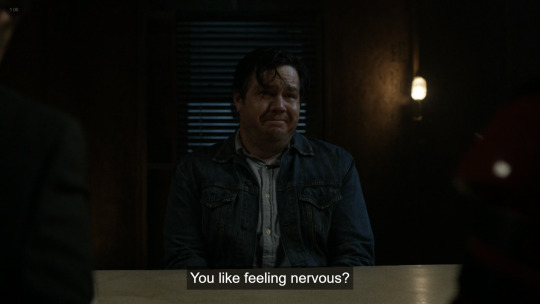
Again, on the surface it seems that they accept his explanation and just decide to allow them all in. All the stuff with the other three is just a misunderstanding.
But if “Stephanie” is a decoy, that can’t possibly be the case. I think Zeke and the others told Eugene the truth as they know it, but they’re all still being manipulated.
After Princess left to pee, the guy told Eugene no one was in the room and acted like he had no idea who Princess was. They were definitely using psychological torture on him, trying to break him.
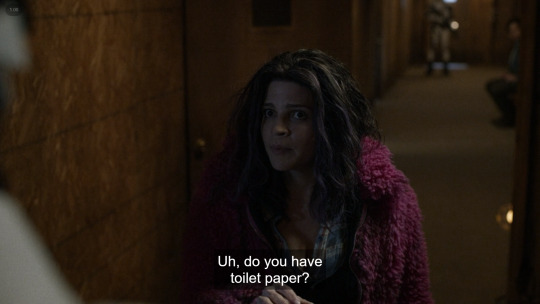
I think they know very well that Eugene's group is still lying about their settlement, and they're using a decoy "Stephanie" to find out the truth.
My point is that it goes back to the hallucination, making-someone-think-they're-crazy theme. It will be really interesting to see how this unfolds, because there's all kinds of psychological shenanigans going on here.
@galadrieljones made a really interesting connection some time ago. She noticed that back in 10x18, at Leah’s cabin, there is a metal, heart-shaped chair. The same chairs show up in the Commonwealth’s sales video from the trailer. So there’s some kind of link between Leah, Daryl’s memory of her, and the Commonwealth. We don’t know what it is yet, but all of this gives credence to the idea that she is either an outright hallucination, or Daryl is just remembering things wrong.
It also might mean that the Reapers are connected to the Commonwealth in some way. We don’t really know yet, but I’m having tons of fun trying to figure it out.
I want to touch briefly on the train car theme. Once again, there’s a parallel in both story lines (Terminus, and this one at the Commonwealth). Daryl’s group is in train cars this episode. And while Eugene’s group has been at a different compound, they started in the train yard and end in it here. But what I noticed is that Eugene enters the train car at the end, which is furnished inside, and finds his friends there. They all have a happy reunion.
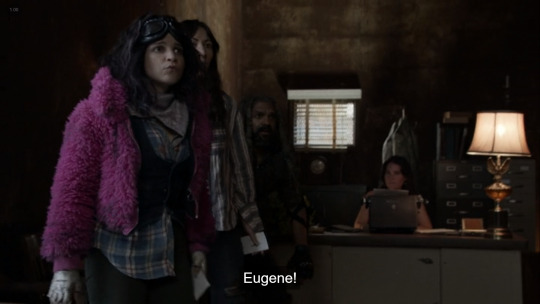
It made me think of the fact that when Rick, Daryl, Michonne, and Carl enter the train cars at Terminus, there is also a family reunion. What happened beyond that was not good or easy. Clearly, Terminus was not a good place. Many of them almost died at the trough and they had to fight their way out through a walker blood bath.
I’m just saying that, while it obviously won’t play out exactly the same way, something similar is probably waiting for Eugene’s group outside that train car. Not good.
Acheron Overall:
Okay, let’s get to the big cheese, here. The overall narrative. The template.
These two episodes are called Acheron part 1 and part 2. So here’s the skinny:
Acheron = Underworld. Daryl’s group going into the subway tunnels (dark, underground) is what constitutes Acheron and why the episodes are called that. That’s why, at the end of this episode, they emerge from the tunnels onto the surface (i.e. the living world).
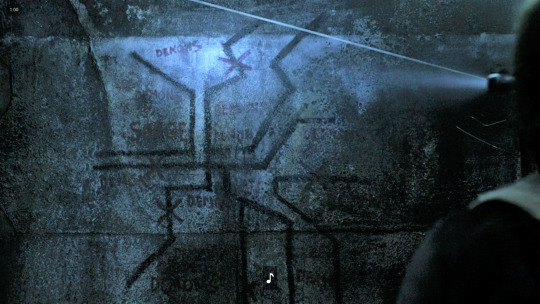
Given all the death, cemetery, and dark tunnel symbolism around Beth, given that she ventured into the land of the dead by being shot, maybe clinically dying for a time, and being thought dead for so long, what this tells me is that everything that happens in these tunnels is a foreshadow and template for what will happen this season.
I maintain that Dog = Beth and we will soon see something where Daryl hears something (not necessarily her; it was a man screaming so I still think it will be Rick he hears word of) and goes chasing after it. While searching for it, he stumbles across Beth. Then the two of them (both Dog and Daryl returned to the train car) go back in time to save TF from something.

This is most likely why the Roy thing is weird. In a super understated way, he represents Rick in the template. Daryl will find him, but only after he finds Beth. Even consider what Roy says. He says, “tell my kids I didn’t die a coward.” And that’s all well and good, but did we even know Roy had kids? No. Have we met them? No. But who has kids that Daryl IS concerned with? That would be Rick.
So I’m thinking that maybe when Daryl finds Rick, Rick will think he’s dying for some reason, and that’s why the dialogue here. But he won’t, which is why we see Roy with the group later.
And no, I’m not thinking that Roy dying via the Reapers will extend to Rick. It’s more like what they’ve done with countless characters that have been Beth proxies. Eventually, they kill them off. He’s a minor character they were using as a proxy, and when they are done with him in the narrative, he becomes walker chow. Or, in this case, Reaper fodder.
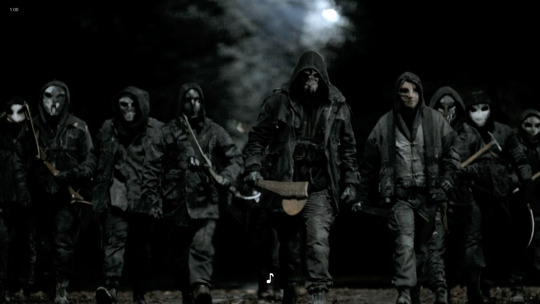
Anyway, I think everything will end up being a foreshadow for something. Maggie and Negan. The Gauge situation. All of it. I’ll try to keep coming back to this as the story progresses to show what everything foreshadows. I’ll stop there for today.
#beth greene#beth greene lives#beth is alive#beth is coming#td theory#td theories#team delusional#team defiance#beth is almost here#bethyl
23 notes
·
View notes
Text
I decided to take the personality tests for some Black Clover characters to see what they get, here are the results!
——————————
⚖️🔹Marx: Logistician ISTJ-T (Practical and fact-minded individuals, who’s reliability cannot be doubted)🔹⚖️
“My observation is that whenever one person is found adequate to the discharge of a duty... it is worse executed by two persons, and scarcely done at all if three or more are employed therein.”
Logisticians don’t make many assumptions, preferring instead to analyze their surroundings, check their facts and arrive at practical courses of action. Logistician personalities are no-nonsense, and when they’ve made a decision, they will relay the facts necessary to achieve their goal, expecting others to grasp the situation immediately and take action. Logisticians have little tolerance for indecisiveness, but lose patience even more quickly if their chosen course is challenged with impractical theories, especially if they ignore key details – if challenges becomes time-consuming debates, Logisticians can become noticeably angry as deadlines tick nearer.
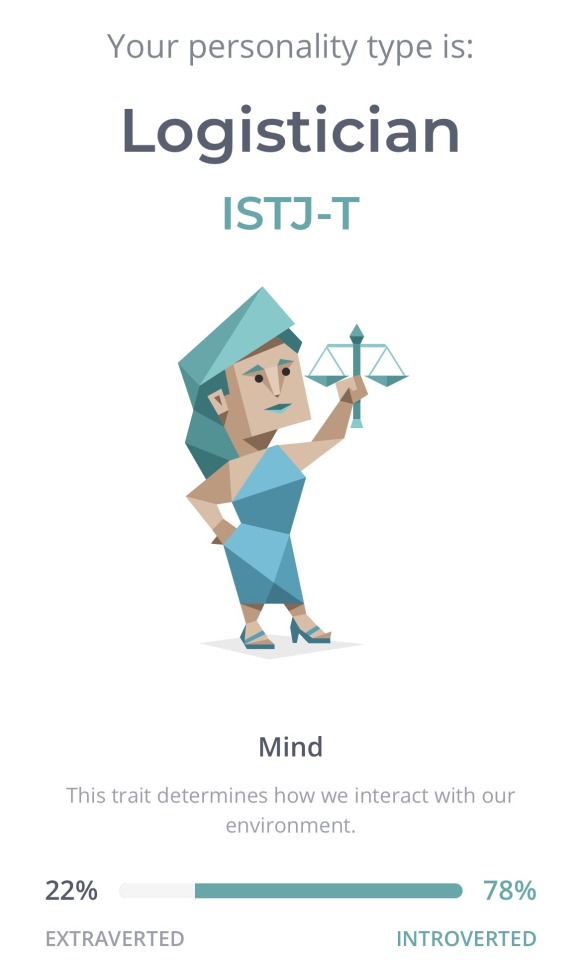
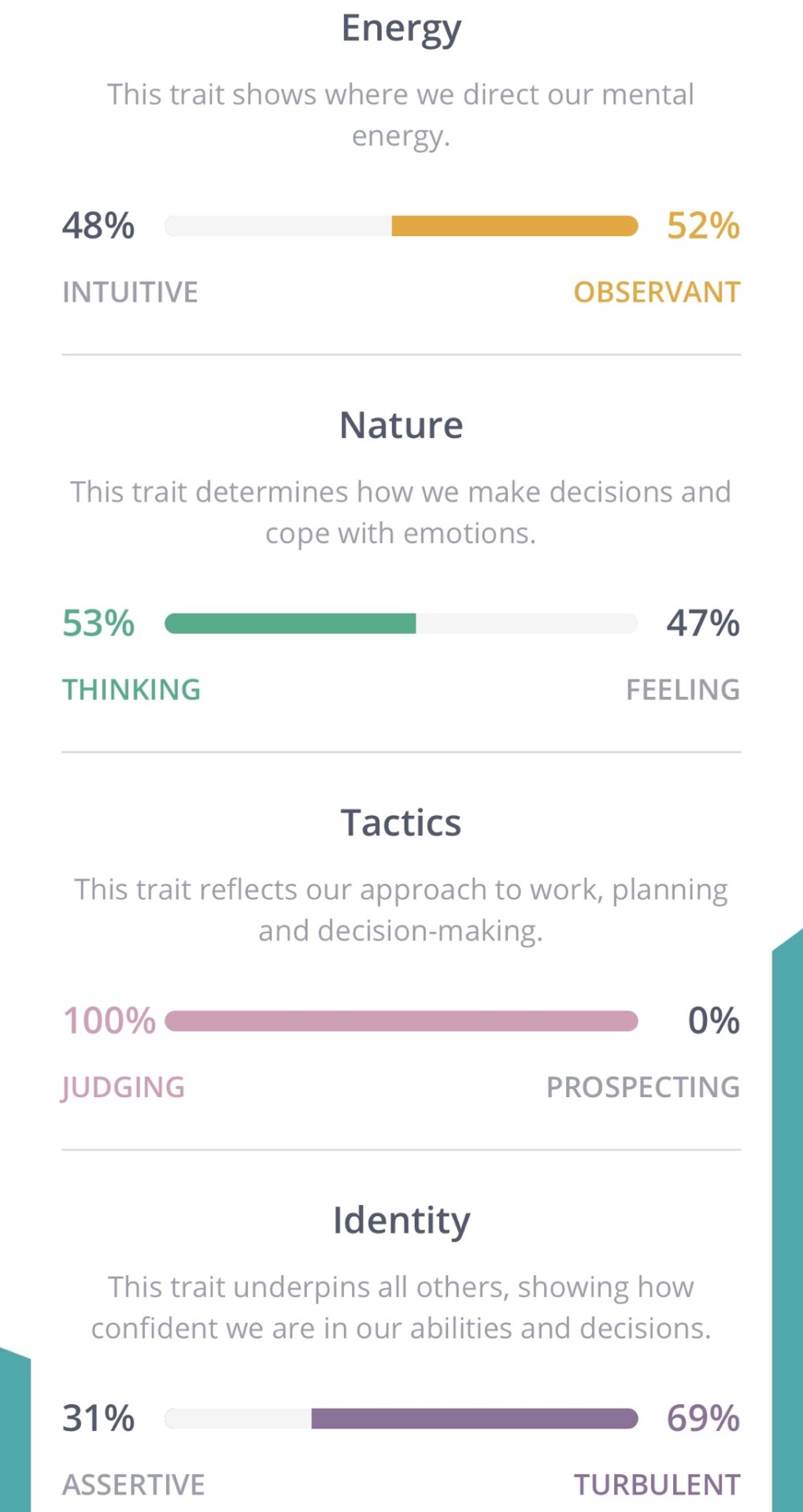
Logisticians have sharp, fact-based minds, and prefer autonomy and self-sufficiency to reliance on someone or something. Dependency on others is often seen by Logisticians as a weakness, and their passion for duty, dependability and impeccable personal integrity forbid falling into such a trap. When Logisticians say they are going to get something done, they do it, meeting their obligations no matter the personal cost, and they are baffled by people who don’t hold their own word in the same respect. Combining laziness and dishonesty is the quickest way to get on Logisticians’ bad side. Consequently, people with the Logistician personality type often prefer to work alone, or at least have their authority clearly established by hierarchy, where they can set and achieve their goals without debate or worry over other’s reliability.
Their defining characteristics of integrity, practical logic and tireless dedication to duty make Logisticians a vital core to many families, as well as organizations that uphold traditions, rules and standards, such as law offices, regulatory bodies and military. People with the Logistician personality type enjoy taking responsibility for their actions, and take pride in the work they do – when working towards a goal, Logisticians hold back none of their time and energy completing each relevant task with accuracy and patience.
Logisticians need to remember to take care of themselves – their stubborn dedication to stability and efficiency can compromise those goals in the long term as others lean ever-harder on them, creating an emotional strain that can go unexpressed for years, only finally coming out after it’s too late to fix. If they can find coworkers and spouses who genuinely appreciate and complement their qualities, who enjoy the brightness, clarity and dependability that they offer, Logisticians will find that their stabilizing role is a tremendously satisfying one, knowing that they are part of a system that works.
——————————
👑🟡Julius: ENFP-A Campaigner (Enthusiastic, creative and sociable free spirits, who can always find a reason to smile.) 🟡👑
“It doesn’t interest me what you do for a living. I want to know what you ache for – and if you dare to dream of meeting your heart’s longing.”
Campaigners are true free spirits – outgoing, openhearted, and open-minded. With their lively, upbeat approach to life, they stand out in any crowd. But even though they can be the life of the party, Campaigners don’t just care about having a good time. These personality types run deep – as does their longing for meaningful, emotional connections with other people.
Even in moments of fun, Campaigners want to connect emotionally with others. Few things matter more to these personality types than having genuine, heartfelt conversations with the people they cherish. Campaigners believe that everyone deserves to express their feelings, and their empathy and warmth create spaces where even the most timid spirits can feel comfortable opening up.
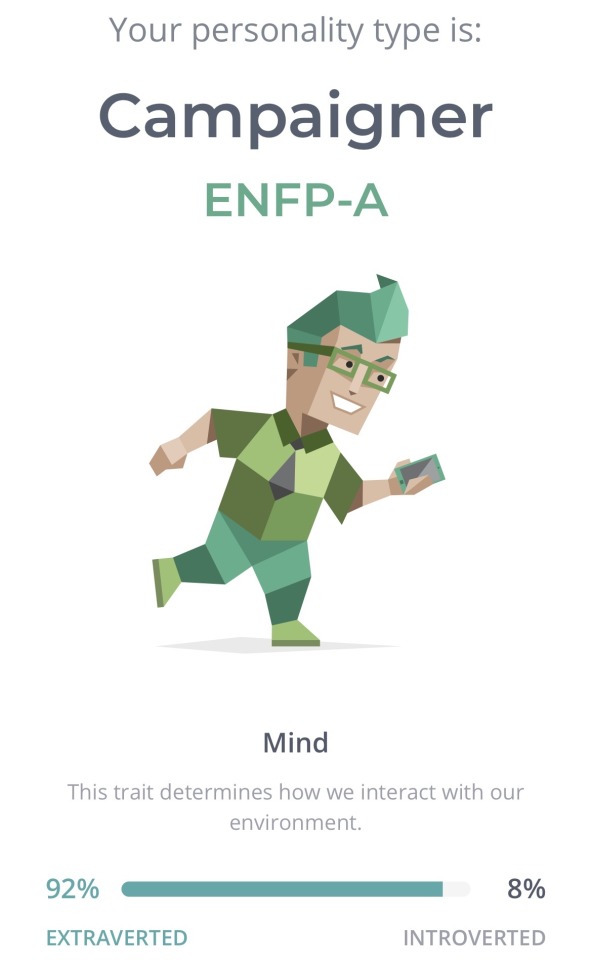
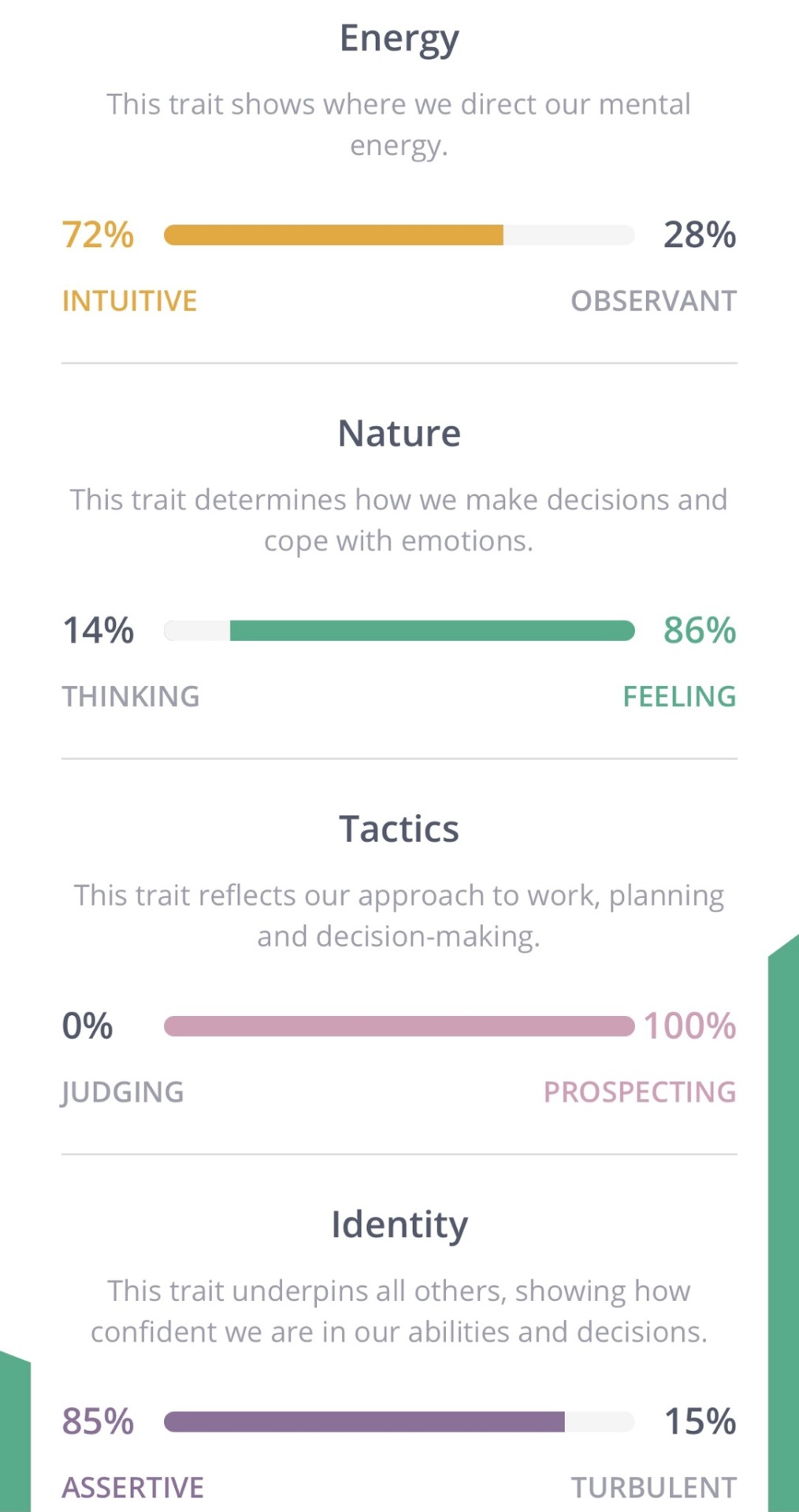
Friendly and outgoing, Campaigners are devoted to enriching their relationships and their social lives. But beneath their sociable, easygoing exteriors, they have rich, vibrant inner lives as well. Without a healthy dose of imagination, creativity, and curiosity, a Campaigner simply wouldn’t be a Campaigner. In their unique way, Campaigners can be quite introspective. They can’t help but ponder the deeper meaning and significance of life – even when they should be paying attention to something else. These personalities believe that everything – and everyone – is connected, and they live for the glimmers of insight that they can gain into these connections.
When something sparks their imagination, Campaigners can show an enthusiasm that is nothing short of infectious. These personalities radiate a positive energy that draws in other people, and Campaigners may find themselves being held up by their peers as a leader or guru. But once the initial bloom of inspiration wears off, Campaigners can struggle with self-discipline and consistency, losing steam on projects
——————————
🌱⚪️William: Advocate INFJ-T (Quiet and mystical, yet very inspiring and tireless idealists.)⚪️🌱
“Treat people as if they were what they ought to be and you help them to become what they are capable of being.”
Advocates’ unique combination of personality traits makes them complex and quite versatile. For example, Advocates can speak with great passion and conviction, especially when standing up for their ideals. At other times, however, they may choose to be soft-spoken and understated, preferring to keep the peace rather than challenge others.
Advocates might find themselves feeling especially stressed in the face of conflict and criticism. These personalities tend to act with the best of intentions, and it can frustrate them when others don’t appreciate this. At times, even constructive criticism may feel deeply personal or hurtful to Advocates.
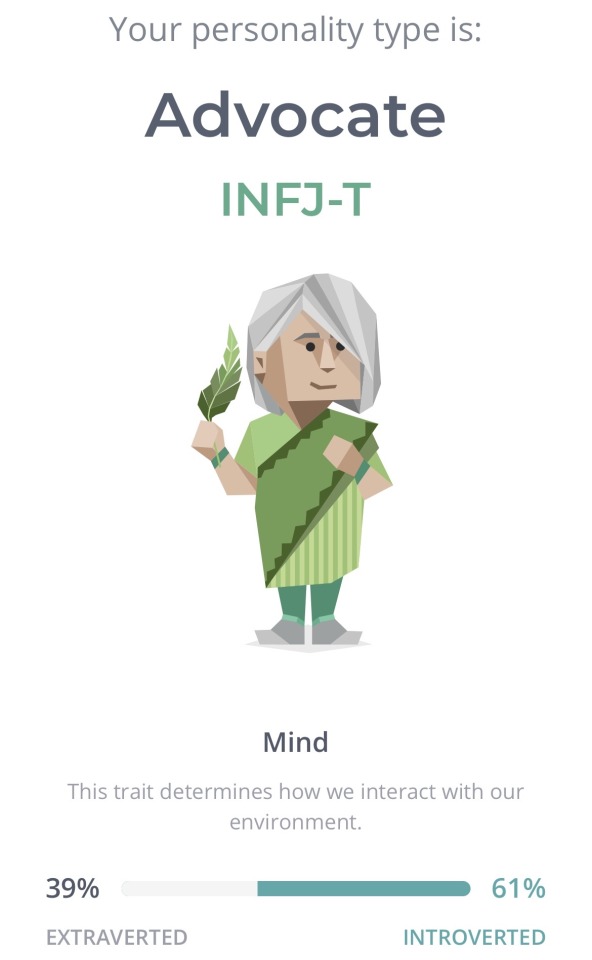
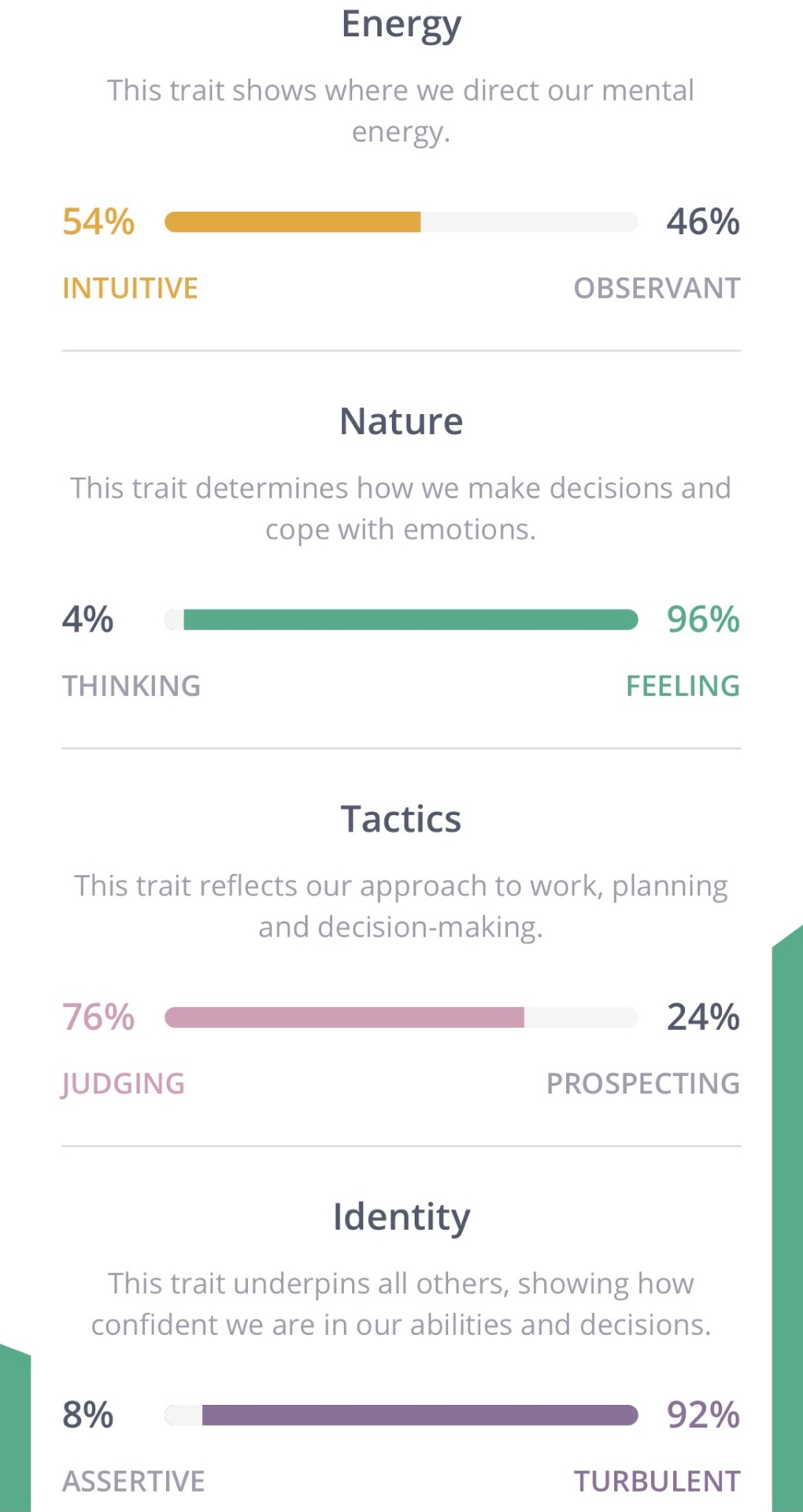
Advocates may be reserved, but they communicate in a way that is warm and sensitive. This emotional honesty and insight can make a powerful impression on the people around them. Advocates value deep, authentic relationships with others, and they tend to take great care with other people’s feelings. That said, these personalities also need to prioritize reconnecting with themselves. Advocates need to take some time alone now and then to decompress, recharge, and process their thoughts and feelings.
Advocates may see helping others as their purpose in life. They are troubled by injustice, and they typically care more about altruism than personal gain. As a result, Advocates tend to step in when they see someone facing unfairness or hardship. Many people with this personality type also aspire to fix society’s deeper problems, in the hope that unfairness and hardship can become things of the past.
Many Advocates feel compelled to find a mission for their lives. When they encounter inequity or unfairness, they tend to think, “How can I fix this?” They are well-suited to support a movement to right a wrong, no matter how big or small. Advocates just need to remember that while they’re busy taking care of the world, they need to take care of themselves too.
——————————
🍺⚫️Yami: Entrepreneur ESTP-A (Smart, enthusiastic and very perceptive people, who truly enjoy living on the edge.)⚫️🍺
“Life is either a daring adventure or nothing at all.”
Entrepreneurs are the likeliest personality type to make a lifestyle of risky behavior. They live in the moment and dive into the action – they are the eye of the storm. They are forced to make critical decisions based on factual, immediate reality in a process of rapid-fire rational stimulus response. This makes school and other highly organized environments a challenge for Entrepreneurs. It certainly isn’t because they aren’t smart, and they can do well, but the regimented, lecturing approach of formal education is just so far from the hands-on learning that Entrepreneurs enjoy. It takes a great deal of maturity to see this process as a necessary means to an end, something that creates more exciting opportunities.
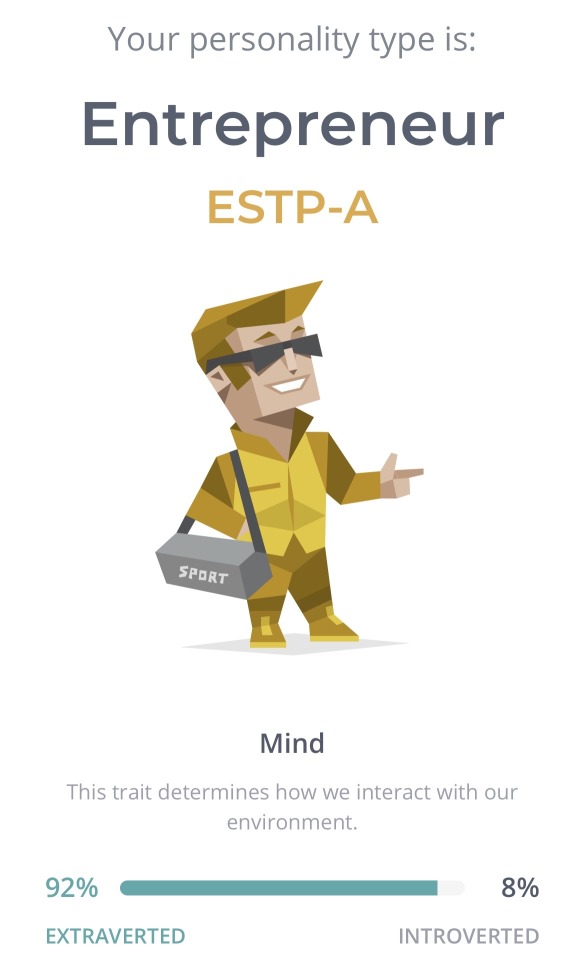
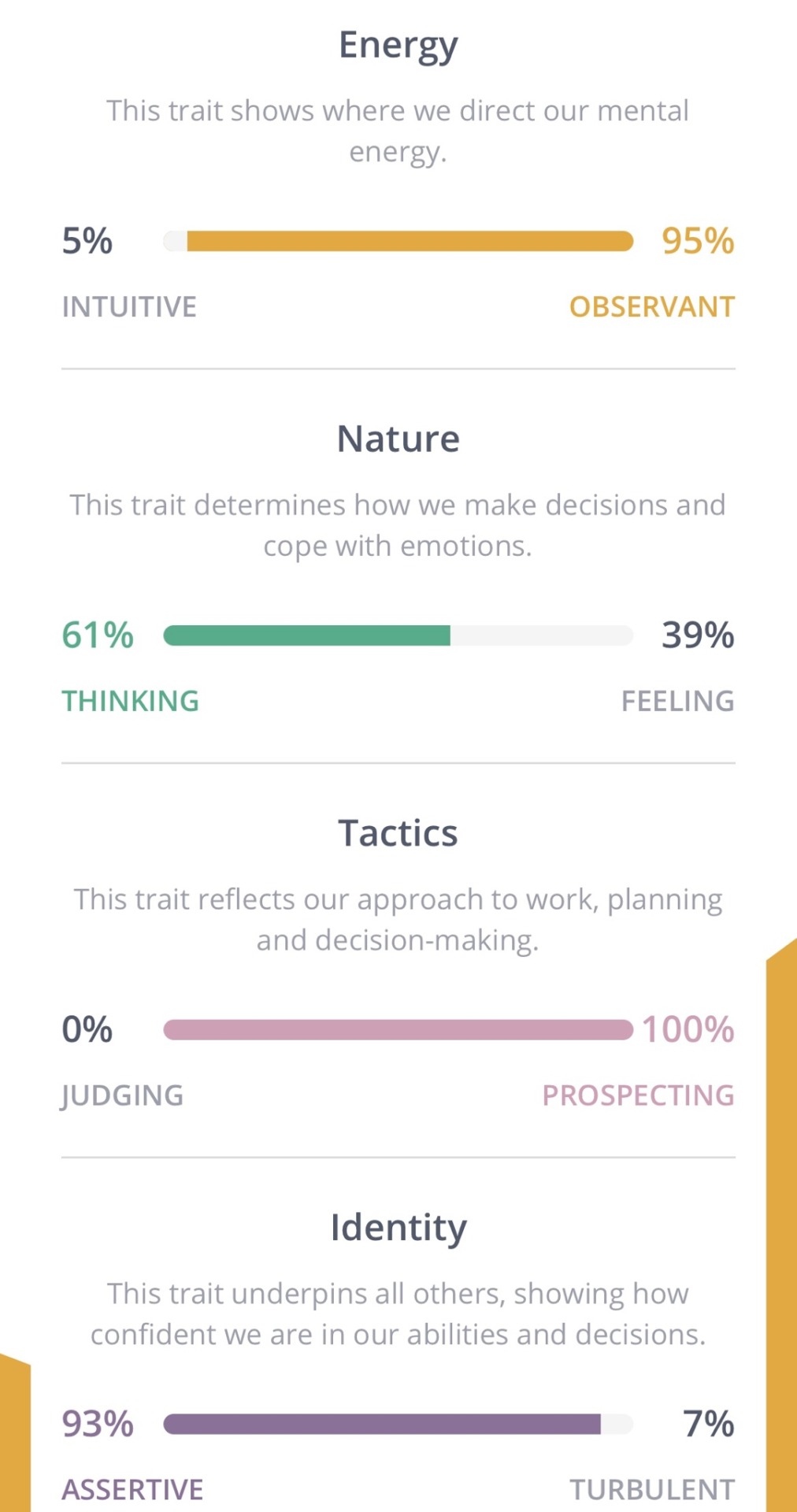
Also challenging is that to Entrepreneurs, it makes more sense to use their own moral compass than someone else’s. Rules were made to be broken. This is a sentiment few high school instructors or corporate supervisors are likely to share, and can earn Entrepreneur personalities a certain reputation. But if they minimize the trouble-making, harness their energy, and focus through the boring stuff, Entrepreneurs are a force to be reckoned with.
With perhaps the most perceptive, unfiltered view of any type, Entrepreneurs have a unique skill in noticing small changes. Whether a shift in facial expression, a new clothing style, or a broken habit, people with this personality type pick up on hidden thoughts and motives where most types would be lucky to pick up anything specific at all. Entrepreneurs use these observations immediately, calling out the change and asking questions, often with little regard for sensitivity. Entrepreneurs should remember that not everyone wants their secrets and decisions broadcast.
Entrepreneurs are full of passion and energy, complemented by a rational, if sometimes distracted, mind. Inspiring, convincing and colorful, they are natural group leaders, pulling everyone along the path less traveled, bringing life and excitement everywhere they go. Putting these qualities to a constructive and rewarding end is Entrepreneurs’ true challenge.
——————————
If you want to read more about their personality types, or other personality types- the website is 16personalities.com ! I find it very amazing at how accurate these are!
40 notes
·
View notes
Text
CTA: Hopper
CTA is short for Cognitive Task Analysis. It's essentially a method of unravelling the inner workings of a person's mind and seeing how their thoughts affect their actions.
I'm starting with Hopper -- obviously -- because he isn't given much, if any, backstory in the entire movie. His actions were written purposefully for the audience to not feel any remorse for his demise. If he had been given a backstory, there would probably be more people who could defend his actions, which isn't what the directors wanted.
However, just by analyzing his dialogue and actions -- no matter how small of screen-time -- we can get a rough sketch of his true personality.
I've spent the last hour completing the 16Personlaties test online and reading through the results. For those of you who aren't familiar with it, it's a website that has you go through a series of questions and by the end of it presents you with whichever personality type your responses most align with.
To the best of my ability, I have gone through each question and replayed Hopper's scenes in my mind to get a feel of how he would've answered them. The results showed him to be an ISTJ-A.
I = Introverted (52%)
S = Observant (95%)
T = Thinking (98%)
J = Judging (78%)
A = Assertive (69%)
I'll put a link to the website at the end of this post so any of you who are interested can read through it. This will also be the site I use for the other characters I analyze.
So since the link is available -- and the personalities can be read about, anywhere -- I will give my reasoning for how the result above fits his character.
BY THE WAY, NONE OF THIS IS CANON. I AM NOT STATING FOR A FACT THAT THIS IS HOPPER IN HIS ENTIRETY. IT'S ALL SPECULATION DRAWN FROM SMALL AMOUNTS OF EVIDENCE.
First off, let me brag on him for a moment for his incredible work. I know he's the bad guy and all, but let's give the man some credit. Only extremely powerful people in human history were able to convince a whole nation of people that they were in the right. Hitler, being one of those people.
While Hitler obviously did unforgivable things, everything he did was done thoughtfully and carefully. He analyzed the people, the children, and understood how their minds worked. This is what Hopper does in the movie.
By the time we are invited into this world, Hopper has already established a system within the colony. Despite not holding any true authority in their own monarchy, he had managed to set himself above the Queen. Even she is in fear of his capabilities and fights to keep him appeased.
He also manages to uphold his authority within his own gang. The fact that none of them -- aside from Molt -- have the boldness to question his decisions speaks volumes about how assertive he is.
But the only way he can keep his position is by applying his cognitive talents. We see in the movie that Hopper doesn't take the details for granted. He remarks that Atta didn't smell like the Queen -- implying he took note of which ant was in leadership. When he first lays eyes on Flik, he watches the ant's demeanor and takes in every detail. This allows him to recognize Flik when he reveals himself from the fake bird near the end of the movie. When the Circus Bugs arrive while Hopper is at Ant Island, he notices the empty box by the end of their act and demands to know where the Queen is.
We can even see that in almost every scene he is in, he does more observing than talking. In the beginning, he walks around and takes note of the ant's countenance around him, looking for any sign of rebellion as the source of his missing offering. He watches Atta carefully as she tries to explain that Flik is the reason it's missing. After punching the random gang member instead of Molt, he looks around at the colony to take in their reaction and adjusts himself accordingly. When Molt comes to tell him his "great idea," Hopper doesn't immediately rant off. Instead, he watches his brother carefully as he advances and takes in the sincerity and fear of Molt explaining himself.
As he walks around The Resort, addressing his gang, his eyes are pinpointing every grasshopper until they land on the three at the bar. He makes offhanded remarks and observes how the three react suspiciously overly supportive. By the time he lets them have it, he watches the grain fall and proceeds to keep his eye on every member as he makes his speech. When they get to the Island, Hopper manages to pinpoint the Queen in the midst of the crowd of ants. As the Circus Bugs first reenter the scene, Hopper silently follows his gaze as they pull up in front. Not once does he say a word until they make themselves fully shown. When the pill bugs appear, he watches them for a good while before finally allowing the Circus Bugs to entertain them.
Throughout their performance, Hopper is silently watching -- maybe laughing once during the entire ordeal. You can especially see it when Manny offers to let the Queen be a part of the performance and Hopper follows his every move as he does so.
As he gives his speech to the ants, he walks around and makes it a point to make eye contact with as many as he can. He observes their gradual return to submission. When Flik speaks up again, Hopper does not yell, summon Thumper, or try to interrupt him at all. He advances -- like he did Molt -- and observes how the ant will react to his closing proximity. It's almost as if he's gauging how much damage has been done to his influence before he decides on which course of action to take. In fact, for the remainder of the movie, Hopper maintains this way of decision-making. While in the canon, he's keeping his eye on Flik. When it rains, he pinpoints Flik in the crowd.
When he lands in front of Flik by the bird's nest, he begins advancing again and uses that time of observation to unsettle the ant. While Hopper uses analyzation as a way to base his decisions, he also uses it as a way to unsettle his opposition. In nearly every situation he quietly observes, the adversary becomes nervous and backs away. They mess up on their train of thought, try to explain themselves, or beg for mercy. It's more than Hopper looking intimidating, it's the way he looks at them to make them feel transparent. As if he knows every little thing about them, and in a way, he kind of does from the time he's observed.
The only hole in this is when the real bird finally makes an appearance and Hopper is so caught up in his rage of the previous bird that he neglects to fully analyze the creature before him. Of course, let's also take into account that he is blind in one eye, it's dark and raining, and his perception of reality has been slightly altered thanks to the fake bird from earlier. In his defense, he had good reason to believe the bird before him was also a fake.
His observations play hand-in-hand with his tendency to base his decisions on rationality rather than emotion. As well as being more judging than perceiving. For the record, the word "judging" in this sense is not used in a social manner. It is being able to make faster-paced decisions and to stick by them. People who are judging will be clean-cut and look presentable to others as a means of influencing others to agree with their steadfast decisions.
As also mentioned, Hopper does not act on his emotions. You can base an alternative opinion saying, "Oh, but he gets mad and threatens his brother," or, "what about when he killed those three grasshoppers?" and so on. However, acting on your emotions and acting on rationale are two different things. They look different too.
Consider this: had Hopper, the moment Molt opened his mouth, yelled or swung a punch at him, then he would then have acted on his emotions. Had he outright put those three grasshoppers in their place instead of going through the foreplay, he would have acted on his emotions. Flik was also not immediately killed when he first spoke up and when he continued to defy Hopper. Even at the end of the movie, when the real bird appears, Hopper halts his strangling long enough to realize that the bird is real.
After re-watching the movie with these characteristics in mind, it doesn't seem like there is one time where he acts on his emotions. Impulsively, is one way to put it. He never acts on impulse. Every move is calculated according to how he needs the situation to play out in his favor. Perhaps the only time he acts on emotions is when he punches the nearby grasshopper instead of his brother. And, even then, he lets enough rationality in to redirect his anger onto someone else.
Now let's dive more onto the hidden side of Hopper the movie doesn't shed much light on.
Despite giving off this hard, rough exterior, we know that the gang he surrounds himself with was on purpose. While he probably gathered them for the sake of enforcing the ants more into submission, I think it might be safe to say that they're there for his own mental stability. Let's be clear, Hopper doesn't need them to accomplish his goals. Flik doesn't spare a glance at the other grasshoppers once Hopper comes into the hill. All eyes are on him. Even when Hopper has taken control of the Island, Atta and Phyllis are constantly glancing to see his reactions.
It's especially significant when Atta notices Flik and the girls climbing the tree to the bird and the only grasshopper she looks at to see if they noticed is Hopper. Because in the grand scheme of things, his awareness of the situation is what will make or break their plan.
Notice with me too that the other gang members have the IQ of a rock. Any opinion they have is shown to be based on little to no evidence. And although they were on the right track to not go back to the Island -- which ends up being one of Hopper's downfalls -- they didn't necessarily understand the true power the ants could have over them. Basically, their desire to stay the The Resort was not based on truth but more their own personal wishes.
Personally, I believe that Hopper only keeps them -- and Molt -- around for the sake of keeping himself distracted. With his observations, it can be seen that he does more time thinking rather than acting. Imagine having a whole colony under your control and your mind running 24/7 to maintain that power. Imagine how stressful it has to be for him to know that in a single instance, all that work he put into molding the colony could be in vain. No wonder he needs some time alone for a massage.
But then imagine having others around you to keep your mind off of those stressors and anxieties. With the gang partying and having a good time, it would be hard for Hopper to dwell on all the ways everything could go wrong. I believe that's why he keeps Molt around. Hopper never said he promised their mother he'd let him join the gang, or that he'd watch him 24/7. He merely stated he promised not to kill Molt.
Molt is simply that happy-go-lucky persona that Hopper can not only release his stress on, but also someone who can distract him from everything storming within his own mind. It may seem in the movie like he's a lazy freeloader who uses the ants to avoid doing any work himself, but let's look at it this way:
> He's "babysitting" his brother constantly
> He has to travel a great distance back and forth at least once a year for the offering
> In that little time he sees the colony, he has to assert his authority to keep them obedient
> He has to keep his own gang members submissive
> It seems that he also runs (or at least co-runs) The Resort
> Just as all insects do, he has to protect himself, his gang, and his brother from bigger predators
Most of these have a lot of psychological weight that would wear Hopper out with all the stress it adds on to him. There's so much responsibility that has not only been forced on him, but also ones he's chosen to take. And some of those responsibilities were chosen for the sake of distracting him from everything else. It's a vicious cycle that he's gotten caught in where he ends up putting more on his plate than he can handle, all in a vain attempt to have something to redirect his attention from his other anxieties.
Hopper has a very self-destructive mindset in this term. It ends up getting to the point where, by the end of the movie, when everything begins to unravel before him, his anxieties kick in and he doesn't know how to handle it. He's spent so long trying to avoid those fears that he never established an escape for them other than the other self-destructive behaviors. He never found the right way out of his own torment.
In reality he influenced himself to be subdued just as much as he had the ants. He has convinced himself that he is weaker when mulling over his anxieties and letting his emotions get out of control. Therefore, he's put chains on them and has put an emotional muzzle on himself. And all of it is in an attempt to stay rational and maintain his position. In a way, Hopper has become so skilled at overpowering others that he has subconsciously overpowered himself. He's convinced himself that he is who he wants to be. He wants to be in control, calm, collected, strong, and powerful. And he has convinced himself to believe that he can be all those things so long as he pushes back the characteristics and emotions that would hold him back.
And he reflects this inner pain on the ants as he convinces them to be what he wants them to be. Submissive, mindless, fearful, and obedient. And so long as he pushes back the ideas and rebellion, they can be all those things.
If any of you want me to continue this analysis -- God knows there's still more to unpack about his personality -- feel free to ask! I will be doing the other characters (Flik is next).
Here is the link to the website I used:
https://www.16personalities.com/istj-personality
#a bugs life#CTA#personality analysis#hopper#psychology#pixar#ISTJA#analysis#hopper is a very complex person#this was so fun to do tho#briggs personality types
7 notes
·
View notes
Note
Id like to hear you talk more about your thoughts on s2 of the punisher bc it also made me very upset
I’m honestly surprised anybody cares about my opinion because my fics are, in my estimation at least, rather out of character. I also don’t generally dive deep into the storytelling elements themselves, I’m more interested in exploring stuff in fic than analyzing the show so forgive me if I sound stupid.
Also if anyone sees this and doesn’t agree, that’s fine. I’m not trying to say anyone is or isn’t right, this is just how I feel. Definitely feel free to ignore this.
Disclaimer: I have only actually watched four episodes of the season but I do know most of the plot and basically the reason I couldn’t bring myself to watch the rest was because I really didn’t want to be disappointed in it even more? I don’t know. It’s probably dumb but anyway.
A lot of the reason I didn’t like the second season is basically because I felt like the characterizations themselves made little sense based on what happened in s1. I felt like a lot of what I loved about Frank’s character basically wasn’t there in s2 and I didn’t like how the things his character was really built on seemed to be gone. He was convinced he was never gonna be anything more than a killer and that no matter what, he would never be happy because he didn’t know how to live any other way. That’s not the impression I got with the end of the first season.
Everyone who knows my blog knows I love Frank/Billy but I definitely don’t think Frank/Karen wasn’t worth pursuing because I knew there was no way Brank was ever gonna be canon no matter what I thought or would’ve done. It seemed like thanks to his whole insistent on not being able to essentially have anything resembling a normal life in any form, his potential with Karen, someone who he really cared for and valued and who felt the same for him, was sort of wasted because it would have thrown off the whole lone wolf sort of vibe.
As for Billy, the whole thing with Krista made my skin crawl on principle. Not only did it seem like a waste of his potential, I felt like the character herself was rather dumb. She seemed pretty unneeded. I felt like forcing the sexual element somehow made it worse? Maybe if that wasn’t included I would feel different but that really skeeved me but maybe that’s me projecting.
As for Billy himself, I felt like, first of all, how his scars were done was rather underwhelming and considering what happened to him, almost not believable if that makes sense. Like we saw him spit of a bullet, get his face smashed repeatedly into a mirror and then racked across broken glass so the scars didn’t seem like they lived up to what one would expect from trauma like that. Like I understand Ben is incredibly handsome and that, I assume, was a reason he was cast in the first place but that doesn’t mean they needed to half ass the scars. Losing his outward appearance had to have been devastating but the minimal scarring didn’t back up how much he would hate looking in the mirror considering how important his appearance was to him before. I also think fucking up his face more would have added intimidation or some sort of element that would have made the trauma itself more real and visceral.
Like I said, I know Frank/Billy was never gonna happen but…I don’t know. Again, I felt like there was a lot of wasted potential of exploring more of their dynamic and we did get the flashbacks or whatever, but I feel like mostly Frank’s feelings about Billy being alive and his subsequent escape were rather muted, again going back to that almost cold sort of detached demeanor he had, at least in regards to Billy. I know he showed some affection to others but it felt like Billy, this person who was so deeply a part of his life who betrayed him, didn’t really effect him as much as I would’ve liked. Like…when he kills him, Billy is more upset than Frank. It’s like it really doesn’t mean a whole lot to Frank one way or the other. It’s just something to be done.
I also didn’t like the fact it wasn’t really even acknowledged from Frank that Billy didn’t even remember what he did. I know Frank is trained to be ruthless and remove his feelings and whatever, but I definitely feel like that should have made him feel something. It’s one thing to take out someone who is evil and you never knew personally but given Frank’s characterization in the prior season, I felt like that should’ve played into it more. In the end, I felt like his reaction and feelings about Billy and his actions seemed unrealistic.
And not to repeat myself, but I really hate the Krista thing. I had no desire to see her or for her to have a backstory. She was a waste. I also felt like Madani had to have had some sort of brain injury as well from the bullet she took at the carousel considering something similar happened to Frank and I know he has to have some sort trauma related to that whether he would want to admit to it or not.
But yeah. This all probably makes zero sense and is probably off base or maybe not even correct about certain things considering I haven’t seen the whole season, but I really did not like what I did see to want to watch more. I loved the first season so much so I just didn’t have the heart to watch more knowing both deep down and from friend’s comments that I would just be disappointed. I’m probably a baby for that but it’s true.
If I had my way, Frank/Billy would somehow be canon and shit would have been handled a lot differently. But I doubt that was or ever will be something people would have wanted to see. I don’t think the ship was popular even when the show was on but I didn’t discover my love for it until my second or third rewatch of the first season a while after it came out so I’m not sure.
Anyway, I’m just gonna keep writing what I’d like to see, which will probably be OOC stuff with gratuitous smut and copious amounts of romantic sweet nonsense because that’s all I know how to do and what I really like reading and writing about. Maybe if I was a better and more well rounded writer it would be different but who knows. I’m just happy to live in the little universes I’ve created with Brank and with them and my OC so I can write what my hopeless romantic heart wants to see and be happy with it.
#this was long winded and probably dumb but 🤷🏻♀️#if you read all this I’m sorry but thank you for asking nonetheless#I hope this is at least somewhat the type of answer you were looking for?#answered#anonymous#the punisher#frank castle#billy russo#brank
9 notes
·
View notes
Text
What I Thought About The Falcon and the Winter Soldier
Salutations to you, random people on the internet who most likely won't read this. I am an Ordinary Schmuck. I write stories and reviews and draw comics and cartoons!
Gonna be honest, I didn't think The Falcon and the Winter Soldier needed to be a full-length TV series. I mean, if Spider-Man can discover that he didn't have to replace Iron Man in a two-hour and nine-minute long movie, then the Falcon can learn he can't replace Steve Rogers in the same amount of time, right? I was excited, don't get me wrong, but I didn't know how they can fit a plot for a movie into a six-hour-long series. Unlike WandaVision, which needed to be a TV show to get those TV homages right for each episode, The Falcon and the Winter Soldier didn’t sound like something that would honestly work better as a film. But, once it started airing, and my excitement increased each week, I can positively say that it would not have worked as successfully if it wasn't a TV series.
Unfortunately, I'll have to get into spoilers to explain why, but trust me when I say that if you haven't checked it out yet, you definitely should. Because I'm about to dive in (or fly in) as I explain why The Falcon and the Winter Soldier is easily in the top tier MCU projects.
WHAT I LIKE
Sam Wilson: If WandaVision was about developing Wanda, then The Falcon and the Winter Soldier is about developing Sam. He might share the spotlight with Bucky, but this is so clearly Sam's story. It's his journey of becoming the new Captain America that gets more of a focus, and it is one of the best aspects of the series. And as I said, it's similar to Spider-Man's journey in Spider-Man: Far From Home. Sure, this time, it's more about stepping up to the mantle, but both Sam and Peter have to learn how to be their own hero rather than replace the one left behind. In Sam's case, it's more than just being the new Captain America, but also being the black Captain America. I'll talk more about the implications of that later, but for now, all I'll say is that it was so engaging seeing Sam accept his role. Plus, even though Sam tries to carry Steve's title, that doesn't mean he's Steve Rogers 2.0. He has his own ardor and personality as Captain America, on top of still representing the aspects of what that title entails. Partial credit for that goes to Anthony Mackie, who does a phenomenal job of portraying a man who's inspirational and charming in all forms of hell. I'd salute him as much as I'd want to have a beer with him...except not really because I refuse to touch a single drop of alcohol. But Sam Wilson would make me consider it! Because he's that good of a character.
Bucky Barnes: Much like Vision in WandaVision, Bucky takes the sidelines as Sam acts as the main face of the series. Unlike Vision, however, Bucky's story seems more like its own thing rather than something that's connected with his co-star. In a way, it's better, but it also seems worse. Because without having it be locked with Sam's story, Bucky's is still compelling as it develops him further in his own way. His journey may not be as engaging as Sam's, but it's still entertaining enough to watch his own narrative get continued in small spurts. Although, the fact that Bucky's story has little to do with Sam's does have the unfortunate side-effect that he doesn't need to be there. His inclusion is very much welcomed, but I feel like Bucky dealing with his own guilt and trauma as the Winter Soldier could be something that can fill up its own series rather than half of one. That being said, Bucky absolutely needs to be in this show. The emotional turmoil that Sabastian Stan portrays so well hits hard, and his dry humor works for some comedic highlights. Bucky's half of the story might be unnecessary for plot reasons, but it is unquestionably necessary for enjoyment.
There’s a lot of talking: This seems like a misstep, especially since most superhero shows are bogged down by characters talking to pad out the run time. Although, the dialogue in The Falcon and the Winter Soldier is more like the dialogue in the series Daredevil. There are more words than action, but nearly every line is so incredibly engaging that I do not care. Sam and his sister talking to a banker about getting a loan might not sound as entertaining as Sam being in an air chase against terrorists, but I surprisingly held onto every word being said due to how well-acted it was. Plus, these discussions help make these characters more human on top of making the world feel believable. I understand the argument of show don't tell, but to me, as long as the dialogue is written well enough and said convincingly, I can learn to live with it.
The Flag Smashers: The concept of the Flag Smashers intrigues me. The idea that a group of people believes things were actually better when half the world got turned to dust is a perfect concept for the MCU to explore. In fact, this is the third story in a row that dives deep into the consequences of what happened post-Infinity War and Endgame, and I'm all for it! The universe is forever changed by this one big event, and it's not going to be irrelevant anytime soon. For the Flag Smashers, they offer the most striking glimpse of how the world is forever changed. Now, I'll admit, after seeing doom and gloom in Avengers: Endgame, it would be better to see the benefits of the Blip that characters claim to have existed rather than told about them. But seeing how there were dozens of fans who made the audacious claim that Thanos was right, I don't consider it too far of a stretch to believe that the Flag Smashers could exist. Especially since the arguments that characters present do seem persuasive enough. It's only the actions that the group makes that derail any sense of the discussion. But in a good way...for the most part. But I’ll get into that later too.
The Reveal of the new “Captain America”: This was the dirtiest, sickening punch in the gut that the first episode could have ended on...and I love it!
John Walker: I often find the best antagonists are the ones I'm willing to psychologically analyze. That's John Walker in a nutshell. He is an arrogant ass who deserved to get slapped around when taking things too far. Yet, I always find myself coming back to those scenes where he seems conflicted about becoming the new Captain America. I get a sense that he genuinely wants to do the right thing and those moments when he asks if he is all but confirms it. John's problem is the constant support he's given by his friends. I'd argue that building his ego is the very reason why he gets frustrated so quickly by people denying him, as he often reacts like a toddler who throws a tantrum when a parent makes the "mistake" of saying “no.” This is why it's satisfying seeing people more powerful than John kick the s**t out of him because it results in his ego going through a well-needed deflation. Still, the constant frustrations he has for not being respected as the new Captain America makes his further descent into insanity all the more appealing to watch. Because him taking the super-soldier serum proves Dr. Erskine's theory is true: "Good becomes great. Bad becomes worse."
...And this is why the writers dropped the ball when trying to make John Walker redeemable. It's exceptional if that was the intention. After all, I did say there were glimpses of a man who wanted to become great, not worse. However, given what John does in later episodes, we're going to need more than glimpses to believe his switch from bad to good. Especially since his decision to set his anger aside to suddenly help people is a little too unbelievable for my tastes given how fast it happens. It's not an awful decision. It's just one that needed a bit more polish. I still find John Walker an incredible character regardless, but I don't blame people for being a tad more hesitant given how poorly paced his redemption arc came across as.
Readapting “Star-Spangled Man”: I adore this for two reasons.
Reason #1: It's a solid callback to Captain America: The First Avenger, which I will always stand by as my favorite Captain America movie.
Reason #2: It proves how much John Walker doesn't understand what it means to be Captain America. When Steve did this song and dance routine in his movie, he hated it. Better yet, Steve despised it. Because he wasn't helping anybody. He was just being a dancing monkey to appeal to civilians, and you see how much he regrets doing it with each show. For John, he relishes the whole thing, because of course, he would! John loves having his ego appealed to, and this routine is doing nothing but inflates it. It's a solid case of visual storytelling to prove to the audience just how disconnected John is from being Captain America. Steve or Sam wouldn't have done this, because being a hero is more than respect and adoration. It's about actually doing the right thing. A lesson that John desperately needs to learn.
Sam’s and Bucky’s bromance: You remember how I said that Bucky's dry sense of humor can be a comedic highlight? Well, that's only second rate to the times he and Sam bicker like an old married couple. Whether it's because of the writing, directing, or Makie’s and Stan's natural chemistry, seeing Sam and Bucky interact with each other is always a blast to see. And on top of being funny, there are these well-handled moments of drama shared between both characters that make their relationship convincing. It's why you can't have this series without Bucky, despite it so clearly being Sam's story that gets the more focus. Because without either character, we would miss out on some entertaining interactions that I wouldn't trade for anything else for this series.
Isaiah Bradely: Well, this character was a pleasant surprise. Although, "pleasant" might not be the right word because every scene with Isaiah is absolutely gut-wrenching in all the right ways. Carl Lumbly gives a phenomenal performance for a character that has been beaten down, with very little hope he has for any change that matters for his race. Plus, his backstory may not be as unbelievable as you might think. Between 1932-1972, America performed what is known as the Tuskegee Experiment. Scientists tested the effects of syphilis by injecting it into African Americans, telling them that they were receiving free health care when they didn't. So the idea that scientists tested super-soldier serums on African Americans, not knowing the dangerous effects, is not that far of a stretch. Neither is the knowledge that a black man was disrespected despite fighting hard for his country. If you researched African American history, you'll find that this type of horse s**t happens way more times than it should. It is heartbreaking, and Isaiah Bradley represents all of it. Thus making the little Isaiah exhibit in the Captain America museum all the more tear jerking just because of how sweet it is to see him get some semblance of a win. This level of discussion of what it means to be an African American is something I never expected with The Falcon and the Winter Soldier, but I greatly appreciate it nonetheless. What's even better is that these discussions don't end with Isaiah.
The discussions of racism: Again, this was something I didn't expect, but grateful for it nonetheless. I mean, I should have expected it given that one of the co-stars is black, but given how the story was about Sam being the new Captain America, I didn't think discussion of racism and racial injustice would come into play. Turns out that I was naive to think those things are separate. The burden of being a black Captain America is something that not many white people, including myself, consider a big deal. But looking at America's past and how others react to any African American in power, you realize that, yes, it is a big deal. Isaiah, and several real-life POCs in history, prove that America doesn't respond well to a person of color being better than the average white man. So it is easily reasonable to believe that there would be issues with a black man becoming a symbol of what America should be. Hell, I'm willing to bet that there were issues when this happened in the comics way back when. Not because of some bulls**t about how it doesn't fit with the character or story, but solely because they can't handle a black Captain America. And if you don't believe something like this wouldn't happen to someone like Sam Wilson, look back to that scene with the police who didn't know he was the Falcon. This crap happens every day, and it's The Falcon and the Winter Soldier that shines a light on it. Despite being something I didn't expect, the talks of racism are very much appreciated. And I'm as pale white as an introverted vampire. I can't even begin to comprehend how the African American community must feel about all of this.
Zemo: Who the f**k expected this guy to be one of the best things in the series?!
Seriously, from Captain America: Civil War, I wasn't too into Zemo as a character. I loved the idea that this powerless guy tore apart the world's greatest superheroes through intelligence and coercion. But his needlessly complicated plan and stale personality weren't enough to win me over. So when he returned, I expected to dread every minute of it. Little did I know that Zemo's comeback would skyrocket him into top-tier MCU villain territory!
Zemo is a character that, despite "helping" our heroes, still works on his own agenda. He might put them on the right path and occasionally assist in a fight, but only because he still won't stop at anything to make sure fewer super powered individuals are in the world. Because that's the thing about Zemo: His motivation was fine and understandable to a point, but his personality was flawed in Civil War. Here, I finally see how Zemo can work. Despite having no power, he uses his mind to look for any angle to control the situation, gaining an advantage even if it is for a short time. For instance, while he can't harm Sam or Bucky without risking his own life or jeopardizing his temporary freedom, he can still annoy the hell out of them. Like when he forced Sam into a situation where he had to drink literal snake juice. It's actually a ton of fun to watch, and I'm honestly glad that Zemo gets to live to see tomorrow. It means that he might make another return, and I can't wait to see what's in store for him in the future. Which is something I didn't think I'd say five years ago.
The Dora Milaje: It was actually pretty cool seeing these characters make an appearance, notably when they slapped around John Walker like it was nothing. Although, a part of me wonders that if Chadwick Boseman hadn't died last year, we would get to see T'Challa himself make an appearance. This lines up with the character, as I can see him dropping everything to hunt down the man who killed his father. Which would be just as awesome, if not slightly more so, to see. Still, we work with what life gives us. And what it gave are awesome cameos that make the MCU feel more inclusive about its characters rather than limiting them to their specific sections in the universe.
Walker killing the Flag Smasher: There is something so wrong with seeing that shield stained with blood. 'Cause here's the thing: Captain American can kill. He's a soldier. It's expected for a soldier to take lives for the sake of justice. What John Walker did isn't justice. It was vengeance. Vengeance that is fueled by anger rather than the need to do the right thing. Because when Captain America leads an army to kill the man who whipped out half the universe, that's fighting for a just cause. But when “Captain America” kills a man, the wrong man, for killing his best friend, that is an act of selfishness that no one would see your side on. And it was the final nail in the coffin that proves how John Walker does not deserve that shield.
Sam and Bucky vs. John: This might just be the best fight in the entire series. Not only is it so satisfying to see John Walker get everything that he deserves, but the whole thing was pretty intense to watch. After seeing what John can do with that shield, it makes moments when Sam and Bucky barely dodge his attacks with it all the more blood-rushing to see. Plus, Civil War's motif playing the background is another solid callback that fits well narratively since this is technically two superheroes fighting another superhero. It's an incredible scene that was worth the wait of four hour-long episodes to see.
Setting up Joaquín Torres as the new Falcon: I don't know if Marvel will follow through with this or even if they should. That being said, if they do, I'm all for it. Joaquín already seems like a pretty fun character, and his interactions with Sam show there's enough chemistry there to give Captain America a new wingman. I probably won't lose sleep if he doesn't become the new Falcon, but I'll still be excited regardless.
Madame Hydra: I know that she has an actual name, but I refuse to remember it due to how long and convoluted it is.
Anywho, we get a small glimpse of who Madame Hydra is as a character, but already I'm intrigued. She seems to have a fun personality, added by Julia Louis-Dreyfus' dry energy. Whether this is set up for the next big bad or just introducing a fun character, I'm interested. Madame Hydra was already a blast in the short amount of time she was in the show, and I can't wait to see what future installments have in store for her.
“Louisiana Hero”: Or as I like to call it, "Sam's Hero Theme." Because while this is the track that plays for the intro, it still shows up when Sam is training as the new Captain America. Not only is it insanely catchy, but I love that you hear a hint of the theme of Captain America: The First Avenger, yet "Louisiana Hero" is still very much its own thing. And that's another reason why I consider it Sam's motif because it fits precisely with the character. Sam is a person who has a hint of the good man that Steve was but still does his own thing when wearing the stars and stripes. Not a copy, but still heavily influenced by the original. So kudos to Henry Jackman for creating a musical piece that fits so well with a character far better than any other themes or motifs prevalent in the MCU. Because, let's be honest, there aren't that many.
Sam’s new suit: ...I mean, it looks cool. Kinda corny at times, sure, but points for comic accuracy.
Sam Carrying Karli: I mean, look at it.

This looks like something that should be painted and hung up on a wall due to how beautiful it looks.
Sam’s Speech: Two meaningful things are going on with this speech.
First, it proves once and for all that Sam Wilson is Captain America. He doesn't just fight for his country. He also believes the government that runs it should take accountability for any missteps before dealing with something worse than a person who took the term "rebellious teenager" into an extreme.
Second, it is so satisfying seeing Captain America tell government officials off about unjust treatment. Even if it does diddly-squat about anything in the real world, it's still a big moment that's effective because of the bulls**t that happens every day. It's far from an actual win, but it still feels good (I hope). And that still counts for something, right?
“We’ll need a U.S. Agent”: Credit to Louis-Dreyfus for saying a stupid cornball of a name and making it sound...not that.
WHAT I DISLIKE
Still running that Marvel Studios logo in every episode: It's still a nitpick, but its still annoying. It's alright if you want to use the full fanfare for the first episode, but at least shorten it for the rest of the season. Please? For the love of all that is holy?
The CGI: The Falcon and the Winter Soldier has some pretty...not great CGI. It's not as awful as the CG in the DC shows on the CW, but it is way too easy to tell what looks real and what doesn't. Failing to make CGI convincing has been a problem in the MCU for a while, as most of the time, characters barely look like they really exist in the scene. To me, I compare it to when Red vs. Blue switches between actual animation and Machinima. The CG models stick out like a sore thumb to the in-game models, but at least it looks cool. Because while I don't believe that I'm seeing an actual man with bird wings flying through a canyon while chasing helicopters...it still looks cool. Still, not many people would be as forgiving as I am to this type of thing, so it's onto the dislikes it goes.
The direction of the action: Now I want to clarify that I have no problems with the action itself. Some fight scenes are pretty cool while also added with some exciting set-pieces that kept me engaged the whole way through. It's just the direction of the action that I have issues with. The camera is always shaky with so many cuts that it's hard to follow half the time. It's an understandable technique to hide the stunt double's faces or to make it look like it really is the actual actor who's doing the fighting. The issue is that once you know a show like Daredevil exists, with its plethora of well-directed action, the cracks in the armor become much more noticeable for a series like The Falcon and the Winter Soldier.
Karli Morgenthau: Karli...frustrates me. Because on the one hand, Erin Kellyman does an impeccable job at portraying the heartbreak, frustrations, and determination that Karli has when fighting for her cause. On the other hand, Karli's cause is so layered with hypocrisy that it's hard to understand her position. She wants to prove how the world was better during the Blip, saying that everyone was happier then. So why do things like blow people up and kill “Captain America?” I get the latter. The guy's a d**k. But to prove to people how better things were, is death and destruction really the best choice to get that point across? I get the mentality of how people respond better to a harmful fist rather than a tranquil hand, but really, has that mentality ever worked out either?
However, you could argue that her hypocrisy is fueled by the super-soldier serum, with the "good becomes great and bad becomes worse" theory that John all but confirms. Although, unlike John, we never got to see Karli pre-serum, so we don't know how much it really had affected her. With John, it's easy as many scenes indicate how close he was to snapping and murdering someone who disrespects him. We don't get that for Karli and are left to assume she was already crazy about thinking how intense violence can show the world how great things were during the Blip.
Then again, that could be the plan. Show how a person with the best intentions is ultimately wrong, given the lengths they go through to accomplish them. It worked for Thanos, so it should work here. And it would have...if not for Sam saying that Karli has a point. Because for the main hero to say that the villain is correct, you have to show them doing more good than bad. I understand the mentality Karli, and the Flag Smashers, have. But by doing nothing but committing crimes and violence, any point they have is discredited. Take note of the fact that nobody but nutcases on the internet says that Thanos has a point. Because he doesn't. He's a maniacal supervillain who does something so intense that nobody should be on his side. It's similar with Karli, but because we're apparently supposed to agree with her, she doesn't work as well.
...DO YOU SEE WHY SHE'S FRUSTRATING?! Because while I can see how she can be an incredible character, there are so many holes in how she works that I fail to appreciate any of it. And seeing how she's the main antagonist, a character who takes up a good chunk of the screen time, it's not a good thing that she tends to flounder more times than she should. I want to like Karli, but given everything that's wrong with her, I just can't.
Rewriting Sharon as the Power Broker: This is an intriguing idea met with a mixed execution. You see, I like the idea of a character who was once an ally becoming a villain, yet the heroes have no clue about it whatsoever. It creates solid dramatic irony, but only if done well. With Sharon, it's not really done well. It genuinely feels like her character was changed radically to give her this personality. A fun personality, I'll add, but one that comes across as really jarring when looking back at her previous appearance. Don't get me wrong, a character's current personality feeling so radically different from their previous one can work a treat, but only when we see them go through point A to point B. We're told about the s**t that went down with Sharon, but unlike understanding the mentality of the Flag Smashers, her personality change would have been more effective if we saw it. So while I like the idea of Sharon becoming another big bad in the future, I would have liked it more if we saw her decline into possible villainy.
------------
By using my usual scoring system for MCU shows and movies, I'd give this season of The Falcon and the Winter Soldier a solid 8/10. There are problems. Quite a lot of problems. Hell, even the stuff I like comes with a fair share of issues. It's just a matter of asking yourself, "Do I like some parts more than I dislike them?" For me, I find myself enjoying much more than I didn't. It's not perfect by any means, but while it definitely falters at times, The Falcon and the Winter Soldier is a series that soars to great heights. You might not be in love with it, but you’ll have a helluva good time regardless.
Now if you don't excuse me, it's time I swap from one superhero series to another as I share my more in-depth thoughts on--
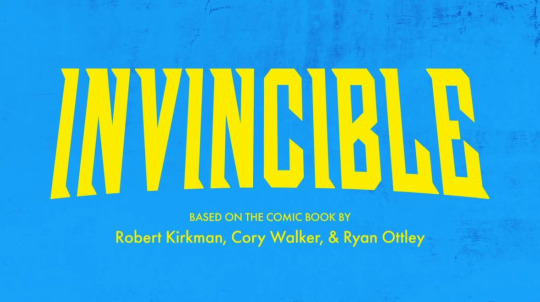
9 notes
·
View notes
Text
Spinels Character Analysis:
Now that the comic has caught up to this point I can go on a bit of a tangent here and rant about my logic behind Spinels progression through the first seven pages of the SU AU Gone Wrong comic.
Let's dive right in then, shall we?
Spinel’s Character Break Down and Emotional Complexity:
This is gonna be one hell of a long rant so putting Readmore here.
[This isn’t proofread so if there are grammar or spelling mistakes we’ll all have to live with them]
Spinel as a character is rather complex and predictably unpredictable in how she reacts to situations. In Pixar, they have a concept they like to refer to as the spine of the character. This is the basis of who they are and will drive all their decisions throughout the story. A prime example of this is Woody; his spine is to protect his kid and ultimately get back to him. This drives every one of Woody’s decisions. By being separated from Andy he feels that he will be hurt by his absence and as such seeks out a solution to this dilemma. As a whole, Spinel’s spine, so to speak, is rooted in her insecurity; more specifically her insecurity around rejection. It’s part of what made her so appealing to the fanbase and also to the viewers of the film. It almost seemingly justifies her murderous intent and ability to cause such havoc and devastation.
When looking at the concept of insecurity and abandonment you’ll find articles referring to child abandonment syndromes. TMI moment; but I was abandoned by my genetic parents and have an unfortunately extensive understanding of the sensations revolving around this kind of trauma. Spinel in many ways was a child for Pink, she was a playmate. This doesn’t imply that she had any maternal connection to Spinel but if you compare her situation to that of a child dealing with this kind of neglect it aligns very similarly. Spinel did not choose to be made, she was born into Pink’s service and felt that was her world. She revolved around Pink and was there to please her whims. She was immature yes, but so is a child.
In an article by Lynne Namka titled, “The Many Causes of Feelings of Insecurity and Abandonment,” she analyzes the impacts and results of this kind of abandonment.
“Some abandonment issues can be related to physical security and fears of survival of the physical body. Rejected children can fear annihilation if their emotional and physical needs are not met. The external rejection and lack of love are internalized by the child along with beliefs of being unworthy, undeserving and unlovable. These children can grow up to become jealous and insecure in their relationships.”
Everyone at some point in their lives has felt tossed aside or dejected by society or others and this drives home further that feeling of connection to this character. It as a rather smart choice for the Crewneverse to go ahead with such a character archetype considering the themes of forgiveness and friendship in Steven Universe.
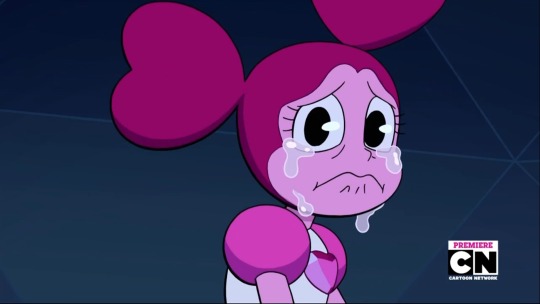
The problem with a character that is based so heavily around the concept of rejection is their reactions upon being confronted by it. We see this demonstrated in the film through each of Spinel’s actions. This sensation of being left behind is strong enough that even while dealing with amnesia and being rejuvenated to an earlier state the emotional trauma still rears its ugly head in the form of aggression.
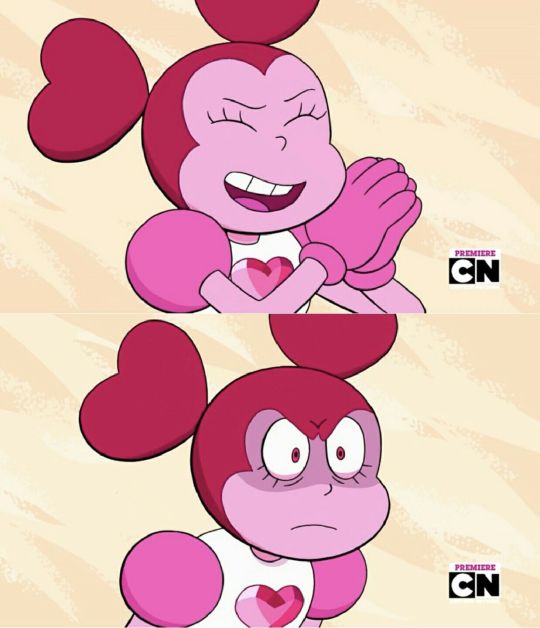
youtube
Upon arriving at Earth in the film Spinel proclaims that she is there to kill Steven Universe and even continues to state in the concluding scene that:
“You know I came here to take my anger out on a bunch of strangers, but now that I know you... I want to kill you even more.”
This again coincides with the concept of Abandonment Rage. To quote another article of the same name from Lynne Namka:
“Blind rage often comes out of the anxiety and terror of being left behind. Domestic violence expert Donald Dutton defines abandonment rage by saying, “Rage often comes after fears of feeling abandoned and helplessness. A child is made furiously angry by a parent’s threats to desert him but on the other hand, he does not express that anger in case it makes the parent actually do so….the anger of a parent becomes repressed and directed at someone else later on.” Repressed anger then becomes displaced or put on someone else after frustration builds up to a boiling-over point.”
This is the progression of Spinel’s character arch prior to reaching Steven. She has had this melting pot of anger boiling inside of her festering and mixing into a whirlwind of hate and repressed frustrations. Spinel is experiencing a catathymic crisis, a term coined by the Forensic Psychologist J. Ried Meloy. To put it simply, its where the individual's anger becomes a catharsis for feelings of vulnerability. Its a moment of disconnect from one’s logic and instead allows their actions to be driven by this anger lacking any logical perceptions or thought behind it.
Webster's definition is as such: an unexpected explosive outburst of impulsive often destructive behavior understandable only in terms of unconscious motivation
So now that we know where her head was at before confronting Steven, what happened after she killed him?
The Impact of Steven’s Death:
Spinel’s actions with the rejuvenator are rash, fast, and not well thought out. There’s been a few great analysis on Tumblr that follow this line of thought.
As a whole, Spinel is playing with the Crystal Gems but her aim is true with her weapon. When she strikes down Amethyst, Garnet, and Pearl its with a single slash straight through the middle, it's effective. What better place could you aim to cause immediate results? On the slim, and probably impossible but work with me here, chance that it didn’t work immediately or at the very least didn’t poof them, there’s no walking away from that impact. It effectively disrupts their physical form and forces them to retreat into their gems.
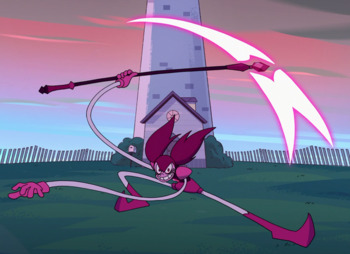
The intention of the injuries inflicted on Steven follows this same kind of logic. Spinel was attempting to cause as much damage as possible as quickly as possible.
Steven Universe is Pink Diamond, she knows this, or at least he has what’s left of her. Diamonds are difficult to kill as we learned during Steven’s trial.
youtube
So why was she trying?
In my opinion, it was because she was attempting to remove the obstacles that were in her way to being Pink’s friend. She was envious. Under all the hurt and misdirected anger, she still feels abandonment. While it may enrage her she still longs to be accepted and craves that solace of belonging again. Pink Diamond was her world, she was all she had, that absence has left a void that little can fill. We ultimately see this envy and desire manifest in the climax of the film as she fights Steven and ultimately crumbles under her own emotional state before the injector combusts.
youtube
After removing the obstacles that are the other gems she turns her focus upon Steven. The rejuvenator would revert him back to a prior state. If it brought Pink back, great she’d have the source of her anger. If it reverted his powers and Pink was really gone? Fine, she’d be done with him soon enough. It wasn’t a logical decision, it was an emotionally driven and rash conclusion of her abandonment.
When she attack’s Steven her first blow takes off Steven’s arm. I wanted this to stand out to the viewer upon their viewing of the comic. It's drastic, impactful and leaves one unsettled by the sensation of having some ripped violently from their person. The arm is in many ways if you look between the lines, an analogy of P!Steven’s situation. He has been lopped off what made him whole and is only half of a person in his current manifestation. There is no way to efficiently reattach that limb with the flesh expiring in his arms.
The second of her attacks follow suit almost immediately following the amputation of Steven’s arm. She attempts to recreate the action she did with the Crystal Gems and cut him in half. Again, this being an efficient and fast way to destabilize him and poof the gem. However, Steven is half-human. So worked up by her own feelings of entitlement to the violence and grief Spinel is blind to the blood that flies from his injuries and only realizes what has happened once she can no longer swing wildly. The second blow ultimately was the fatal one while also what forces his gem out of his body. Amputates his gem, if you will.
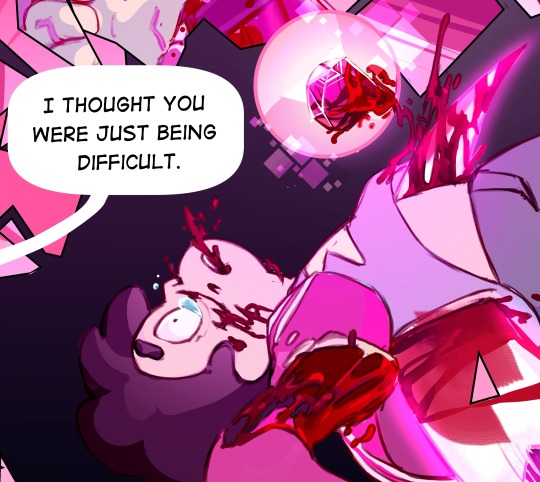
Unshown in the comic is Spinel realizing something isn’t right however it was actually the first image I did for this AU shown here:
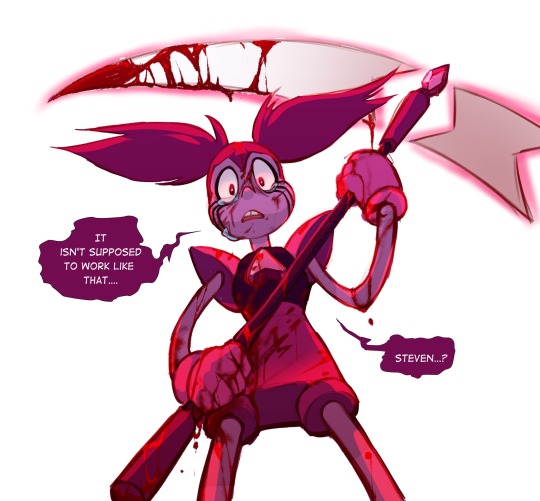
The rejuvenator becomes stuck within Steven’s torso, it doesn’t go all the way through him. This isn’t normal and gives Spinel’s mind enough time for her actions is starting to sink into her. With this comprehension comes with it the confusion of what she is seeing.

[-credit @thelostmoongazer for this illustration.]
Spinel has never met a human. Spinel has never been to Earth. Spinel has no concept of what an organic is asides from the small critters from the garden she presumably spent her entire life within. She has been isolated, abandoned, and now she’s thrust into the world blinded with rage that has left her unable to perceive the vulnerabilities of the individual she is facing.
In this instance Spinel panics and throws her weapon aside alarmed by the strange liquid she now finds her body splattered with. She attempts to distance herself from the collapsing Steven, the atrocity she has just committed, and the expanding substance that gushed from his body's fractures.
Gem’s poof, that is our understanding of their forms being disrupted. The Crystal Gem’s had poofed, Steven, however, Steven hadn’t.
This is when Pink appears:
As a direct result of her attack upon Steven, P!Steven is given space and room to reform himself. This immediately puts Spinel in the position of not only feeling confusion and shock of the situation she’d put herself into as her temper begins to subside and she watches the pink glow overtake the field they stood within.
There is a sensation, we’ve all felt it before, its the same one you feel when you get caught with your hand in the cookie jar by your parents. It isn't that she regretted her actions, its that she regretted being caught.
Not only right after it dawns on her that something is wrong but, as she assumes, the very person she’d been driven to this near insanity by.

She reverts a bit here, tries to resolve some of the issues with the newly reformed Pink. She tries to connect with them and apologize for what they were seeing, for what she had done. Underneath her resentment, she doesn't want to be hated by Pink, asides from that she is almost uncertain what she desires. All she knows in this situation is that things have not happened as they should have and now she has been caught.
It’s when P!Steven speaks to her however that a switch gets flicked. As I explained earlier in the post, Spinel fits rather well within the box of abandonment rage. She is a character-based within insecurity that reacts with aggression when she feels threatened as a way of protecting herself.
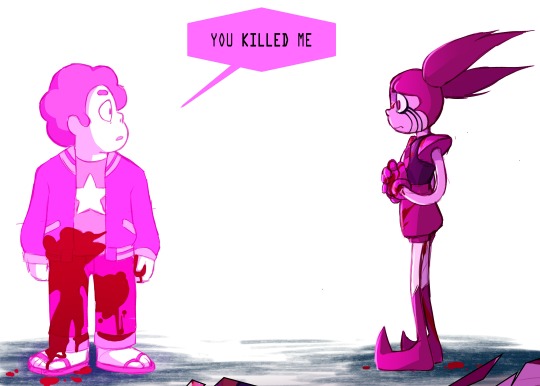
In these few short panels, P!Steven not only displays disapproval of her, but his change instance implies aggression immediately making her revert to a more defensive state.
This is what causes her change in tone and ultimately the change in her behavior. She is no longer remorseful because she was caught, she’s being rejected again, by the same gem again.

Adding a cherry on top, upon realizing that it wasn’t even who she perceived to be she feels tricked and made a fool of. Somehow, he wasn’t Pink. He hadn’t reverted into his beginning state, no, that pest that kept her from obtaining what she selfishly desired was still present. Her resentment for that craving boils back into her insecurities and feeds the explosive desires beneath it. Rather than apologizing further she takes hold of these emotional shelters and dives into what she feels the most comfortable with, her anger.
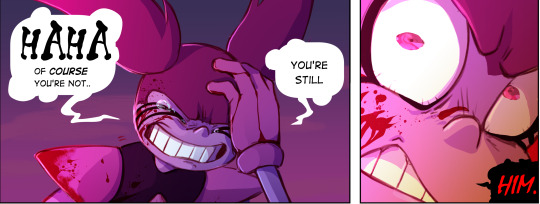
Which brings us to today’s page, where we see that beginning to be acted upon. Surely she can fix this, at the very least resolve that judgmental stare that lingers on her. She can make things better for herself.
She won’t let herself be rejected again.
Thanks for coming to my TEDtalk.
Sources:
[Insecurity and Abandonment] [Abandonment Rage] [catathymic definition]
[SU AU Gone Wrong Comic Master Post]
#SU AU Gone Wrong#SU Gone Wrong#Steven Universe#character analysis#Spinel Character Break down#steven universe the movie#Spud speaks#long post#Spinel Abandonment#Trigger warning#TW: Character death#Tw: blood#Tw: stabbing#SU AU Gone Wrong Comic Analysis
2K notes
·
View notes
Text
“The Job” - Deep Dive *Prodigal Son Spoilers*

First, I'm not at all surprised that Martin leveraged his 'statement' for more time with Malcolm. I found their in-person conversation interesting because Martin says that Vijay has moved on...and he asks Malcolm...why can't he? I found this a little bit out of character. Martin shouldn't want Malcolm to move on because he would lose his manipulative hold if he did. It seems as though he does want his son to make friends and have normal relationships...but why? As a sociopath, Martin would want Malcolm’s fractured attempts at normalcy to remain the same so that he and he alone can dominate Malcolm's sphere of influence and maintain a stronger hold on him.
I also found it interesting that Martin was called a psychopath and admitted as much to Jessica, saying that he could turn on and off his ability to care. In ep. 1, the FBI called Martin a psychopath and Malcolm (rather heatedly) pointed out that he was a “predatory sociopath.” Even after Malcolm thwacks his head and his concrete addled brain conjures up Martin…his ‘hallucination’ echoes Mal’s own concerns that he too is a “killer, murderer, psycho.”
He analyzes the scene, through the lens of his father. In his 'hallucination,' the chair that he's tied to is gone, but he remains on the floor. From a metaphorical standpoint, his position is a subservient one of vulnerability. Martin stands, walks the scene. Malcolm tries to distance himself from what he’s done, saying he didn’t kill anybody and Martin points out his “work of genius” in loading their minds. He admires Malcolm (i.e. Malcolm craves his father’s praise?) and informs him that he doesn’t need friends. Malcolm desperately craves that human interaction and intimacy though, which is why his guard was down when it came to Eve. He’s just afraid that he’s too similar to his father and also too damaged to maintain healthy friendships.
---Sidebar, Martin hates Gil...and twice during the episode, his boy and his wife stopped talking to him, to talk to Gil. Jessica used it as a dig. Malcolm used it as an escape. When Mal was kidnapped and Gil goes to see Martin…Whitly makes a very strong point to grit out that Malcolm is “HIS boy.” I think something is being set up here. The anger Martin has towards Gil is growing. After Jessica says she should call Gil and hangs up, Martin closes his eyes, breaths, and mentions that she just ‘turned the dagger.’ (so he does have feelings!)---
Anyway! Can we blame Malcolm for his doubts about having normal relationships? No! Especially not after nearly stabbing Eve due to his night terrors. The irony that she is – in fact – out for her own agenda is spectacular. We all know that finding out she is…less than above board…will wreak havoc on poor Malcolm. (But viewers like the whump associated with Malcolm) So who is Eve? The daughter of the slain woman or another victim? A relative? She’s too young to be a victim. But clearly, she has some serious neurosis if she was willing to fabricate this false relationship, including sleeping with Malcolm, just to make headway for her own gain.
And poor Malcolm…we see in previews that he confides in Martin about having doubts about Eve. Martin is fast becoming his sounding board, his anchor point. When he brings up his friendship with Vijay, Martin recalls their falling out, which surprises Malcolm. Apparently, Malcolm was pretty open with his father in their visits before he stopped coming.
So, who was Vijay to Malcolm? Clearly there’s an air of superiority there. He almost acts like a bully, the way he jabs at him and wipes his finger on his jacket. He even refuses to call him Bright, brushing past him as he again calls him Whitly. This dynamic gets the viewer thinking about Malcolm’s (undoubtedly sad) childhood. And it again brings up Malcolm’s trust issues. His friend Vijay abandoned him once his father got out and he regained a ‘normal’ status. Malcolm never had that luxury. Did this falling out leave him friendless altogether?
---Sidebar, how Jessica ‘handles’ her son’s loneliness is cringeworthy. Grabbing the phone and forcing Malcolm to talk to Eve? NO. Just moments before, Jessica admitted to being manipulative, and she is. She even disowned her son at the wedding party when the woman next to her asked if she knew “who that man” was. Her actions towards Malcolm, in my eyes, are even more unacceptable than Martin’s manipulation. (At least he’s open about it) Martin’s reason for calling Jess in the first place was to see if she had manipulated Malcolm into not answering his calls. It’s notable that Martin becomes worried about Malcolm, and Jess asks if he just turned his feelings back on. I think though, that Malcolm is the only one who Martin genuinely does worry about, genuinely does have affection for, other than himself. He ‘missed out’ on a lot of years of parenting. The worrying was probably too much while Mal was a kid and in the decade hiatus that Mal took from him, so he likely turned it off. Now, that worry is back with a vengeance. ---
Anywho…Vijay openly lies to Malcolm about making a deal. Still, in a way, it’s like Malcolm feels he has to ‘prove’ himself and his worth to Vijay by saving the day. Only when things go his way are they the “Corner Table Boys” again. Even after Mal and Vijay were successful, their “buddy” moment at the end was still forced and awkward. (One ‘nice’ thing about Mal’s ‘relationship’ with Martin is that he knows he never has to prove his worth to Martin and Martin isn’t going anywhere. So as toxic as it is, it's more 'stable' than whatever he has with Vijay)
Malcolm is interesting because when he’s left alone in his head, his anxiety spirals out of control. Yet, he’s quick to put himself in life threatening situations – seemingly without anxiety. Is it because he feels he has to prove his worth to his team? Is it because it gives him a rush and makes him feel alive? Is it punishment for all his father has done, or a way to make up for his father’s trail of destruction? Or is it a distraction from the darkness he knows lives within him?
Whatever it is, I bet his reckless behavior will intensify post Eve.
(I’m waiting for an ep where Malcolm does actually have to pull the trigger – maybe in self-defense – and how his broken psyche will deal with actually killing someone. He seems ready to fall into the abyss of moral ambiguity, but his team is what keeps him grounded on just this side of right...and Martin seems to be pushing him in the other direction. That's a lot of cognitive dissonance to deal with. (Blackmailing that brain surgeon to get what he wanted was definitely a touch of evil - it seems he knows how much to use his own manipulative streak and when). So...how much pushing would it take to break Malcolm?)
Final thought: can Martin really extort Malcolm and Jessica with his statement? If his recollection clashed with Mal's and Jess's who would the cops believe? Certainly not him. I partly believe Malcolm is going along with the terms b/c he cares about his mother, but it's also an excuse to visit Martin that is 'out of his hands' ... so he doesn't have to feel guilty about seeing Martin.
#prodigal son#pson#martin whitly#malcolm bright#jessica whitly#tom payne#gil arroyo#pson spoilers#prodigal son spoilers#spoilers#long post
34 notes
·
View notes
Text
Elektra: Assassin review
When I see a book fully illustrated by Bill Sienkiewicz, I don’t need an excuse to be biased. If you’ve seen his images, you have to be at least curious to know how he tells a story. Elektra is arguably the best way to feed this curiosity because words and art indeed complement each other, so the story flows.

What is this book about?
With Elektra: Assassin you get a stand-alone tale set in Marvel Universe, but you can easily brush aside everything else. It’s a solo story and has its own set of characters who may or may not come up later.
I’ve seen it being called a satire, and in a way, it might be, but allow me to disagree with that statement. This one is bitterly ironic and painfully relevant for those who are willing to look past the superpowered/spy fence.
How to read it
I normally don’t even attempt to recommend any methods to improve the reader’s perception, but this is a special case. To properly absorb it, it’s best to turn off all the overthinking. With the critical mindset that many of us have developed, it’s easy to get lost in your own conclusions, while this particular style of storytelling requires a more emotional approach. Read it as you listen to music (that’s if you aren’t analyzing the how of it), read it as you look at a painting (when you aren’t making your way through the what of it).
Elektra is told in a unique way, it takes stream of consciousness, and pairs it with mind pictures. They’re not what you want to see, they are what a character feels. I believe this is why presidential candidate Ken Wind (not like a watch, but like the air), has the same tv smile every time he shows up on a panel. And this is why so many characters (Garrett, Perry, the acting President) are rather caricaturistic.

The words, well, those can indeed seem chaotic. Only a few speech bubbles interrupt what is a full-on thought process. It’s something that I love about 80s comics: they gave much more space for thoughts, which made you relate to whoever’s story you were reading. And in this case, it’s pretty much how the story moves forward. Even the action parts are driven mostly by the speed of thought.
Characters
Now we know Elektra pretty damn well. In fact, we know several versions of her, and she is not just a mysterious weapon of HAND anymore. But this story makes us know her in a different light, it actually gives you glimpses of her mind, her past, and her instincts. Just glimpses though, because the narrative gracefully moves from her to Garrett, a special agent whom she chooses as her accomplice. Not to reveal too much (the plot gets quite exciting), but Frank Miller’s writing takes an impressive turn while showing a struggle of a possessed mind. It feels like reading a full-on book without having to imagine anything.
The characters seem intentionally flat. That’s when the satire part comes into play, but don’t get mistaken, it’s done professionally, and works surprisingly well within the context.
Art
To me, the driving force of this book is its imagery. The art works with or without the words, it tells the sings the same song but in a different manner. To put things simpler, you can just look at the illustrations, and consume the story just as well as if you follow the textual part. Art here is self-sufficient, emotional, and it has its own layers of depth. Just take a look at different styles incorporated into any given panel.

That’s the sense I get when I look at how every page works. Illustrations show what a character feels or what a reader is supposed to feel. Bill Sienkiewicz is a master of creating stories with his works, and there’s not much to add here.
Who would like it
To enjoy this particular run, which probably falls under the definition of a graphic novel, you have to first release your expectation of what a comic book should be. If you can do it, you can fully dive into this artistic trip, and enjoy every part of it. It’s chaotic because it has to be. At the same time Elektra: Assassin is a perfect combo of stylish writing and exceptional art.
#elektra: assassin#elektra#elektra natchios#frank miller#bill sienkiewicz#marvel#marvel comics#marvel review#comics reviews#review#marvel community#earth-616
12 notes
·
View notes
Text
Octopath Traveler Combat Review
Hello whoever’s reading this, I’m here to talk about Octopath Traveler’s combat system, and how it sucks. Now you might be wondering, why am I writing about this now, isn’t that game kind of old at this point? Yes, it is, but I only “finished” playing recently since I was working off of a borrowed copy and it’s more the level of disappointment I felt while playing it has stuck with me much more than many other games I’ve played. Since I want to go into game design and development, I thought that it would be good practice to do a deep dive on game mechanics, and it’s easier to write about something that I have strong feelings about to start with. While I have many issues with Octopath, the combat system is what the player is dealing with the most (which in itself is an issue), so the fact that it was lackluster dropped the enjoyability of the game more than if it were better balanced with story and exploration. I’ll try to hit everything that I had a gripe with, from minor things I personally would want changed, to what I view as major flaws that lower the enjoyment for everyone. I will be talking about the post-game boss, because a lot of my issues come into focus during it, so spoiler warning.
For reference, I’ll be talking about the game the way I played it, so I’ll give my main character loadouts in relation to the final boss. Team 1: Hunter Therion, Cleric Alfyn, Sorceror Cyrus, and Thief Olberic; Team 2: Warlord H’annit, Scholar Ophelia, Apothecary Primrose, and Runelord Tressa.
Now the big overarching problem with this game is its simplicity. Making a game simple can be a good thing, and definitely makes it more accessible, but there are a plethora of sub issues that I will be going into throughout this caused by how oversimplified many systems are in this game. For starters there is the lack of skill diversity, as in, there just isn’t very much that characters and enemies do over the course of the game. The offensive skills have 12 possible damage types, 6 weapons (Phys) and 6 elemental (Elem) and there’s only really 4 different ways these are implemented: single hit, multi hit, wide (hits all enemies) hit, and wide multi hit. Multi hits are generally just better due to the break system and damage limits, and wide hits are better the more enemies there are. Those of you good with numbers might have already multiplied those to get 48 ways of hitting an enemy, and I’ll add two, since the Merchant has an single hit untyped skill and the Starseer has a wide untyped skill, for a grand total of 50 that I can remember. Looking at that number I actually don’t know if that looks like a lot for somebody who hasn’t played the game, but the damage types only really matter in the break mechanic of the game and which stat is used for calculating damage. No particular type of damage is better for damage or accuracy skill wise, and the elem skills will do the exact same thing no matter which element is used since they’re only based on the user’s Mag stat. Phys attacks are a bit different since each one is affected by the weapon the user has equipped for that type, but they’re generally all +Str and then +Mag / +Acc / +Crit / +Spd / +Eva. Some Phys skills also have side effects that help differentiate between them, but the basic attacks are the same when the weapons are similar.
Since I brought it up, let’s talk about the two main mechanics of combat that this game has, the break and boost systems. Overall, these systems are pretty good on their own, and most of my issues are rather small here. First up is the break system: hit the opponent with their weaknesses a number of times, and they lose any remaining moves they have this turn, any they would take on the next turn, and all attacks against them deal more damage, though on the turn after the next, they are guaranteed to move first. This is where most of the fun of the game is, figuring out the enemy’s weaknesses, as they are hidden when you first encounter an enemy, only revealed when the weakness is hit, or with the Analyze skill, and then timing the breaks to be the most beneficial to your team. Many enemies belonged to groups with similar weaknesses, so it’s interesting to learn like winged creatures are generally weak to wind and / or spear attacks. The main problem I have with the break system is that once an enemy is broken, all damage types have the same effectiveness. Before being broken, an enemy that is weak to fire will take extra damage than if it’s hit with an ice attack, but while broken these attacks will do the same damage. Any accuracy bonuses don’t matter, since you can’t miss an attack on a broken enemy and speed bonuses only really matter if the order in which skills are cast is important, which there are some cases, usually with buffing allies. Then a bit smaller is how the weakness bar is always ordered, so some damage types are more useful to figure out all of the weaknesses. For example, if a weakness to staves is the leftmost weakness to be found, the player knows that there are no other physical weaknesses and to just start trying elemental ones. There were also some interesting extra mechanics that were only used a few times, such as shuffling weaknesses after a break, or, one mechanic used exactly once in phase 1 of the final boss, rotating through weaknesses when being attacked.
Then we get to the boost system, which complements the break system very well, with only minor annoyances. It makes the player decide between spending power against an unbroken opponent to break them faster, save up to deal massive damage to an opponent once they break, or how frequently turns need to be spent to cast buffs or debuffs. One issue that I have here is that magic users get the short end of the stick again, as basic attacks are the only moves (besides Bewildering Dance, the RNG move) that boosting will cause more instances of the move to occur. Boosting three times on somebody that will basic attack an enemy can cause them to lose 4 shields, while doing the same on a fire skill will just cause it to do more damage, which is objectively better to do when the enemy is broken. This usually isn’t an issue, as the BP can be spent on status effects and healing which will always be helpful, so besides Cyrus (laugh at him, he’s a nerd) there’s always something to spend BP on, thought your personal playstyle might dictate otherwise. Something that’s more personally annoying is how the limit is 5 BP max per character, since the most you can use is 3 per turn. What would be really nice and satisfying would be to break an opponent, have everybody spend 3 BP for full boosted whatever on the break turn, and then have everybody spend another 3 BP on fully boosted whatever else on the second break turn.
Next is another facet of the simple problem, is that there is significantly less character variability than the game wants you to think, and that’s not much in the first place. There are only 96 total skills for player characters, as there are 12 jobs with 8 skills each, and each character has their default job and may also equip a secondary job, letting each character go into battle with 16 skills, ignoring the path actions that grant others conditionally. The 8 base jobs can be simplified into 2 categories, DPS and Utility, 3 if you want to split the utilities into physical and elemental which I see as reasonable, or if you want to stretch it and split the 2 DPSs in the same way. I’ll stick with 3 since I can show how to best simplify them this way, watch. DPS: multiple damage type skills; Phys Utility: one weapon type set of skills, one single target elem skill, and a couple (de)buffs; Elem Utility: a single target elem skill, a wide elem skill, and a bunch of buffs. The advanced classes are even simpler, three of them being every attack type in either weapons or elements and then the remaining one being a bunch of buffs with one multi element skill so that every element had 5 related skills. I’m debating going into each individual job, but there are two that I will be getting into later for sure, Thief and Starseer, for opposite reasons.
Related to the lack of damage types and skills, is a lack of feeling of progression throughout the game. You gain access to 66% of the skills you will ever have by the end of the first quarter of the game, and the last 33% you won’t get until about the last quarter of the game. While the beginning of the a game it makes sense to give the players a bunch of tools rapidly, especially given the whole theme of versatility of the 8 different starting characters the game is based around, skills just scale up with the player’s stats, given through levels and equipment, otherwise they stay the same. While the middle half of the game can be used to mix and match secondary jobs on characters, it’s all just variations on the familiar. While this lack of progression just makes the game a bit boring until you start finding the advanced jobs, the actual issue is how SP scales through the game. The game ends up getting significantly easier as you progress further into the game since the SP costs become a smaller percentage of each character’s SP pools, and most forms of SP regeneration are percentage based, so characters get back SP easier too. For example, I had Ophelia with Second Wind (which I will get to in detail later) and a bunch of SP equipment, which by mid-game meant she could cast most spells and heal back more SP than they cost, and late-game everything was free outside of revive, which took two turns to fully heal. This is contrast to the beginning of the game, where a single skill cast could deplete a character’s entire SP pool, especially the physical jobs, as they usually came with smaller SP pools in the first place.
But where the runaway scaling is the worst, is actually on the thief job. Thief is a physical utility class, so it comes with dagger skills, the mandatory single hit fire skill, phys str and def debuffs, and some slightly more interesting abilities that falloff as the game goes on and you don’t need items or SP as much. All three dagger skills have special qualities, the divine skill uses the characters spd in the damage calculation, but HP Thief and Steal SP are the really broken ones. They both function the same way, hit twice with the dagger, then recover some percentage of the damage dealt to the stat in the name, 50% to HP or 5% to SP. The cost is also the same for each, 6 SP. There seemed to be a bit of a decrease in accuracy for each compared to just basic attacking with a dagger, so early on it was a bit of a risk to use it on enemies, especially if they were unbroken and not weak to daggers, as you would be losing SP to gain 30 health, or getting two dagger hits without boosting. But then, once the total damage of both hits reached 120, or even if you wanted to be safer, the damage of either hit, you start having a move that is free to use and hits more times than a basic attack without using BP, while also being able to heal yourself in a pinch. Now, the max damage you can deal in one hit without the Surpassing Power is 9,999, and you can very clearly see that a thief becomes an invincible slaughterer, as one can either heal themself for 9,999 HP, which is the max, or 999 SP, which is also the max, per turn. Now this might take a bit of set up, such as decreasing the enemy’s physical defense, which I remember mentioning is an ability that the thief job has, or increasing the thief’s physical strength, and there are a few ways to do that, but what I’m saying is it’s pretty much just all lined up for you to do way too easily with next to no drawbacks.
I’ve mentioned two support skills by now, so I should probably talk about them and the issues that they have. There’s 4 for every job, so 48 total, and each character has 4 slots that they can have support skills assigned to with no job related restrictions. This theoretically is about 200000 combinations, but since many support skills don’t synergize well with either the other ones or with the character or just are worse than others, there’s actually a lot less. The first way the options are culled are through support skills that are basically required. First on that list of required ones is that everybody needs Saving Grace, full stop. It changes the equipped character’s max HP from what is listed to 9,999, though if their HP is above their listed max, they can’t be healed any further until they have returned to a normal HP level. This gets very important for many late game bosses, and I feel like every paragraph is opening another two or more topics to go to, as most character’s 2k~3k isn’t enough. After that is some form of SP assistance, as the support skills are the ones with all the fancy %SP recovery. There’s 4 options to choose from: % max heal, heal % basic attack damage done, halve all SP costs, and heal % damage taken. Your magic casters will generally get the % max heal, since they have large mana pools to take advantage of that, and your DPSs will have the basic damage one, with much smaller mana pools and higher physical attack damage. Anyone with the Thief class can skip this, since as I’ve said, they will never run out of mana anyways. The % damage taken isn’t particularly useful as it’s such a small percentage and much less reliable than the others given it’s based on the enemy’s actions and targeting rather than yours. The Halve SP costs skill is situational, as some classes have higher SP costs, but losing the ability to actually regenerate SP makes the longer (and usually harder) fights more dangerous as you still run the risk of running out of mana. I used it on Tressa, since I played her as a caster and her mana pool is a bit lower than the other main casters, plus her Rest ability allows her to regain SP on her own. Third is either of the stat buff skills, once again the choice is based on how the character will be dealing damage. There’s Physical Prowess for Phys attack and defense or Elemental Edge for Elem attack and defense, and instead of being a stat boost like other similar skills from base jobs is that they permanently grant the combat buff to those stats, which means you don’t need to spend time casting the skills that do that AND that they can’t be dispelled by the enemy. What you do with the last slot (or two for thieves) is more open and is going to be where you can have ideas about different builds.
For me though, that last slot went to Surpassing Power on most characters, because by late game, most of my characters were hitting the damage limit pretty easily. Now the damage limit is just the fact that no single attack can deal more than 9,999 damage, because the developers said so. The support skill Surpassing Power, similar to Saving Grace, ignores that, and instead makes the max 99,999, though have fun trying to reach that before your character’s stats max out. Octopath unfortunately has a lot of these kind of arbitrary limits which only seem to exist to highlight an ability that can get around it, like purple treasure chests and Therion’s job ability. By the time I got to the post game boss 5 of my characters were consistently hitting the damage limit, and due to the sometimes absurd amounts of health that opponents had, Surpassing Power just made most of those fights so much faster.
Now a bit of time talking about enemies, because the difficulty scaling of the game is pretty boring, once again due to how simple the game is. This is really an issue among a lot of this type of RPG, since the game is just a numbers game and bigger numbers = harder fights. There’s two points specifically that make Octopath particularly bad with this, the lack of weaknesses on player characters, and enemy health. Since the player characters don’t have any weaknesses like enemies do, you really don’t have to pay attention to what specifically the opponent is doing, at most you can pay attention to whether you are taking physical or elemental damage, but the types are completely irrelevant. There’s a slight exception since there are accessories that reduce specific types of elemental damage, but as far as I could tell it was just better to use accessories that gave stat bonuses. Some enemies had abilities that could inflict status ailments, or had secondary abilities similar to player skills, but they were so few and far between that once again it doesn’t really contribute much. The other issue is with enemy’s health, in that they generally have way too much and causes the game to become so much slower. Fighting basic enemies is almost never a danger to your team assuming you are properly equipped, but the fights can still drag on for 5~10 minutes just whittling down their health. This even applies to fighting enemies that are much lower level than your own team, mostly due to the defensive bonuses that an enemy that hasn’t been broken has. This culminates to a final boss with about 700,000 HP, ignoring all the summons that it has and that it can’t take damage while the summons exist. Again remember that the maximum damage per hit is 9,999 in most cases and 99,999 in the other (which I’ve never gotten close to even with max offensive stats). Then also add in that you probably won’t be anywhere near that first max damage unless the boss is broken too, and you can see why the fights just take so long.
Ok, time to talk about the other job that particularly stood out to me, the Starseer. It’s a healing support job mostly focused around manipulating the party’s BP. Or at least the good skills it has are focused around BP. The divine skill is a wide untyped elemental attack dealing damage based around the whole team’s BP stock, and one of its utility skills also increases damage when the user uses BP, which you have to for divine skills. Another skill it has increases the BP gain of an ally to two per turn, rather than one. Unfortunately we’re already starting to get into the ok skill territory, as due to the way BP is gained, it is only useful for about half of the duration. After a character uses BP, they don’t gain any for the next turn, and since the max is 5 BP, there can only ever be two turns in a row where you benefit from this, and depending on support skills, the maximum benefit a character can get from this ability is an additional 4 – 6 BP. Now there is a Merchant skill that can give another character 4 BP instantly for the exact same cost. The rest of the skills range from decent but situational to worse versions of other job skills, and remember, Starseer is a secret job, meaning you don’t start with access to it, all the abilities are relatively expensive, and you have to fight a boss to unlock it. Continuing to a decent but situational skill is one that can target either enemies or allies, and prevents all stat buffs from being able to be applied to an enemy or prevents all stat debuffs from being able to be applied to an ally. If you know the enemy is a type to be able to apply either, this can be helpful if you can time it properly. The other skills of the job are mostly more expensive and / or worse versions of skills that other jobs have. From dealing multiple types of damage (worse than just 1 in 95% of cases) to healing over time (enemy’s damage considerably outpaces the healing it provides) to a counter that doesn’t prevent the damage like its counterpart, pretty much every active skill they have is disappointing.
I ran out of steam on that last paragraph, and stopped writing this for about 3 months, so I’ll just get one last point in. There are actually a lot of mechanics in the game that are kind of complicated, but since this game is about oversimplification, much of the most important nuance that the game actually has is hidden from the player. There are a ton of little bits of information that would make decision making in the game so much easier, but because the game refuses to display them, there’s a lot of guesswork. In some cases, this hidden information is obfuscating mechanics that subvert player expectations, so what they thought was an easy decision should actually be harder. The following is a non-comprehensive list of some of the worst offenders of hiding information in my opinion. The stat nuts, which raise character stats permanently, give different amounts of their stat depending on which character eats it. Moves that hit a random amount of times ignore all bonuses and penalties to accuracy and evasion. Items that reduce damage or recover HP/SP don’t say by how much, or whether it is percentage or a flat number. Healing skills scale with the caster’s elemental defense. What makes these and similar mechanics the most annoying is that there are some skills that do list exact numbers or percentages for their effects, so it is inconsistent too.
I will end this now and hopefully I covered everything I meant to. A lot of this was thought up while mowing the lawn or laying in bed trying to get to sleep so if something was lost in the recesses of my mind that’s unfortunate. I hope whoever made it all the way down here enjoyed reading, or at least thought it was interesting, and feel free to reach out to me if you’d like to hear more.
4 notes
·
View notes
Text
Guide to writing Cassandra Cain
I’ve seen a lot of people in the Bat Family fandom say that they often minimize or exclude Cassandra from their works because they don’t know enough about her. While I HIGHLY recommend reading her Batgirl comic from 2000, I’ve compiled a guide to her personality, abilities, and relationships with other DC characters here for easy reference. (I’ve tried to be as comprehensive as possible, but I’ve probably forgotten something so please feel free to add onto this if you know the character well)
PERSONALITY
Cassandra has a difficult time with language, spoken or written. This generally manifests through her relying on body language and single-word sentences to get her point across. When she needs to speak, it is halting and awkward, but not broken. She will pause frequently, mumble, or use Malapropisms, but she is a perfectionist and is frustrated when she doesnt use perfect grammar or pronunciation. At times she will be unable to find the words for a particular thought. She usually is portrayed as being unable to read or write.
Cass sometimes uses mimicry when she has trouble putting words together herself, quoting films, tv shows, and plays.
Cassandra is compassionate above all else. She values life, and protecting it is her highest priority. She will not hesitate to put herself in danger to save others, and does not tolerate killing.
Cassandra has a strong guilt complex. Anyone who dies on her watch weighs heavily on her conscience, even if there was nothing she could’ve done to stop it. She does not let go of these “failures” easily.
Cassandra has little regard for societal norms and expectations. While generally caring and compassionate, she often comes across as rude due to spending most of her life either locked in a bunker or surviving in the wilderness. This includes poor table manners, a tendency to lurk in the shadows, and mirroring her adoptive father’s habit of coming and going without warning.
Cassandra has great pride in her physical prowess, but little in her moral character. Though she has a strong moral code and is quick to intervene when others break it, she does not see herself as above them and may even have more faith in them than in herself, as she still feels that she may not be able to rise above her upbringing. She can be rather arrogant about her superior agility and combat prowess, however.
Cassandra is fond of friendly jibes and snark, usually but not always expressed nonverbally. Her sense of humor is slightly unconventional, but usually good-natured.
Cassandra wears her heart on her sleeve. She is very emotional, and her past trauma can make her emotionally vulnerable, especially because of her lack of communicative skills. Her emotions show through her entire body, even when she doesn’t vocalize them.
Cassandra is quick to leap before looking, but excellent at adapting to unexpected situations. She is a poor planner and rather impulsive, with a rebellious streak that sometimes makes it hard for her to listen to instructions. However, she is great at thinking on her feet and analyzing her situation in the moment.
Cassandra does not do things in half measures. When she wants to learn something, such as reading or detective work, she is eager to dive into the deep end even if it’s not always the best way to approach it. As mentioned before she is also a perfectionist when it comes to herself, so this approach often leads to frustration.
Cassandra is very physically affectionate, with little mind for personal space. This often comes in the form of gently touching the face of someone she believes to be in pain.
Cassandra is extremely empathetic, to the point that it can be overwhelming for her at times. She is very good at spotting falsehoods, hidden pain, etc.
Despite this, she often misinterprets social cues. For instance, when Barbara and Dick were going through a rough patch in their relationship, she though Dick had intentionally done something to hurt Barbara, and threw him out a window.
ABILITIES
Cass is fast. Really, really fast. She can move incredibly quickly and quietly, making her very hard to track.
Cass has a shocking amount of strength for her small size. She has punched through 3-inch thick quartz glass, kicked down concrete walls, and thrown a metahuman more than twice her size without issue.
Her primary advantage comes from her ability to read body language and predict her opponents’ actions, allowing her to dodge bullets and outmaneuver pretty much any non powered opponent. This ability does not work on robots, animals, or sufficiently nonhuman aliens.
Cassandra is a contender for the world’s best martial artist, along with Lady Shiva and Richard Dragon. She can pick up new fighting styles nearly instantly, allowing her to learn and adapt techniques she’s never encountered before.
Cass is an incredible acrobat, though not as good as Nightwing.
Cass is able to control the amount of force she uses to the point that she doesn’t usually have to worry about killing even when using normally lethal techniques.
She is able to use pressure points to paralyze someone nearly instantly, though she has only shown the ability to use it on those who do not expect her to attack.
She can stop a person’s heart using a special technique, and in later appearances was able to do so without endangering the person for a good length of time, though they’d still die if not revived within that time period.
She is very good at analyzing her surroundings, which has helped her solve cases.
Cassandra is exceptional at dividing her attention and energy, able to coordinate herself to the point that government agents assumed she was a metahuman.
She is very good at the intimidation side of the job, able to terrify even trained killers.
RELATIONSHIPS
Cassandra is very close to Stephanie Brown, who was her first real friend. She can be a bit overprotective of her, even using violence to keep her out of fights that Cass thinks will be too much for her, though she has largely grown out of that and these days has a lot more faith in her. Cassandra is able to unwind with Stephanie in ways that she has trouble doing with around other people, even those she trusts like Barbara and Tim. When Stephanie seemingly died, Cassandra was deeply affected, becoming shorter-tempered and more violent.
Cassandra sees Barbara as the mother she never had, and values her insight. Though she often chafes at Barbara’s well-intentioned attempts to get her to see beyond her life as Batgirl, she still cares deeply for her.
Cass sees Bruce as somewhat of a father figure as well as a bit of an idol, and seeks his approval. When she believes that she has disappointed him, it can be devastating for her. However, she also recognizes his pain and trauma, and sympathizes strongly with it. Her admiration also doesn’t always mean she’ll do what he says.
While Cassandra and Dick don’t always get along (as mentioned earlier), she usually sees him as a mentor and big brother, and she is often more relaxed around him than most people.
Cass and Jason’s interactions have been largely confrontational, and it’s likely that further encounters would be similar, as she is strongly opposed to lethal force and would endeavor to stop him if she could. That said, she would almost certainly understand the pain he went through, and would try to get through to him with words as much as she is capable, rather than immediately resorting to violence.
Cass and Tim have a long and complicated history. While the two of them started off rather tense, with Tim being somewhat intimidated by her, they soon grew very close, and treat each other as siblings. Their strengths complement each other, and they are able to work in synch with each other very well. She has also been known to break into his house to steal food and take a shower.
Like Jason, Cass’s interactions with Damian are few and far between. Their first meeting didn’t end well, as Cassandra pulled him from a building when he was disarming a bomb despite his protests that he could handle it. While she found some of what he said hurtful, she didn’t seem to hold much of a grudge, and I think they could find common ground due to their similar backgrounds.
Cassandra and Duke seem to be friends, though beyond that little is known of their relationship.
Cassandra is close with Harper Row, and the two of them definitely care for one another despite the troubled history between them.
Cass and Jean-Paul Valley bonded quickly over their shared inexperience with society, and they are both very fond of one-another.
Cassandra is friends with Dinah Lance, who she has been shown to train with on occasion.
Cass does not get along with Helena Bertinelli for obvious reasons, and when they worked together during the Battle for the Cowl there was quite a bit of tension between them.
Cassandra had a close relationship with Basil Karlo/Clayface during the time that he had reformed, as she had faith in his ability to change. His apparent death devastated her.
Her relationship with her biological father is complicated. Though she has always despised what he does for a living, it took a long time for her to come to terms with how badly he treated her.
Cass’s relationship with her biological mother is even more complex. In most depictions, Cassandra respects Shiva in some ways, but is also troubled by all of the lives that she’s taken.
#cassandra cain#Bat Family#bat fam#batkids#batfam#DC comics#bat kids#batgirl#black bat#orphan#kasumi#cass cain#cassandra wayne#blackbat
1K notes
·
View notes